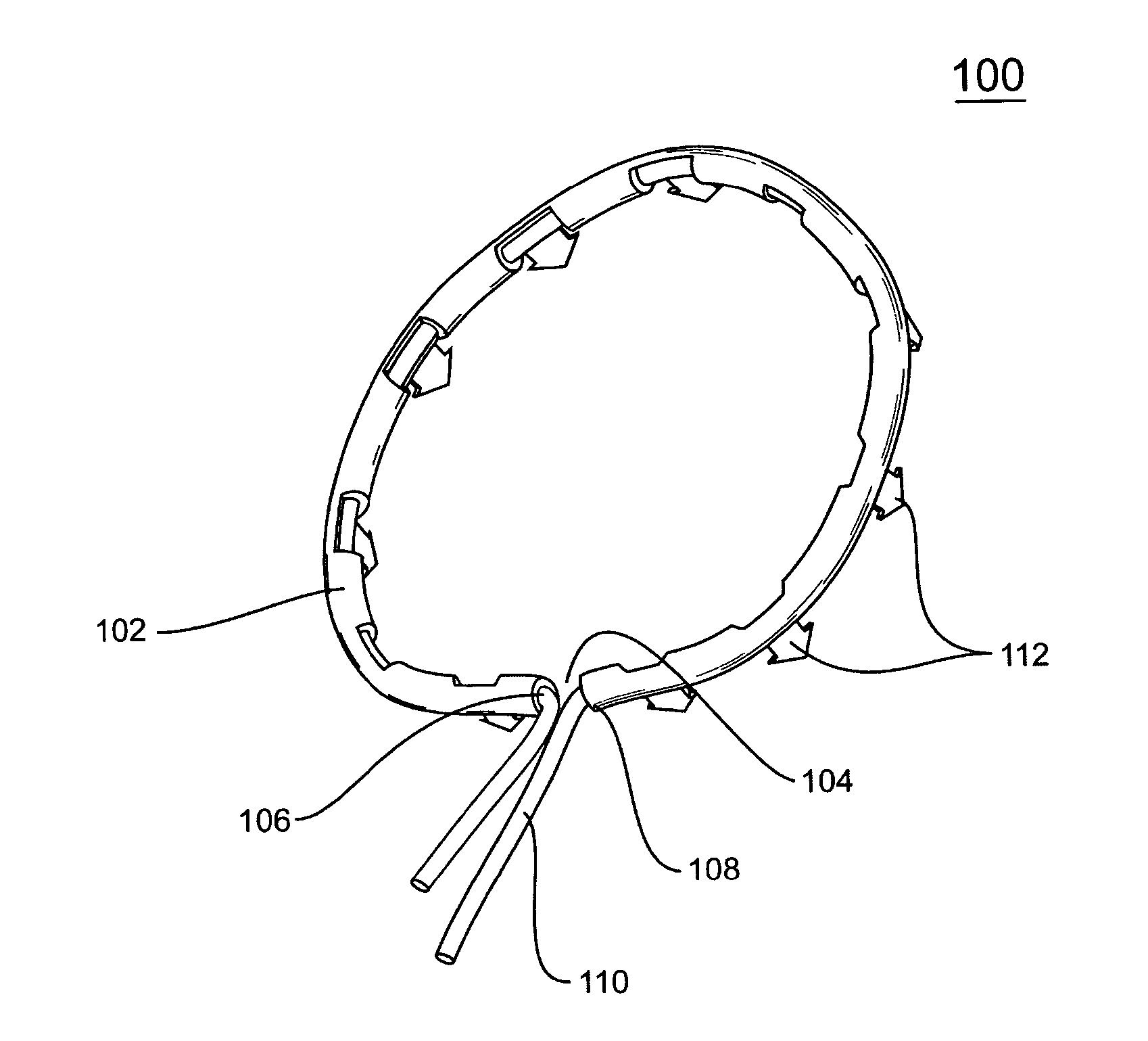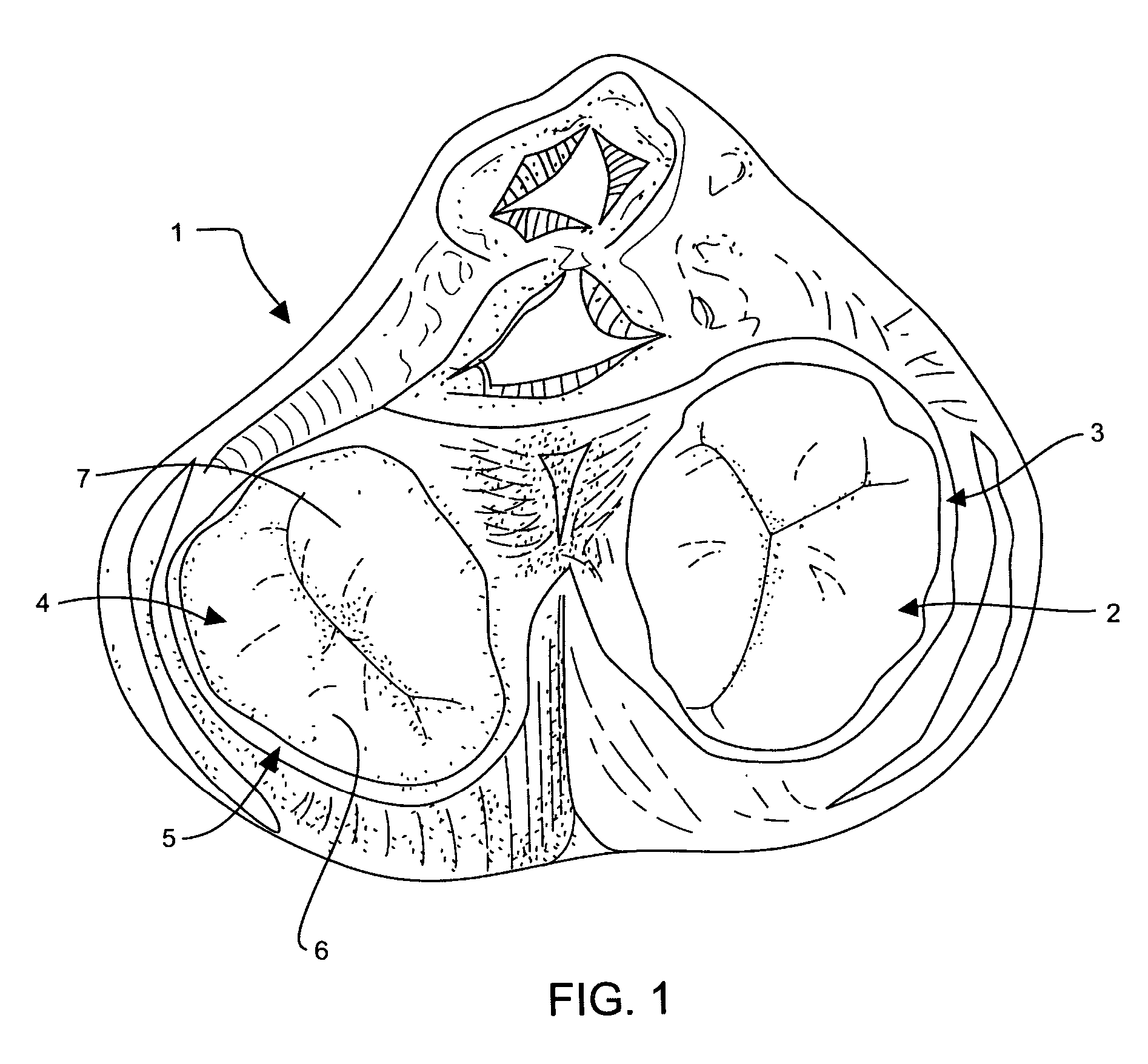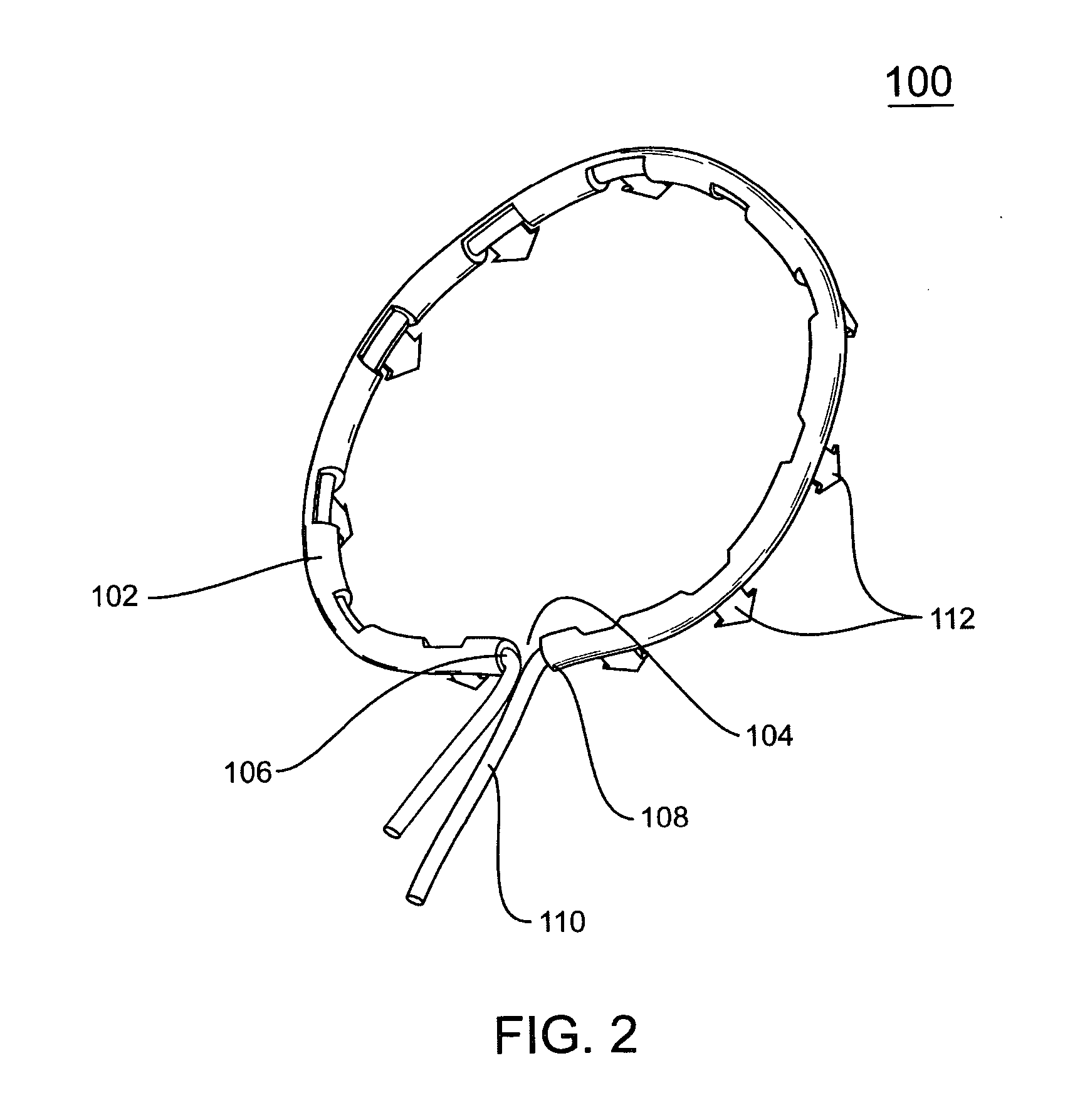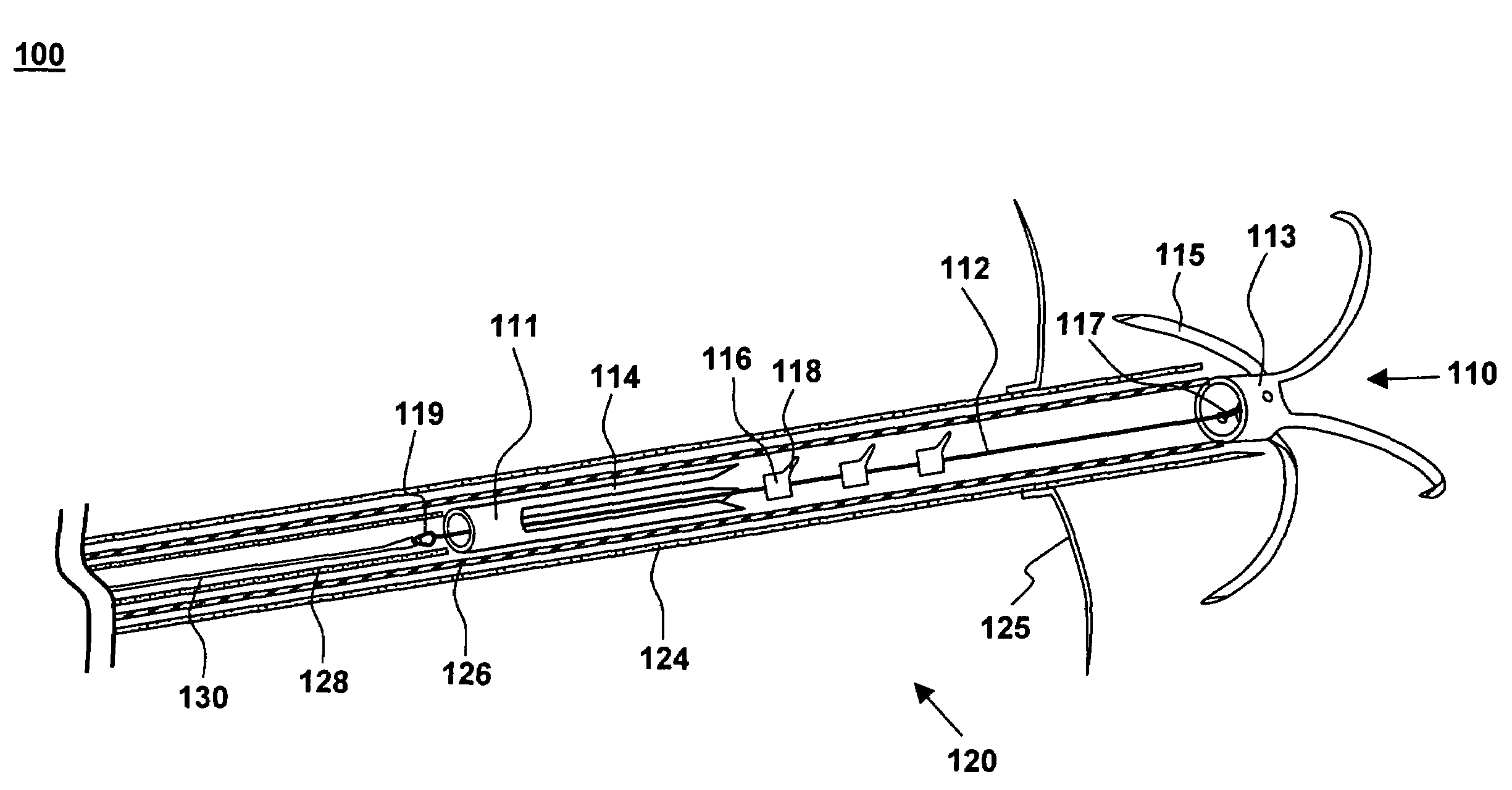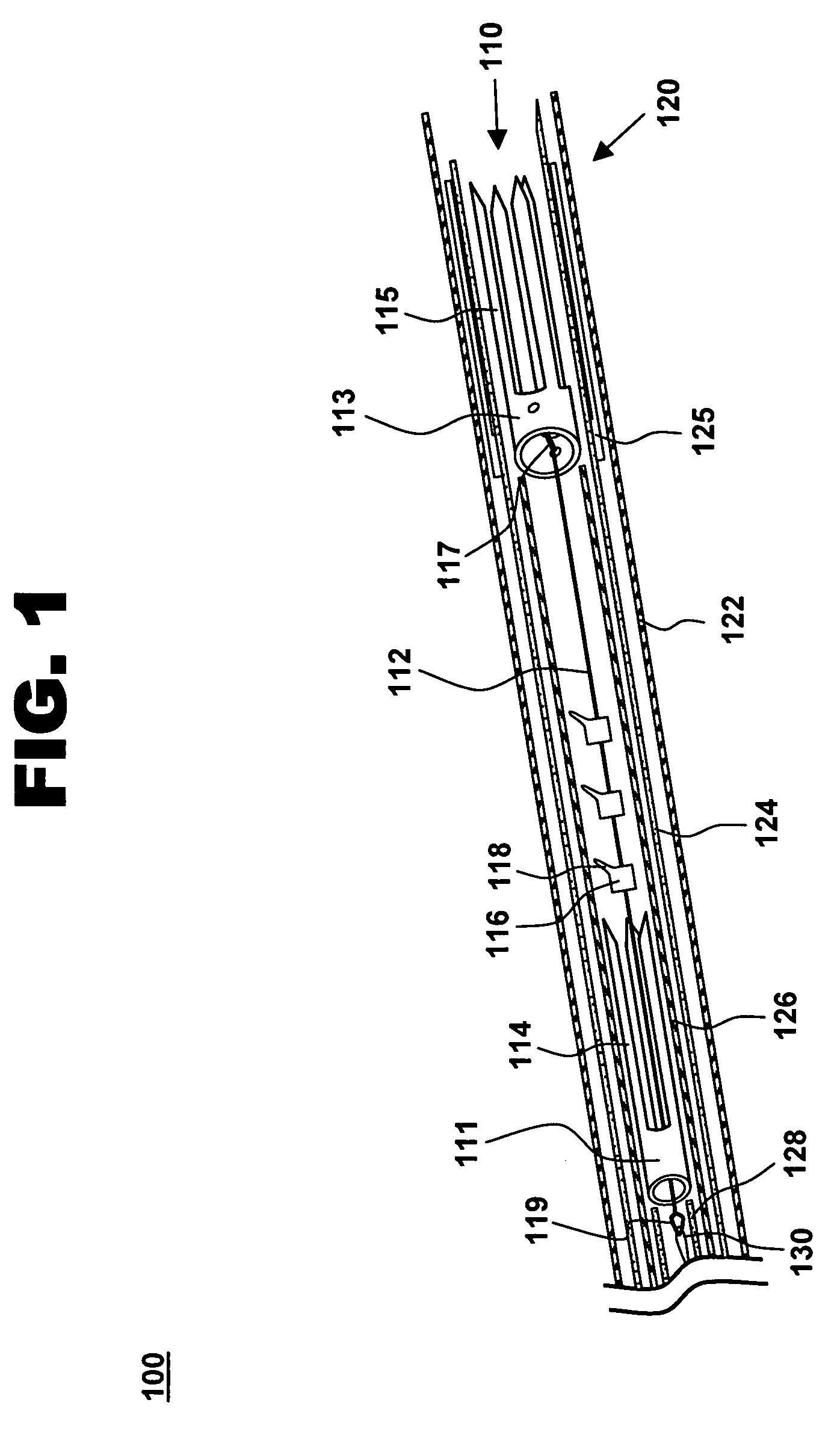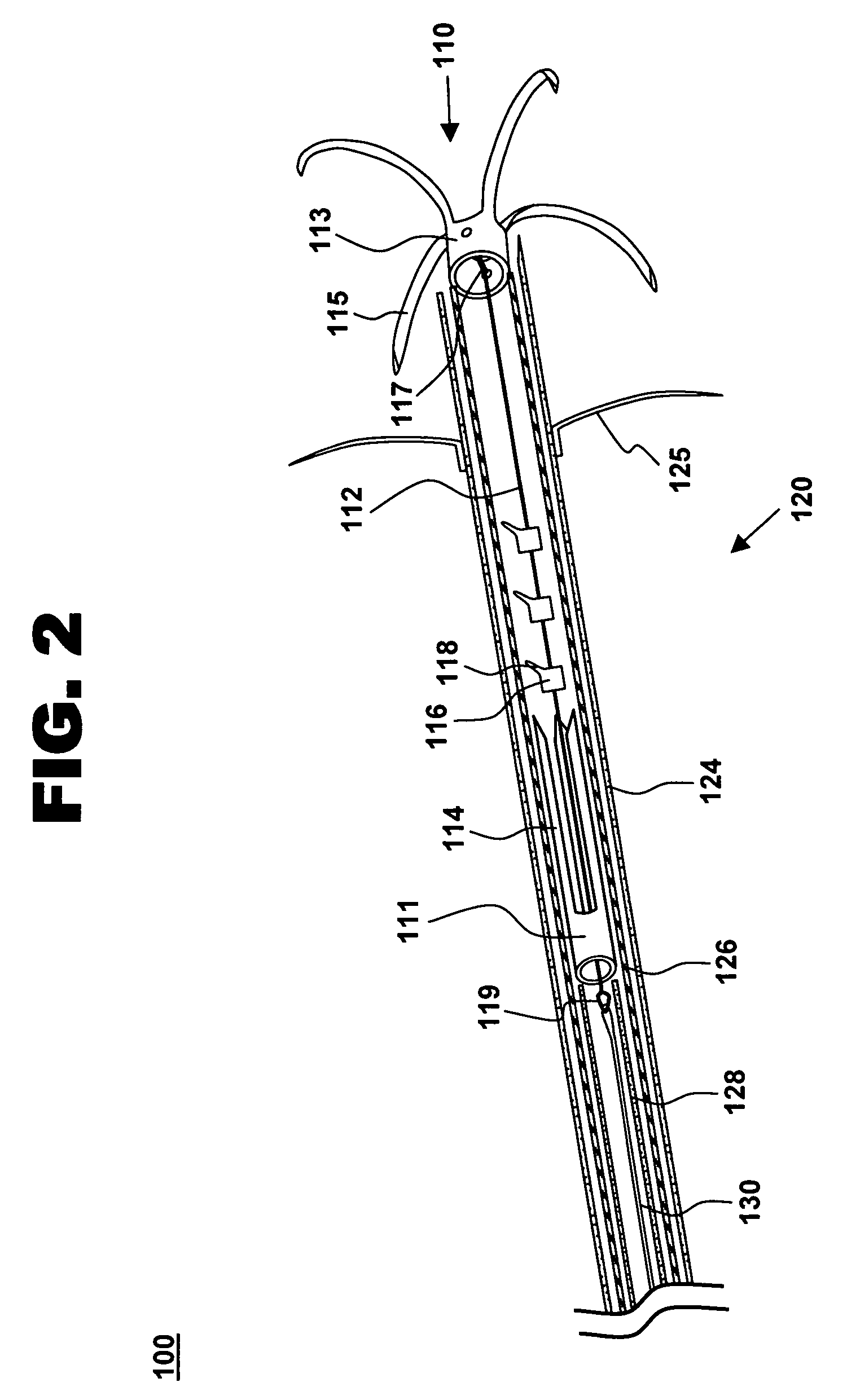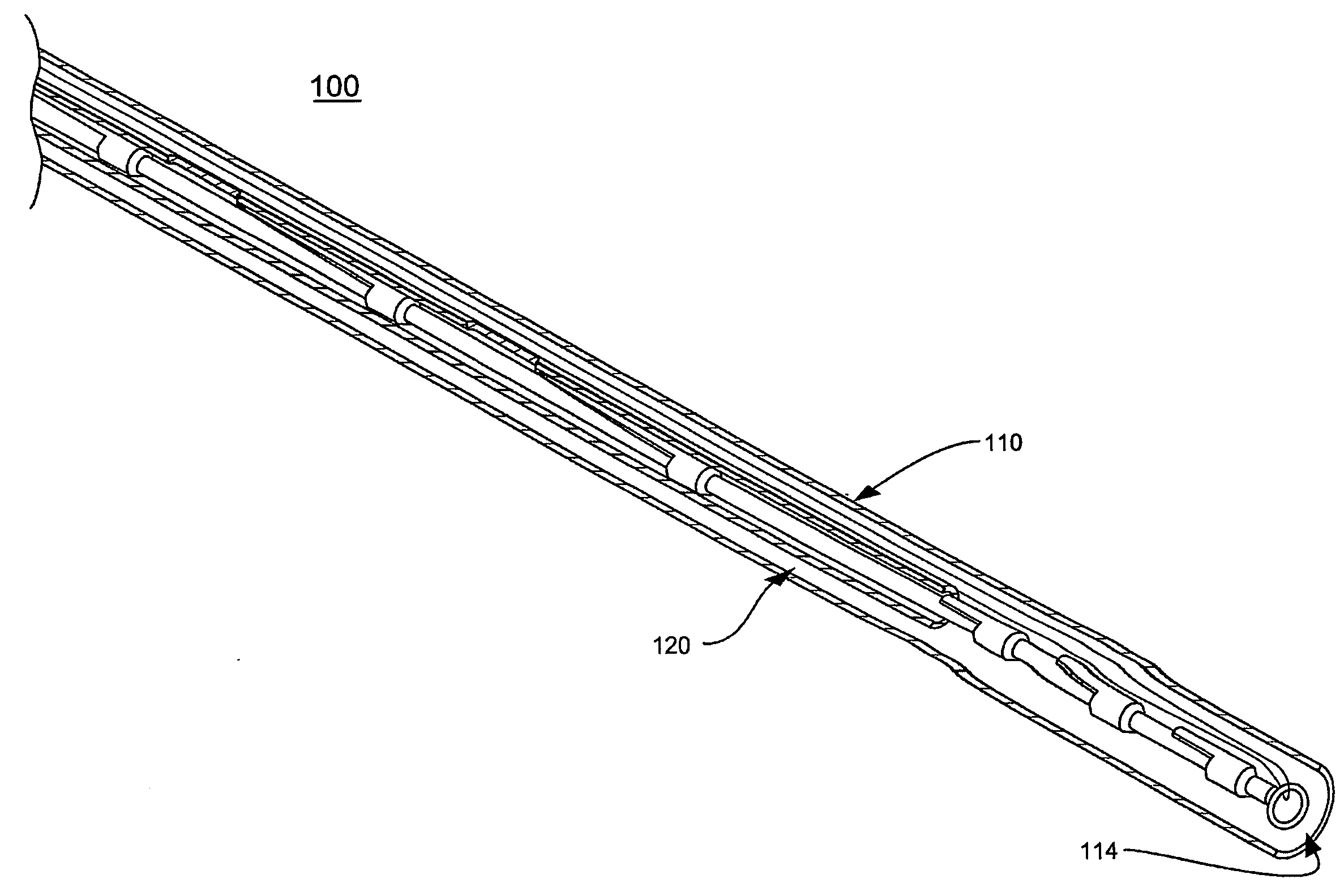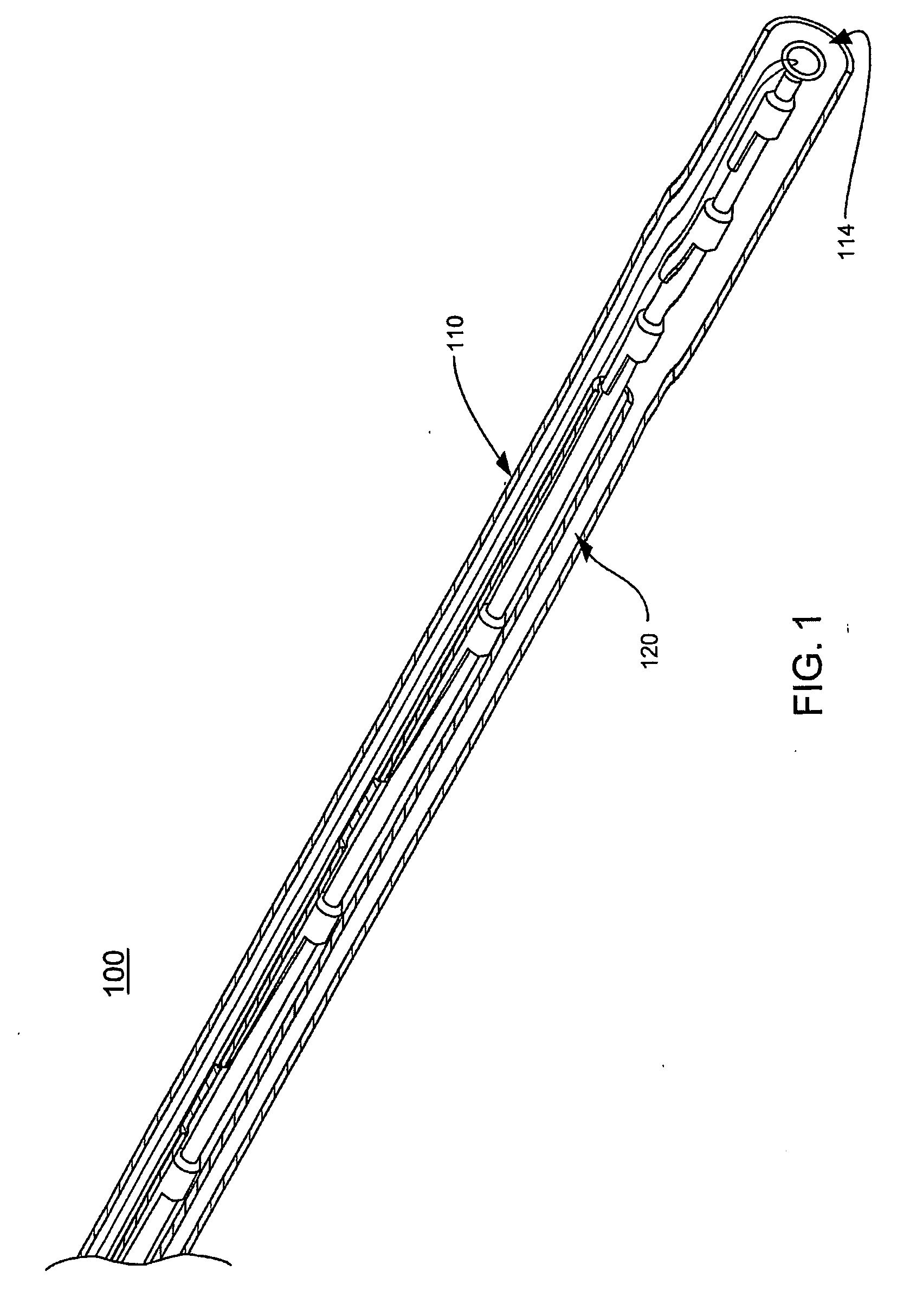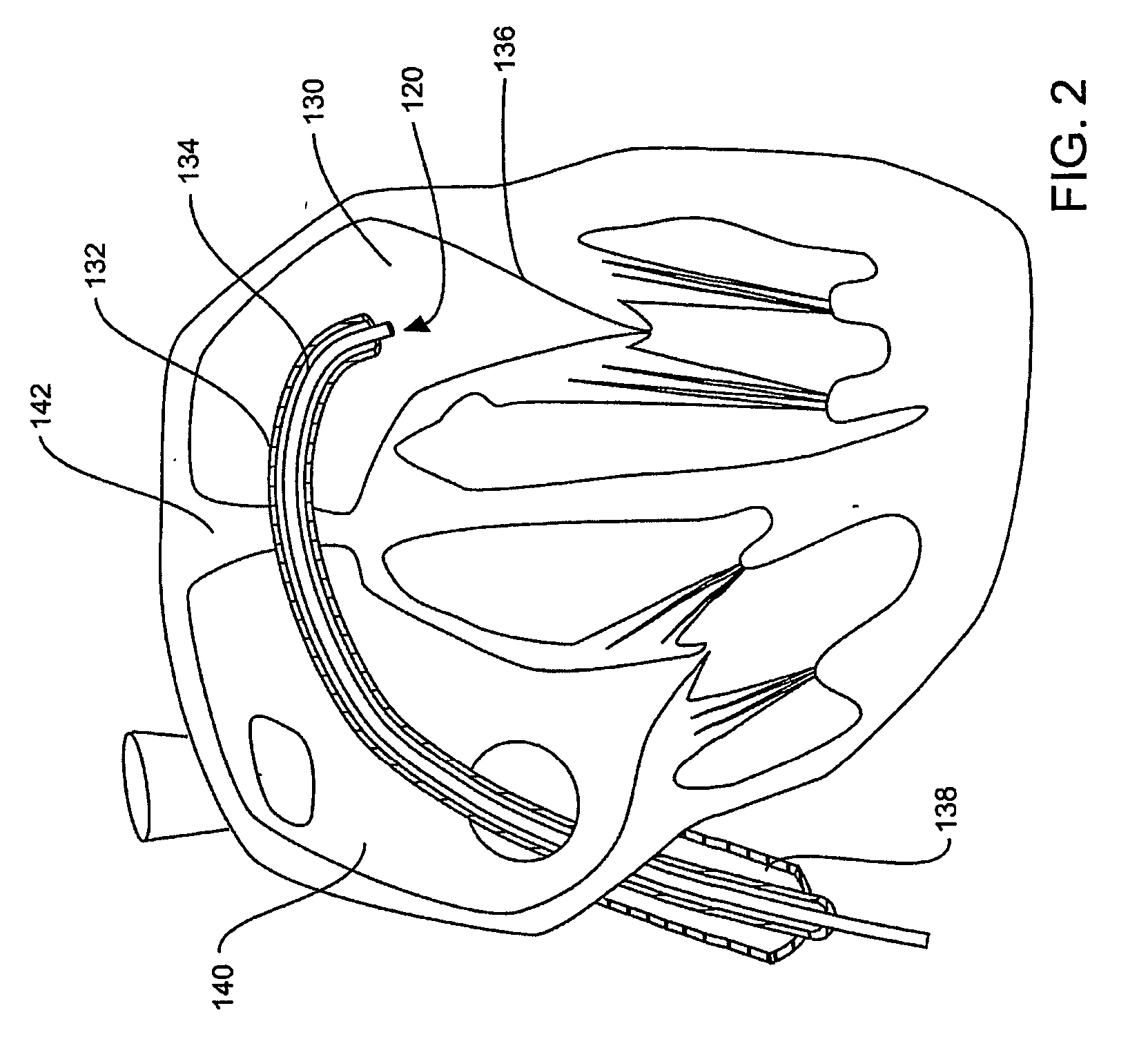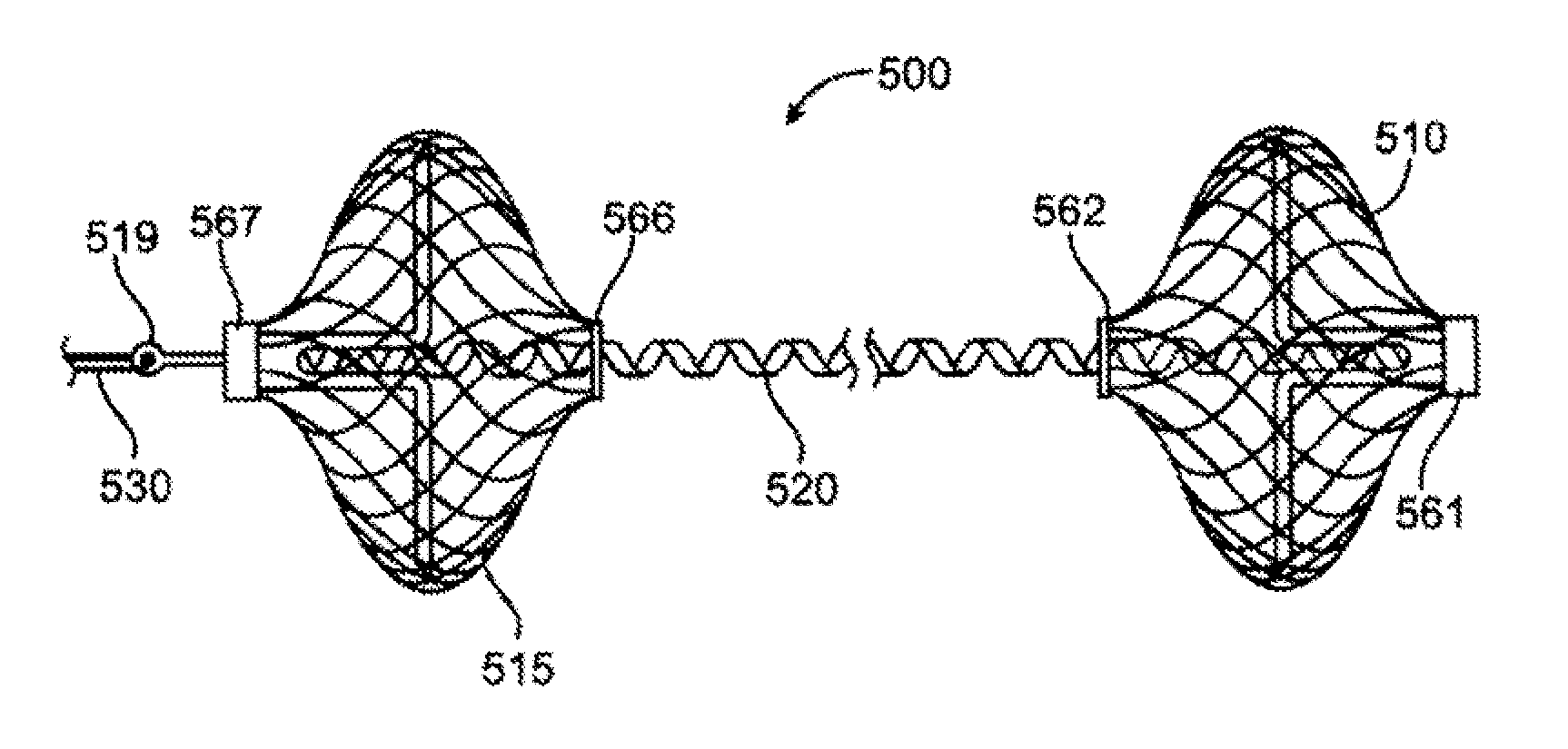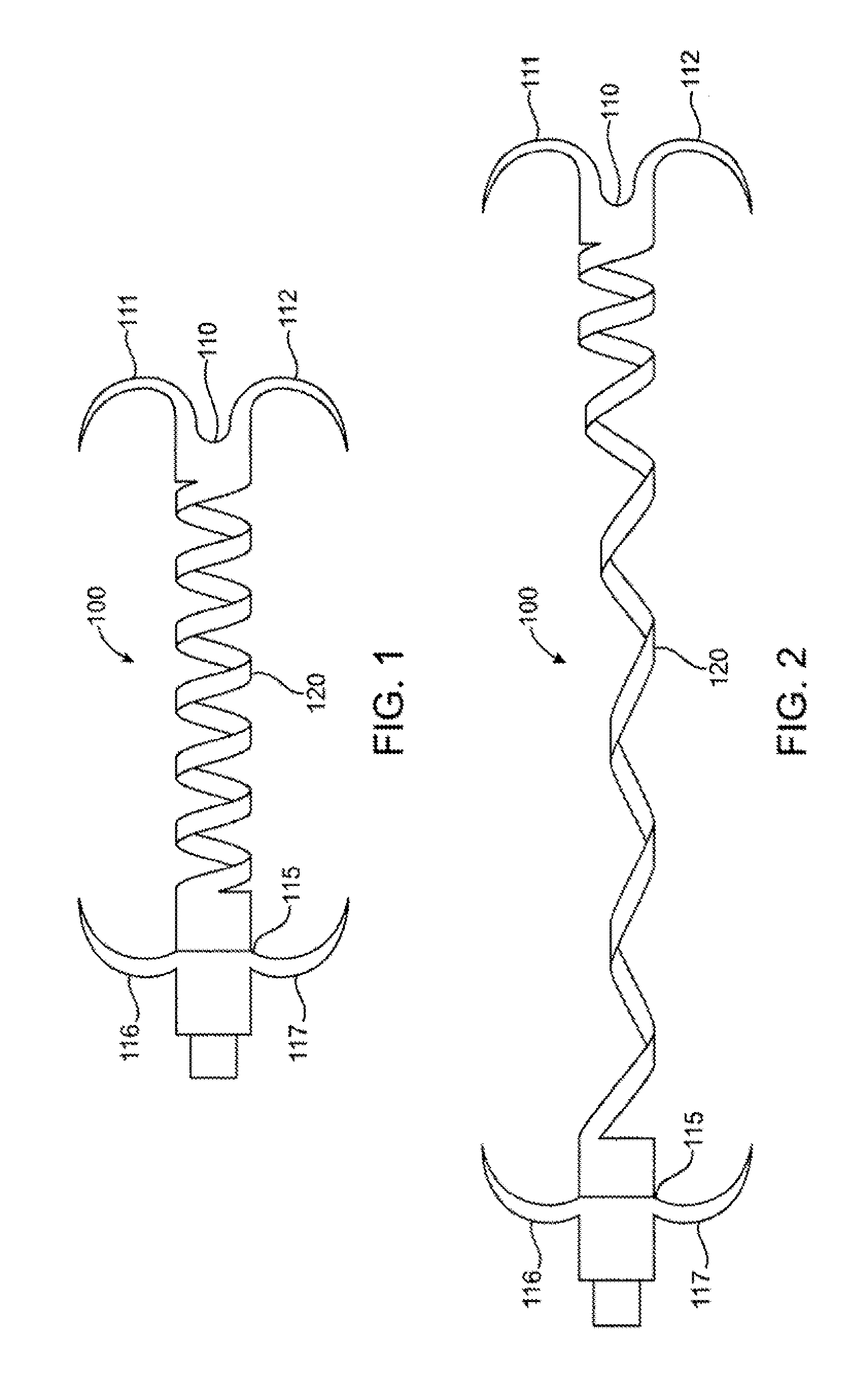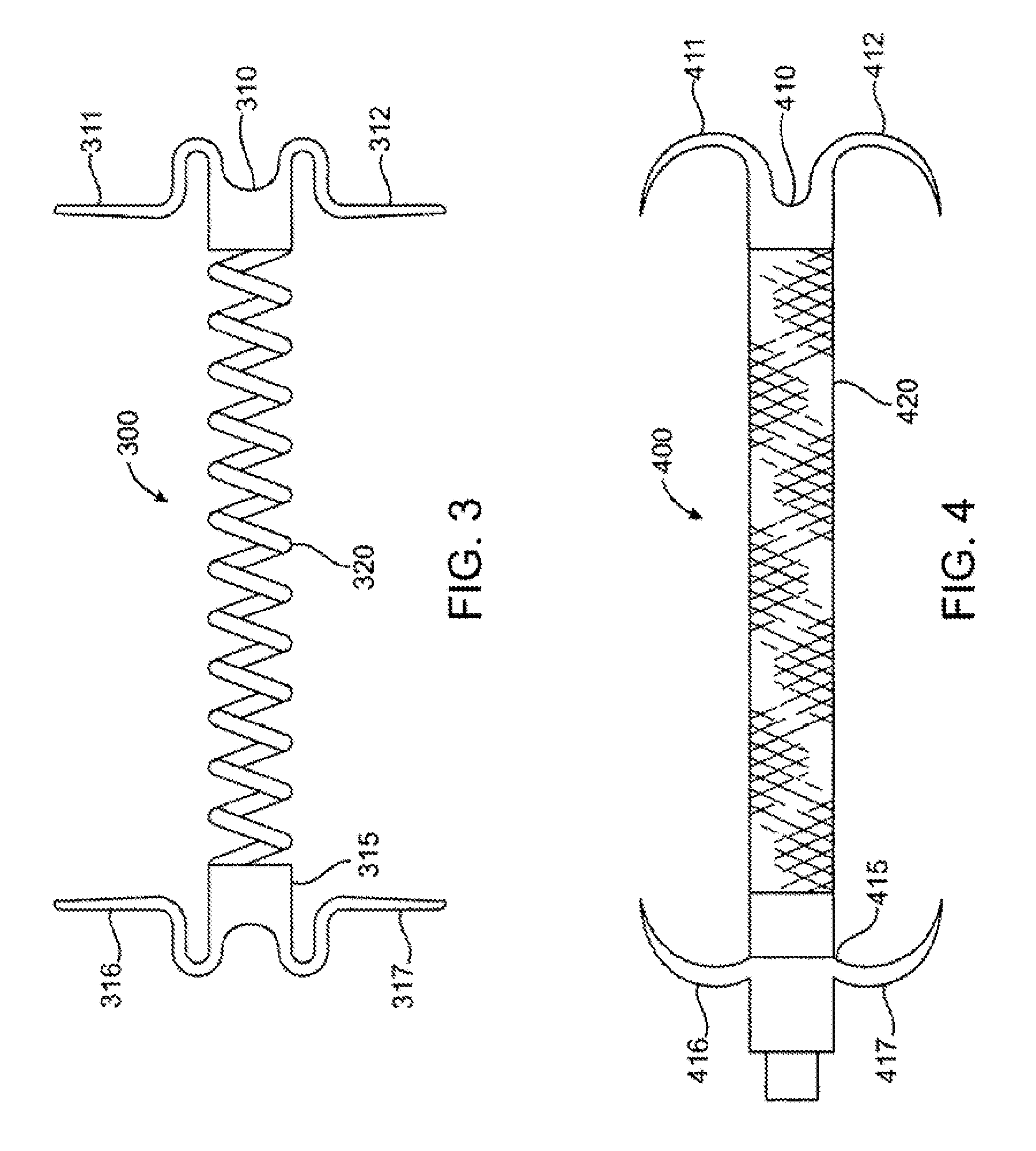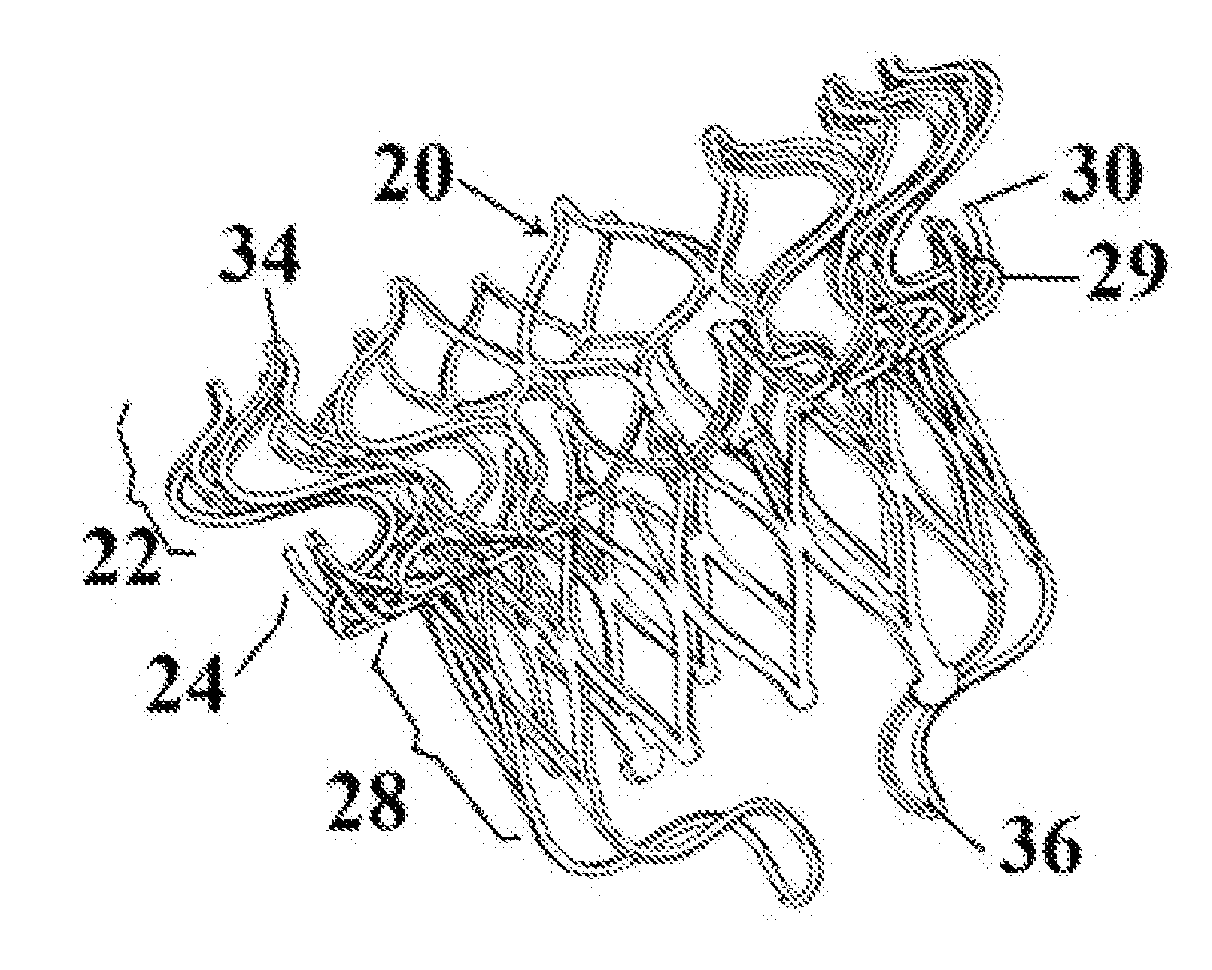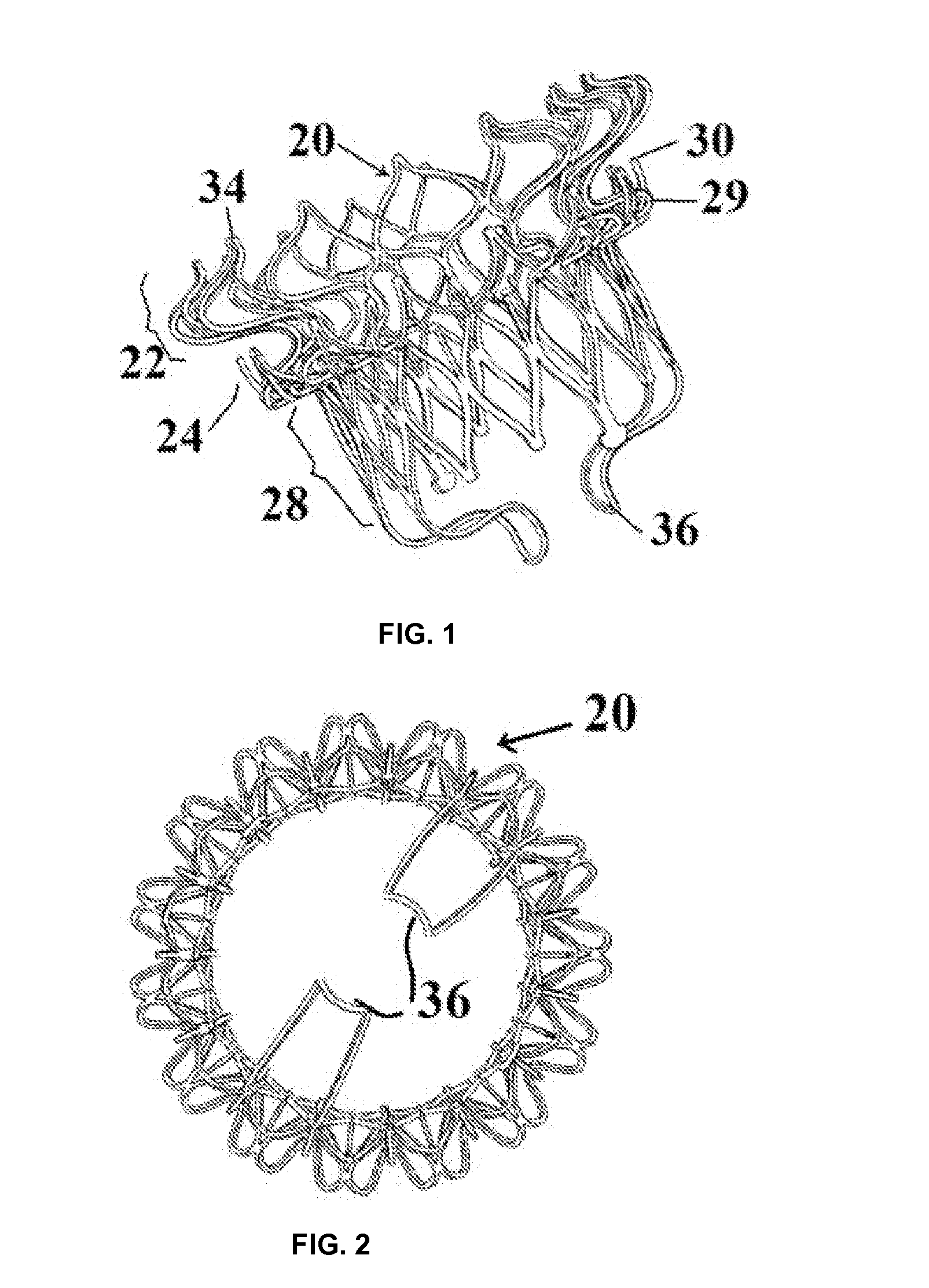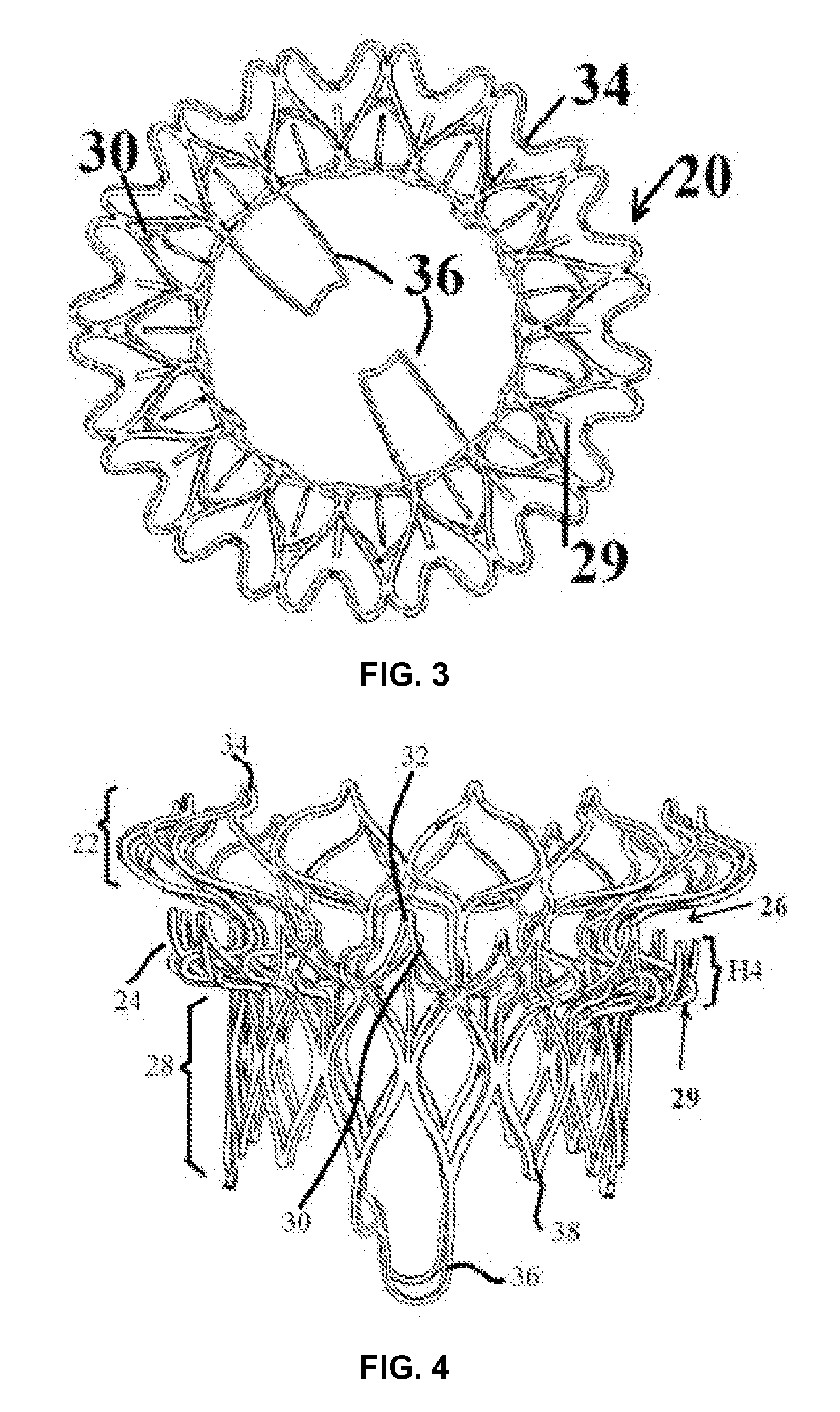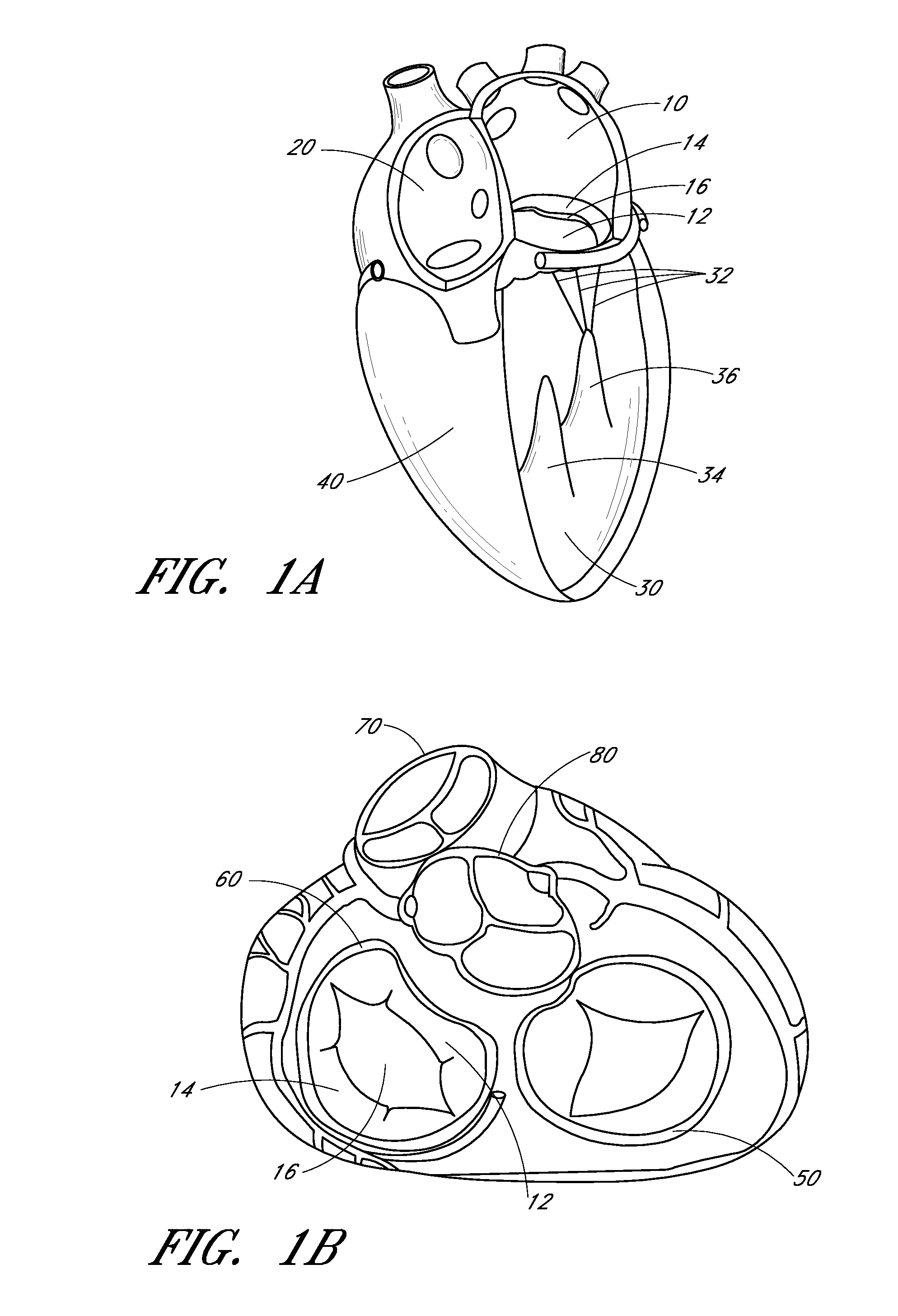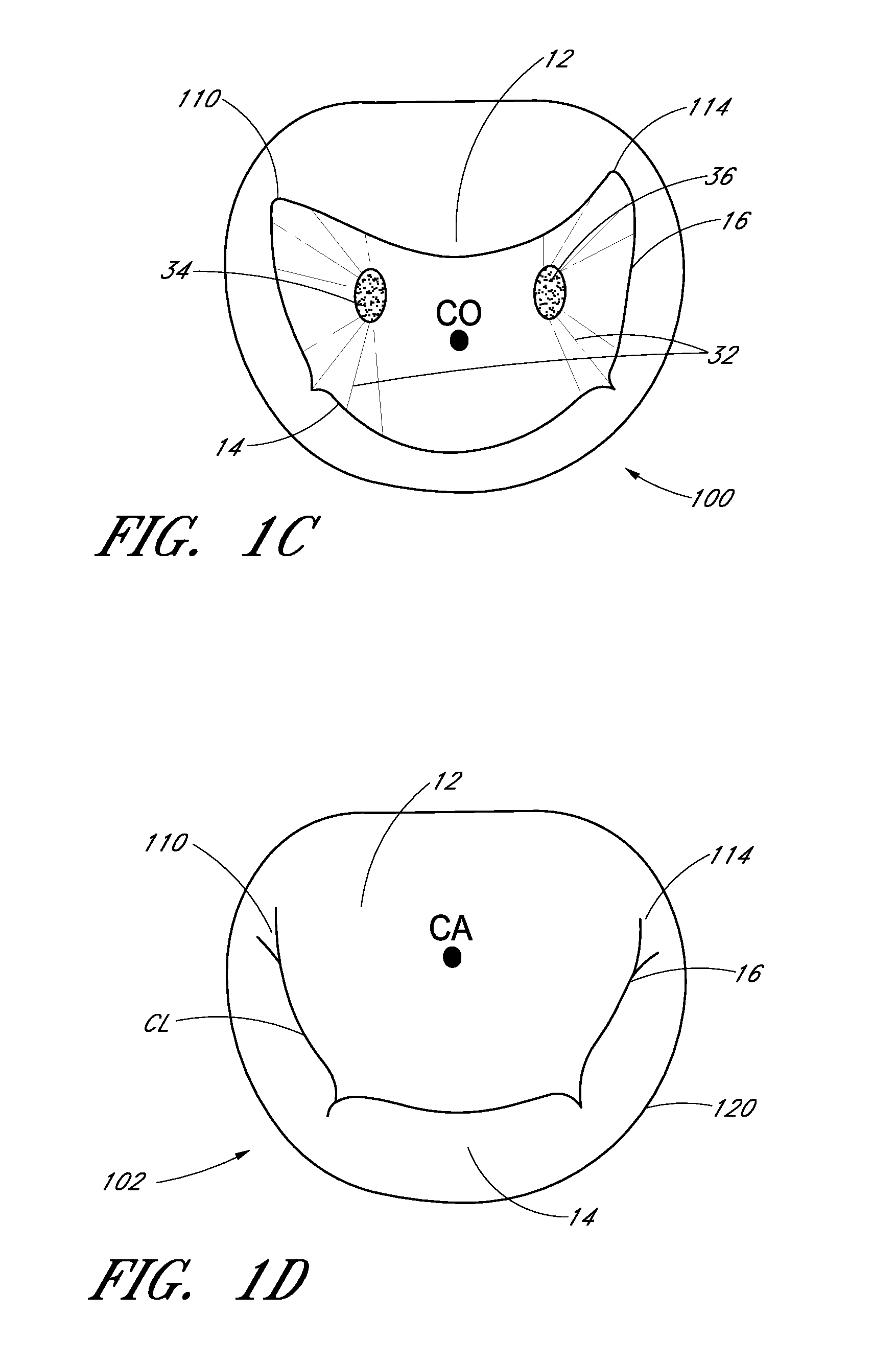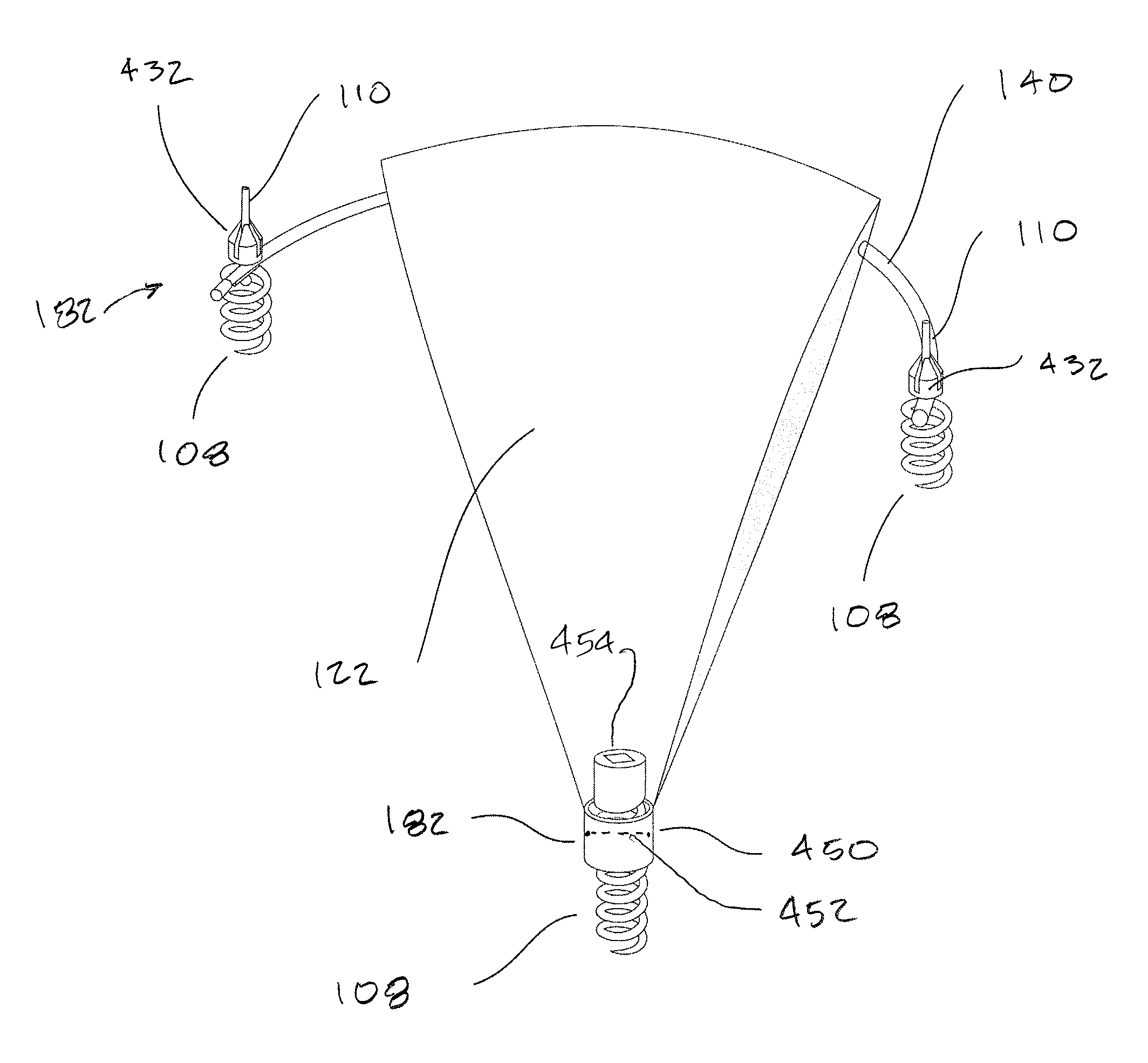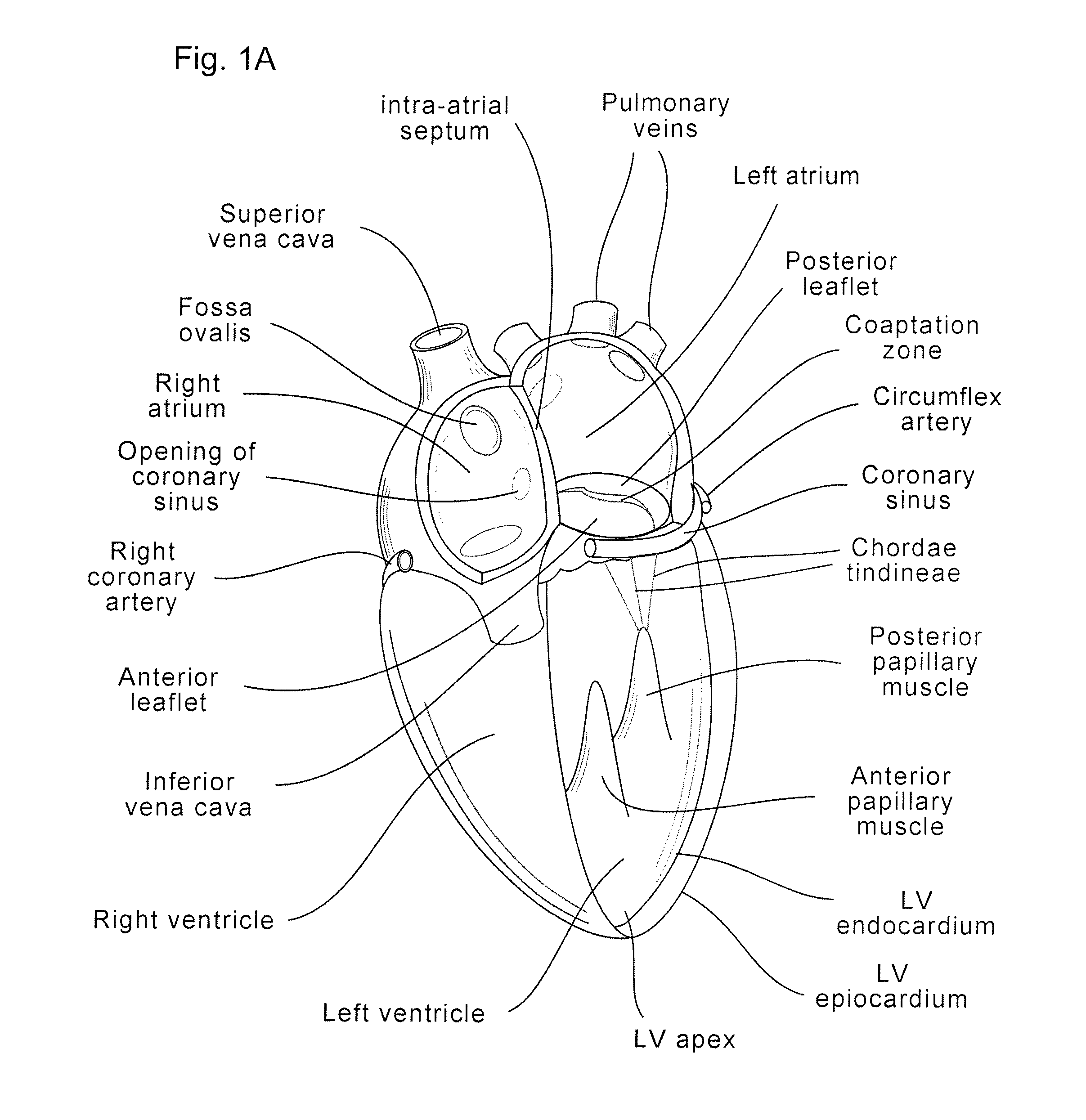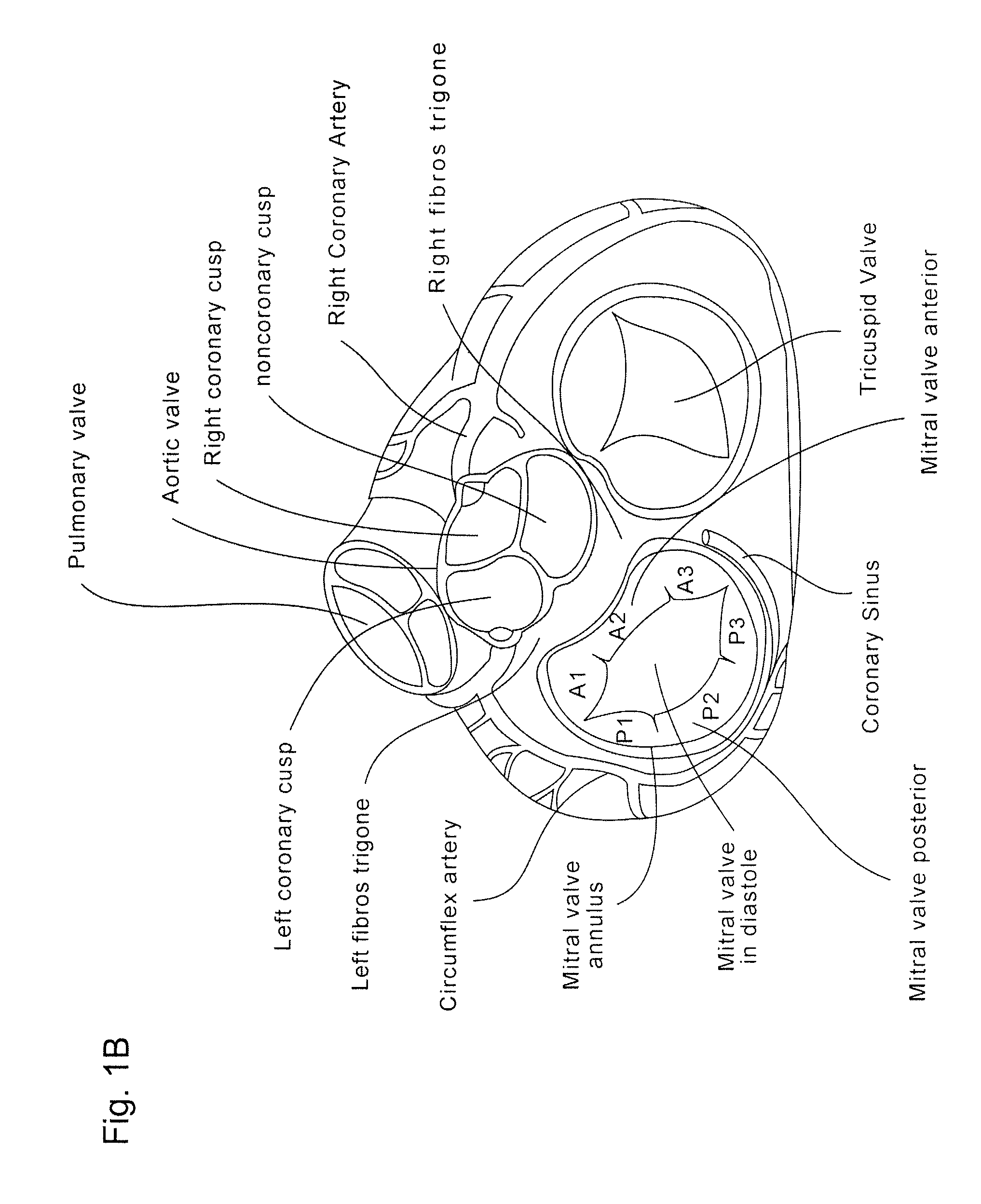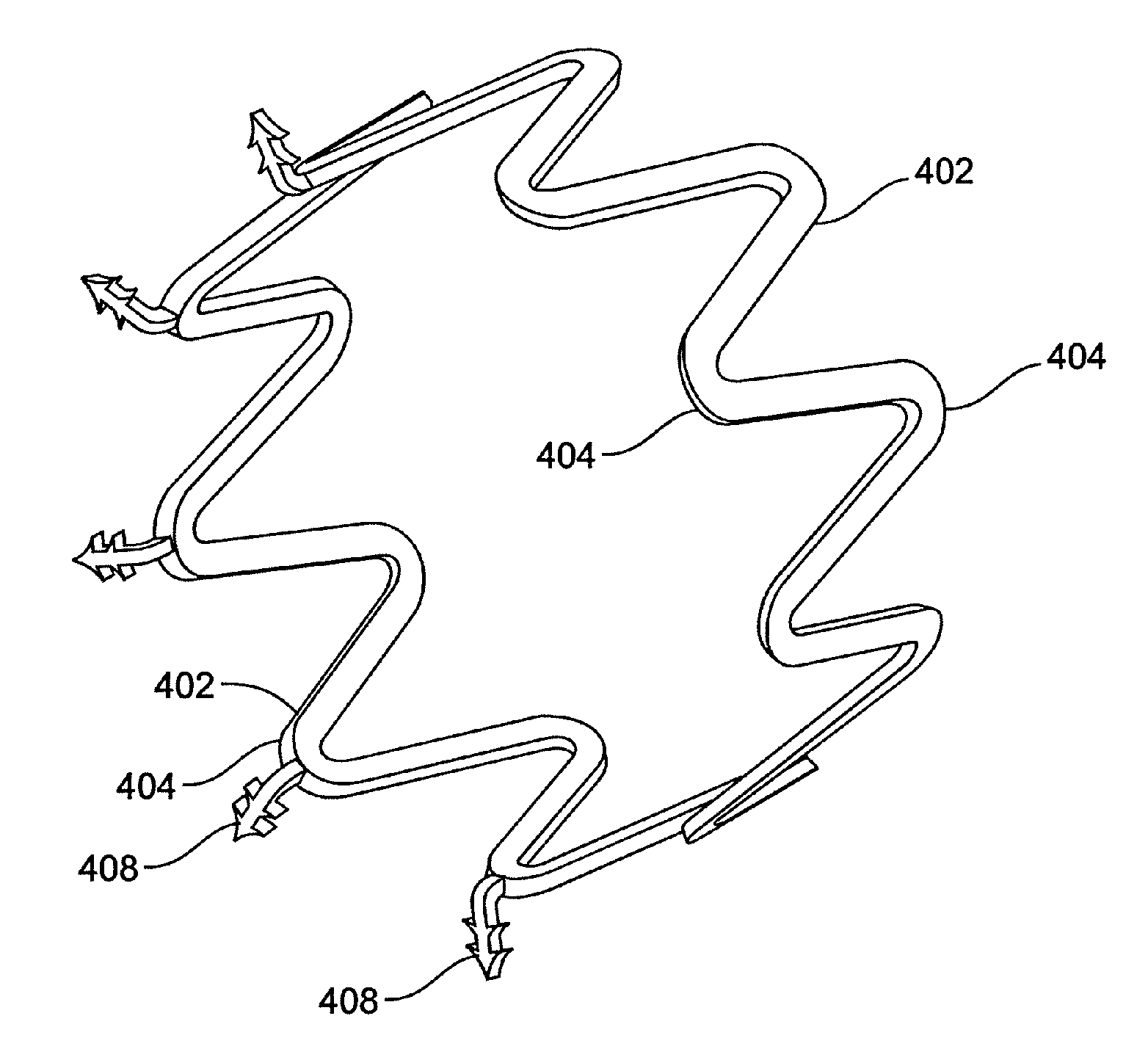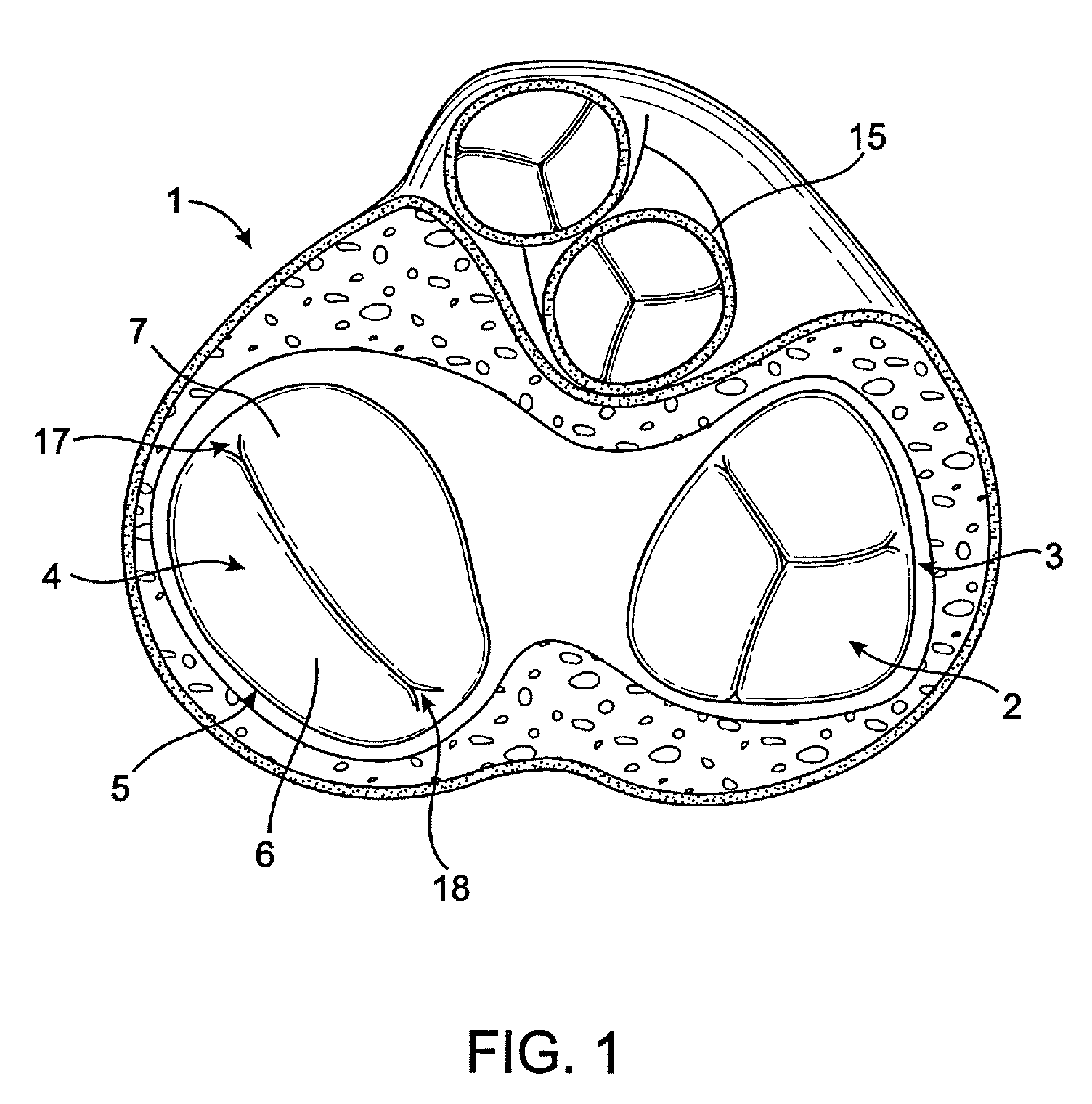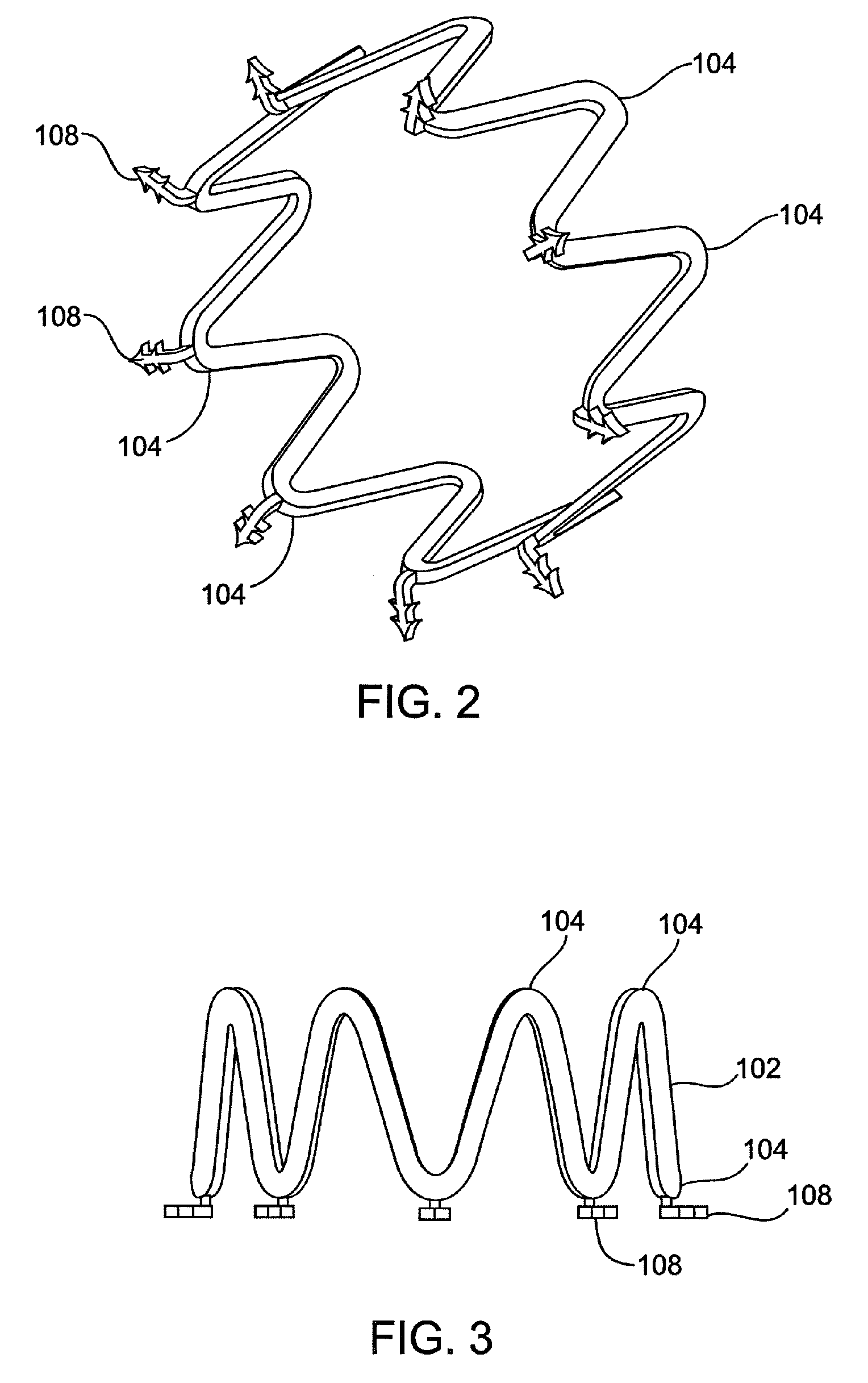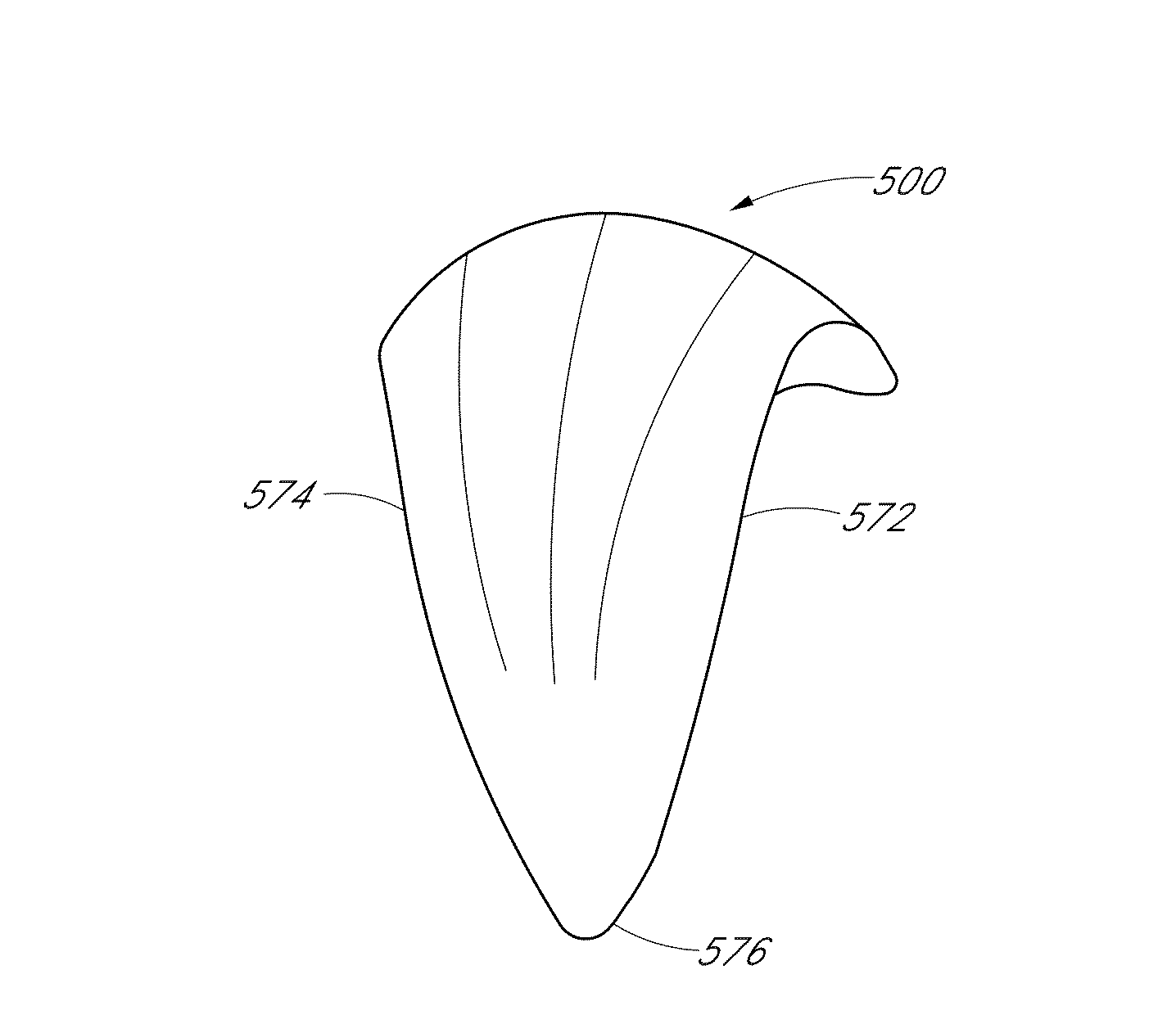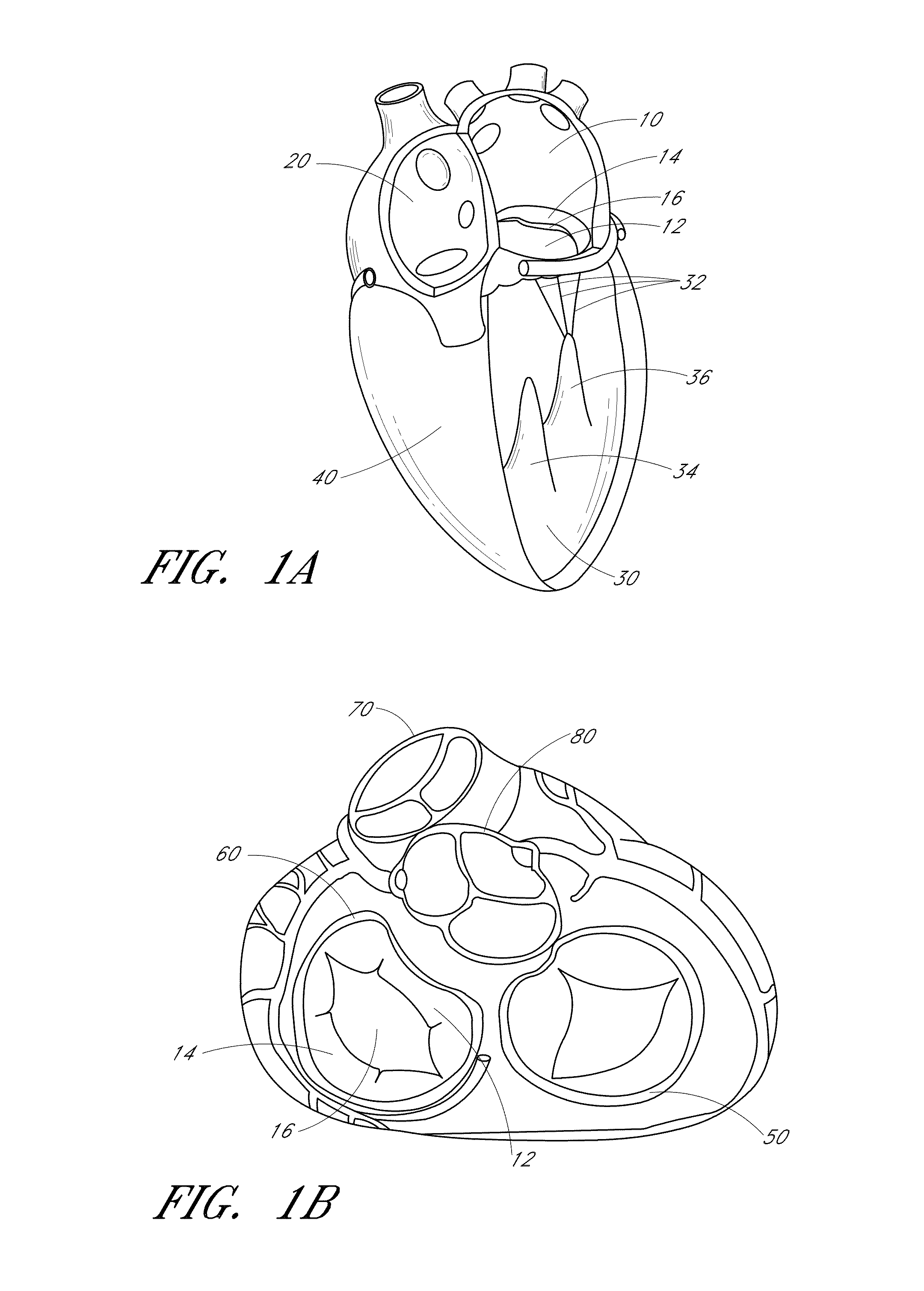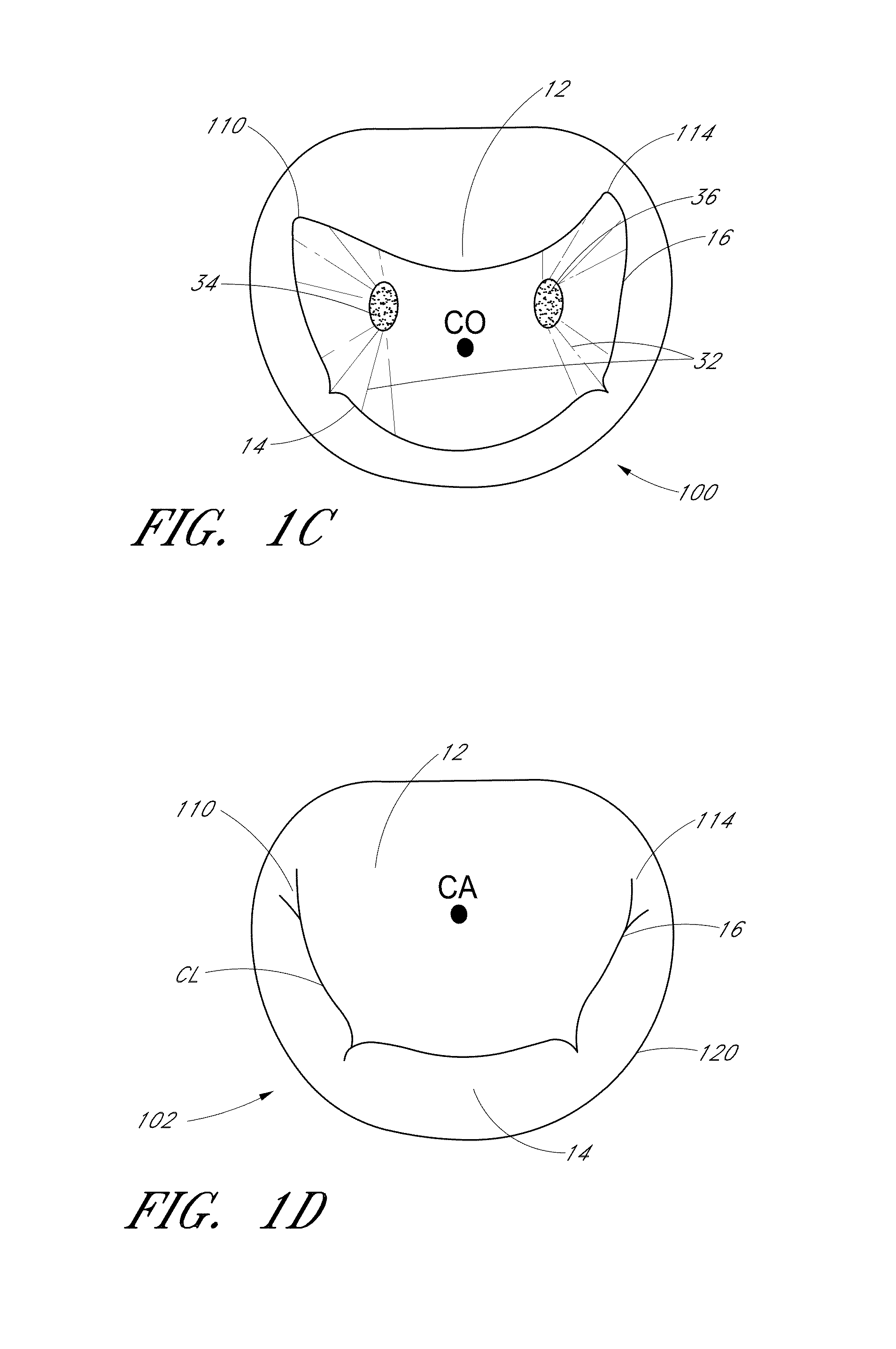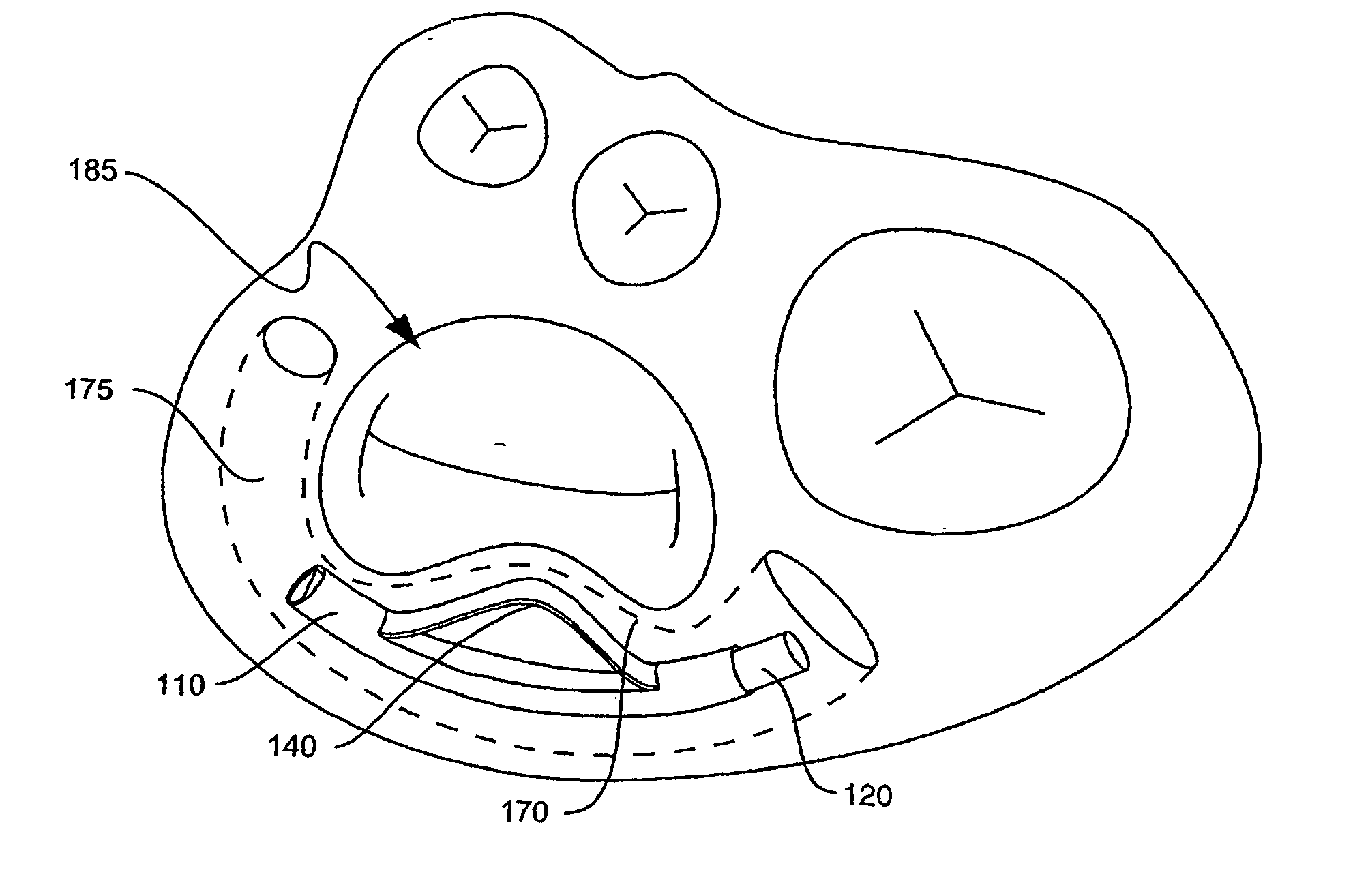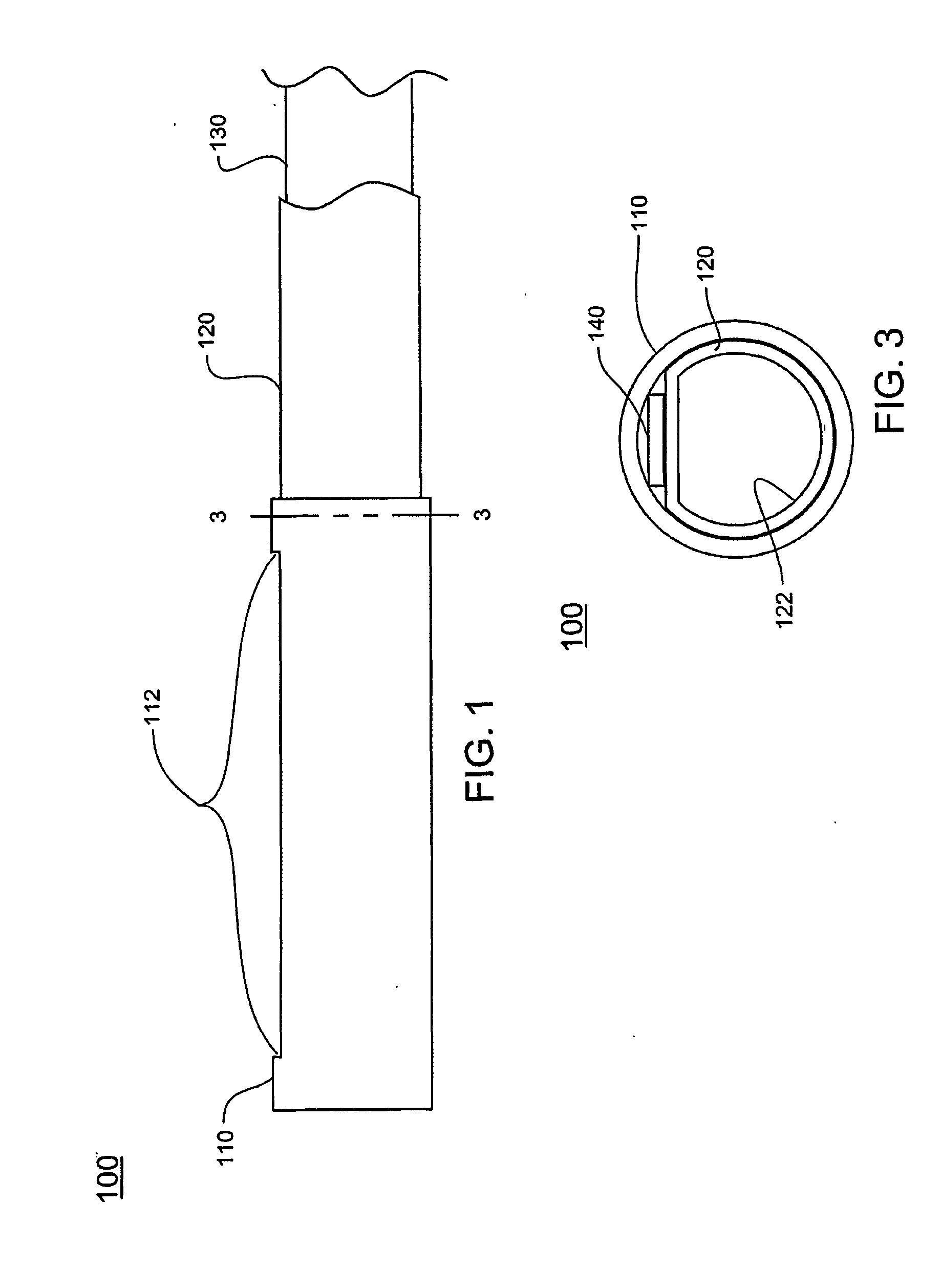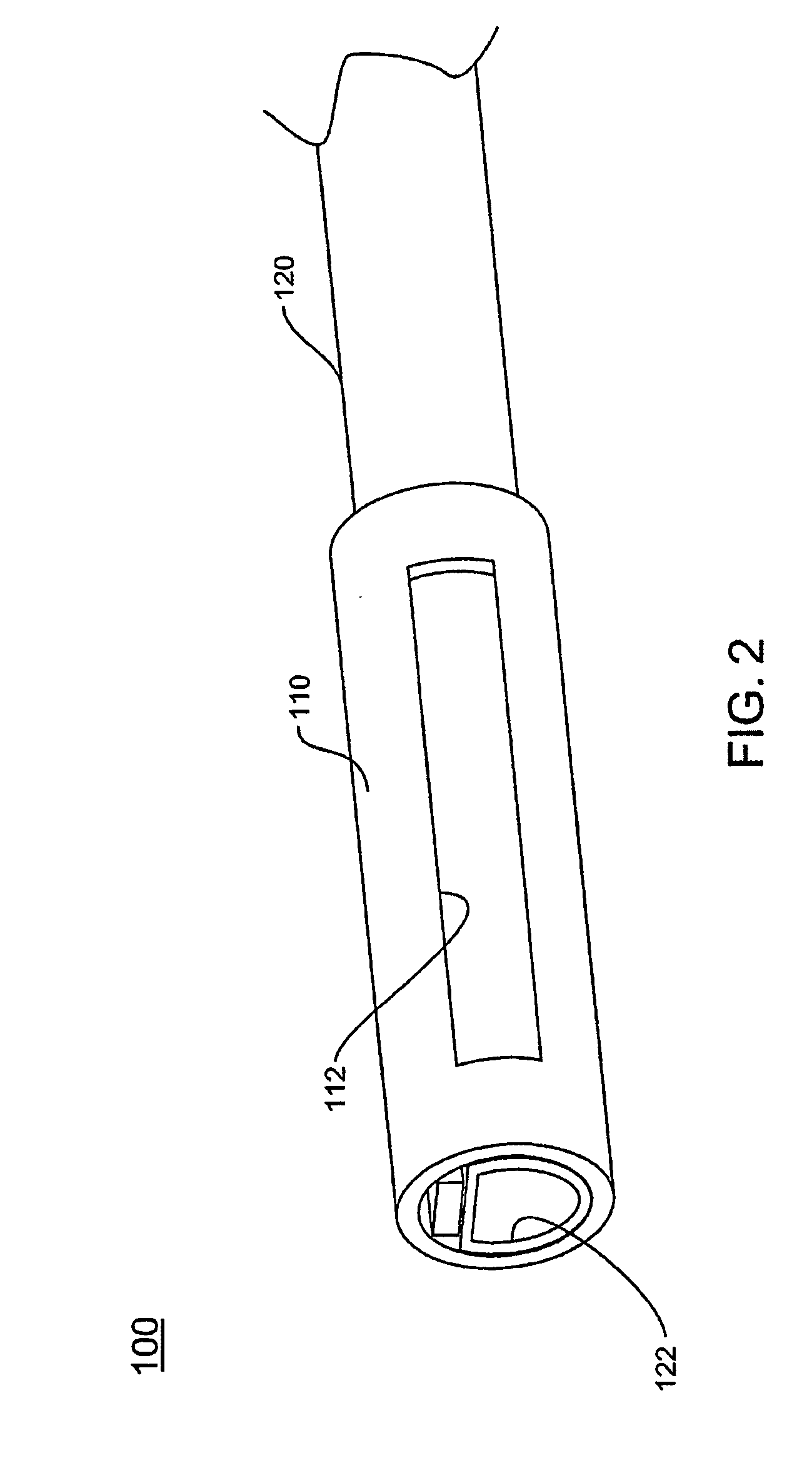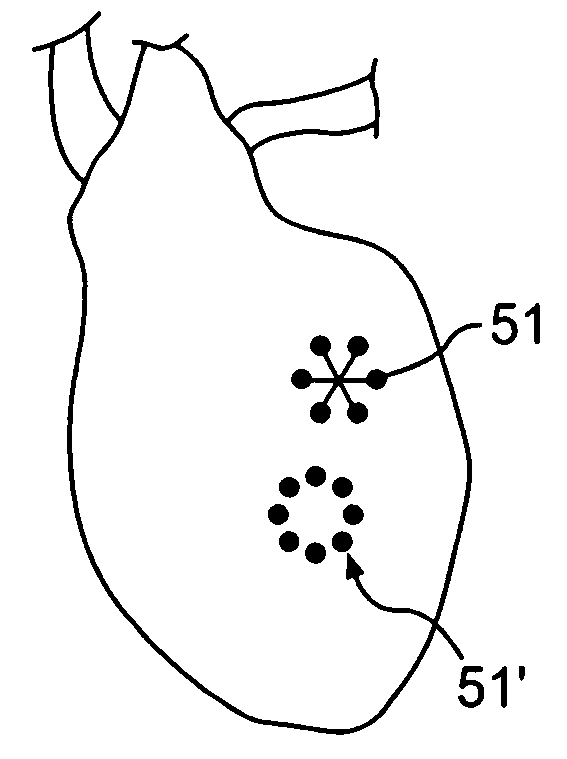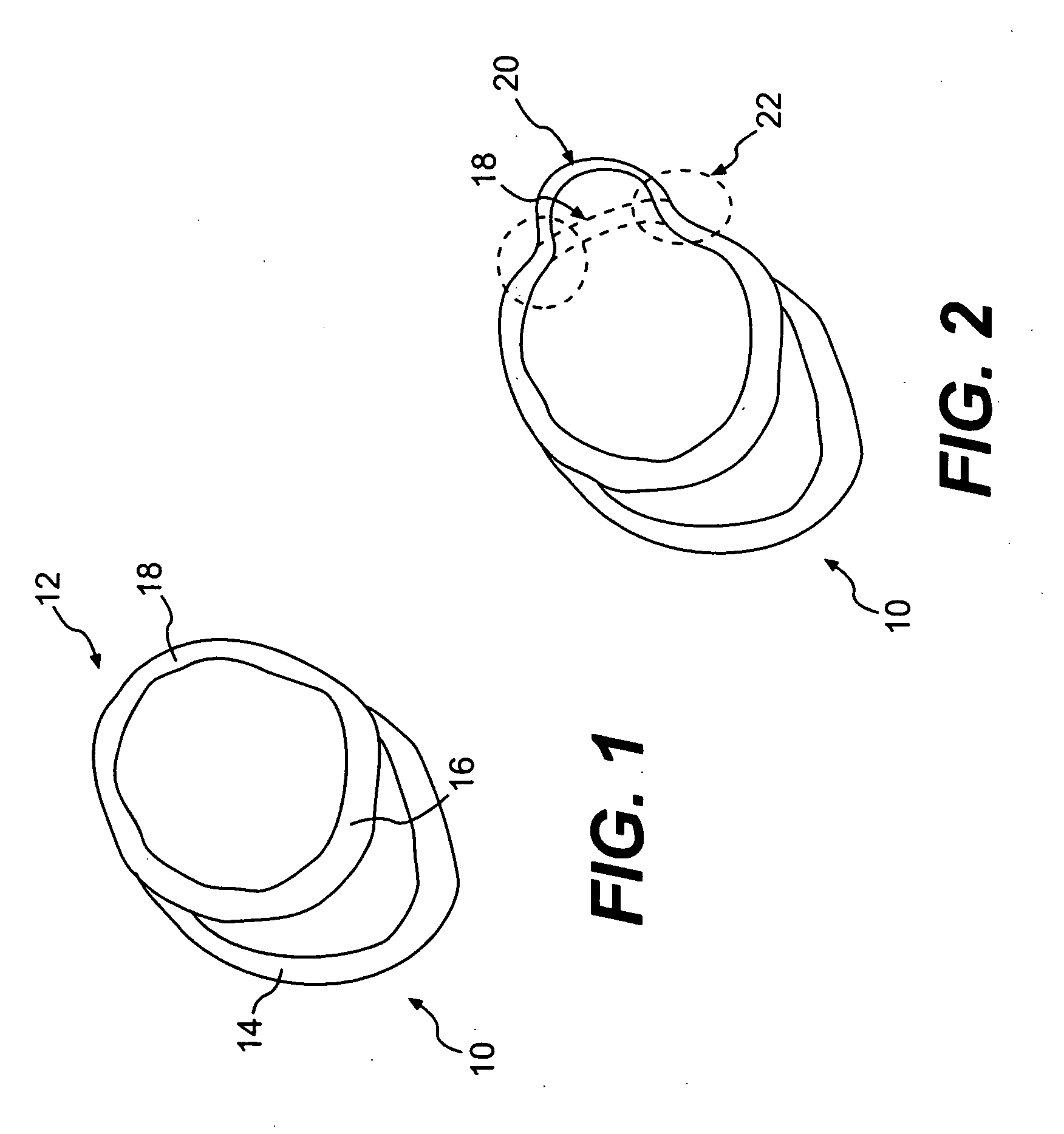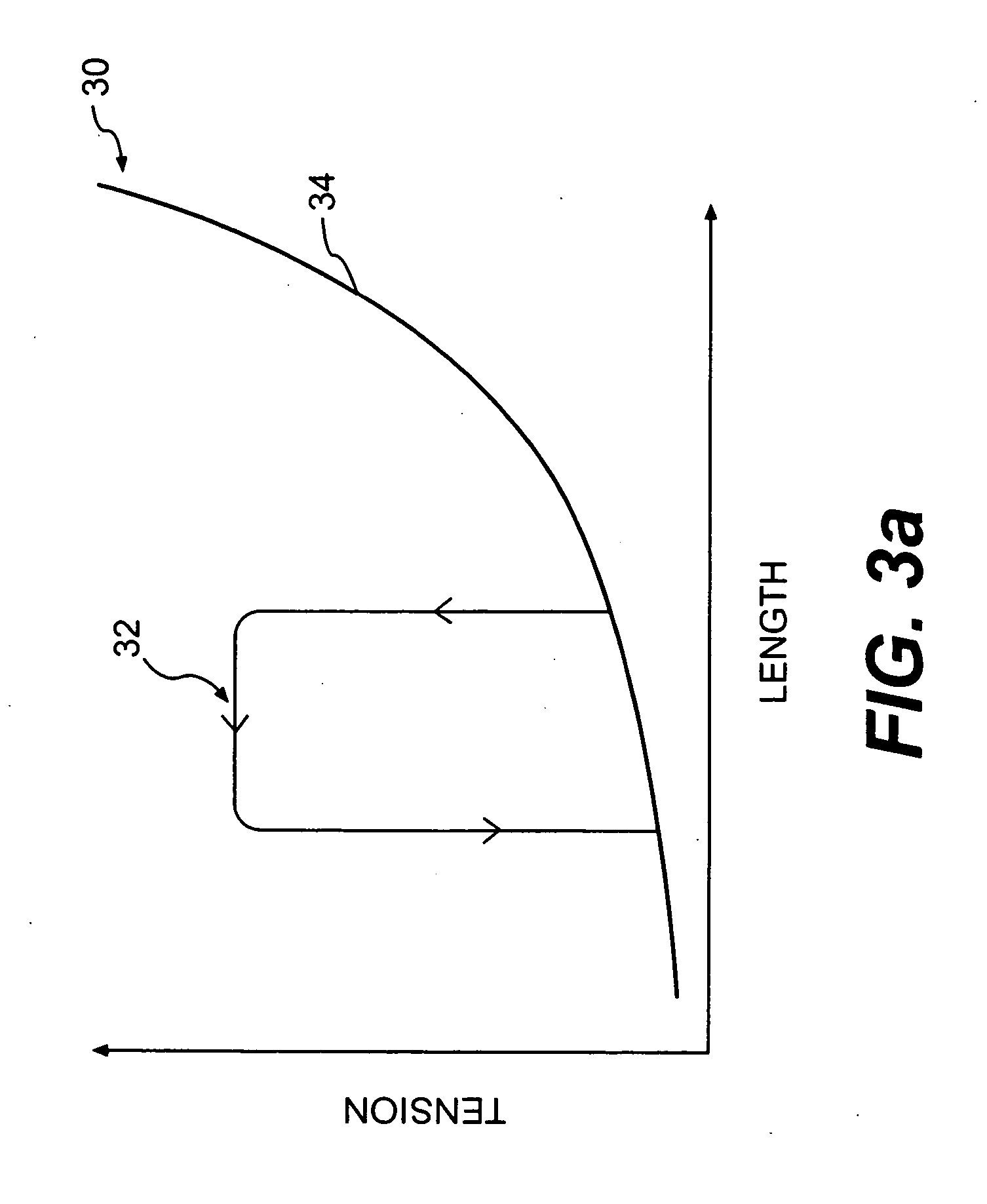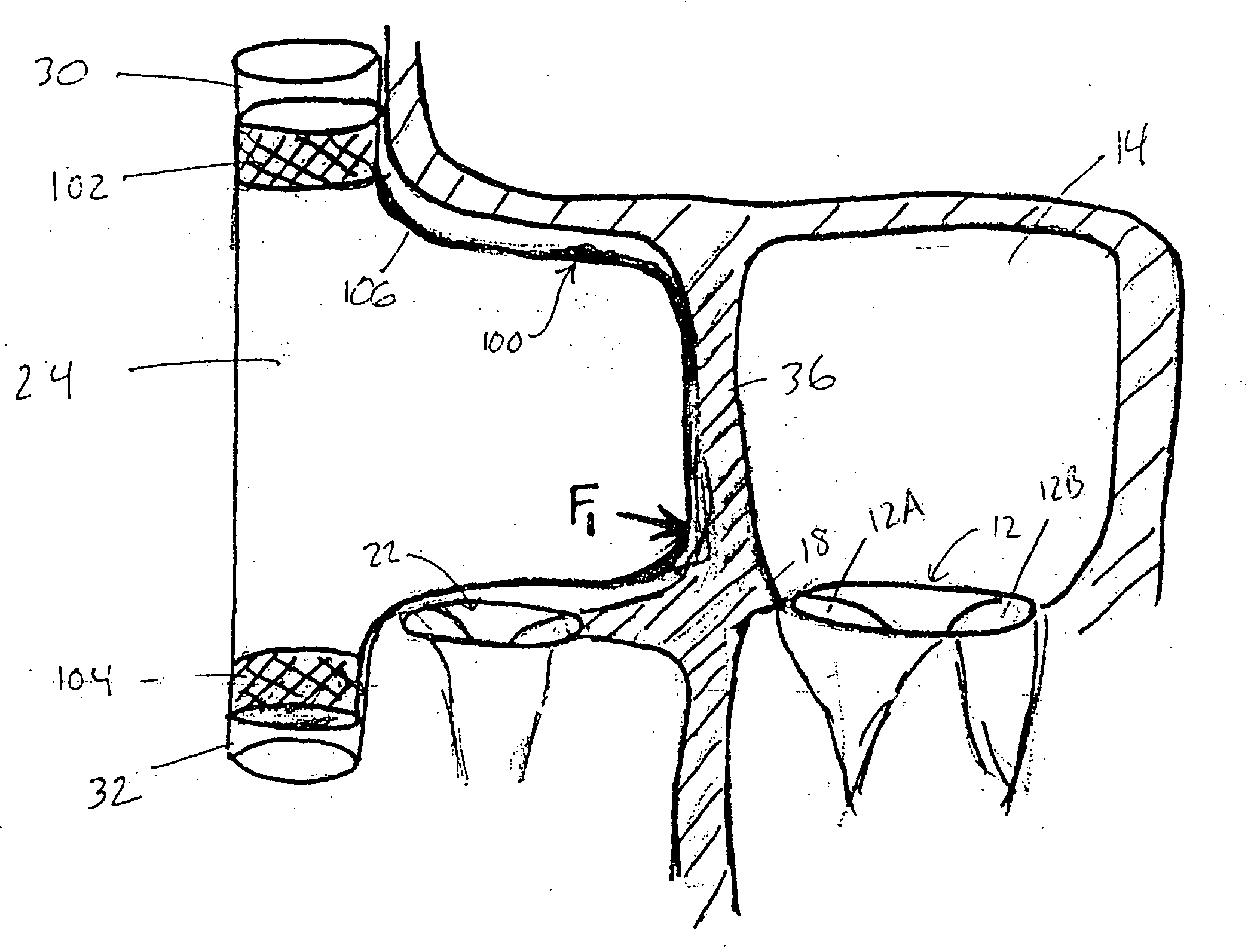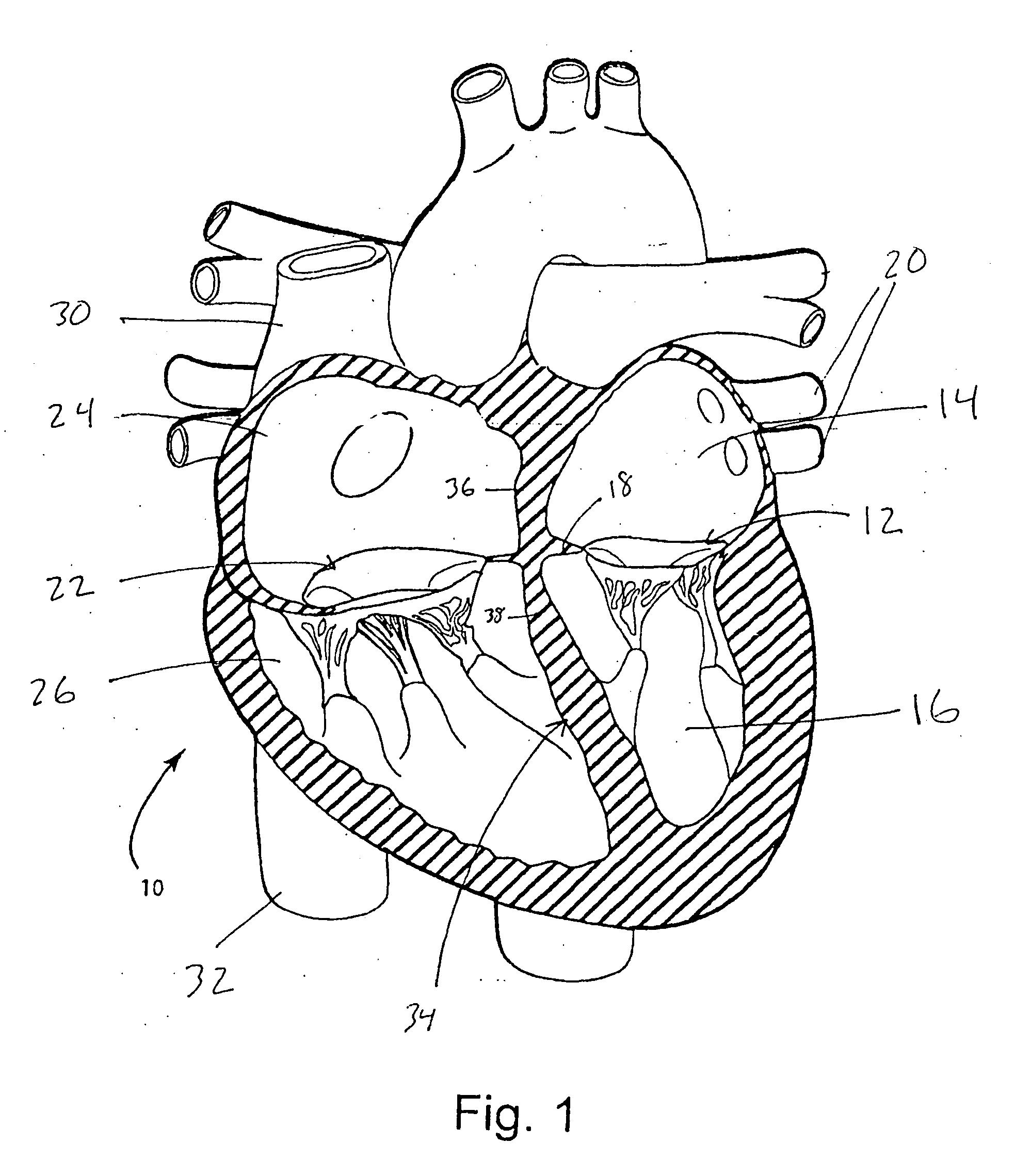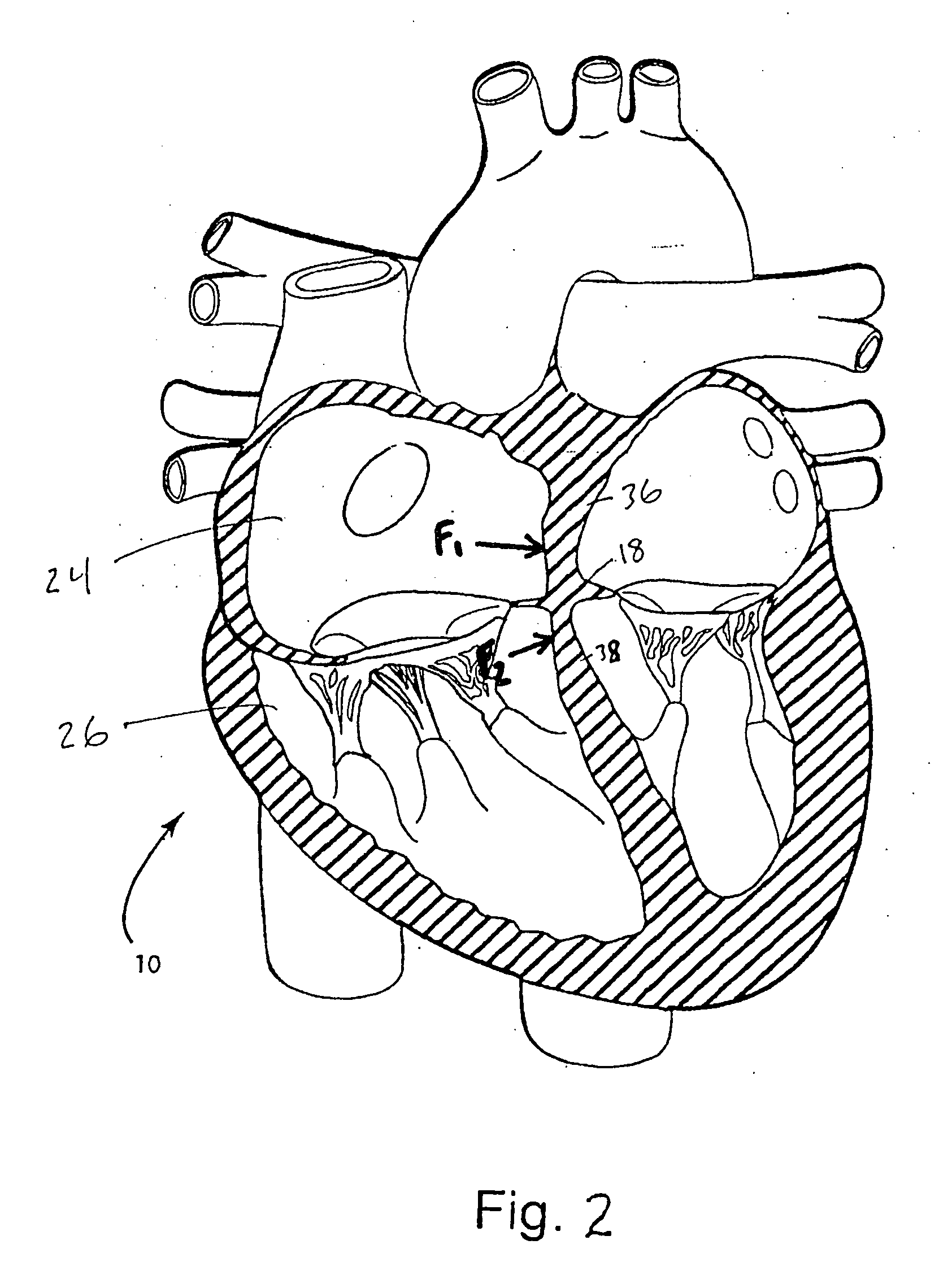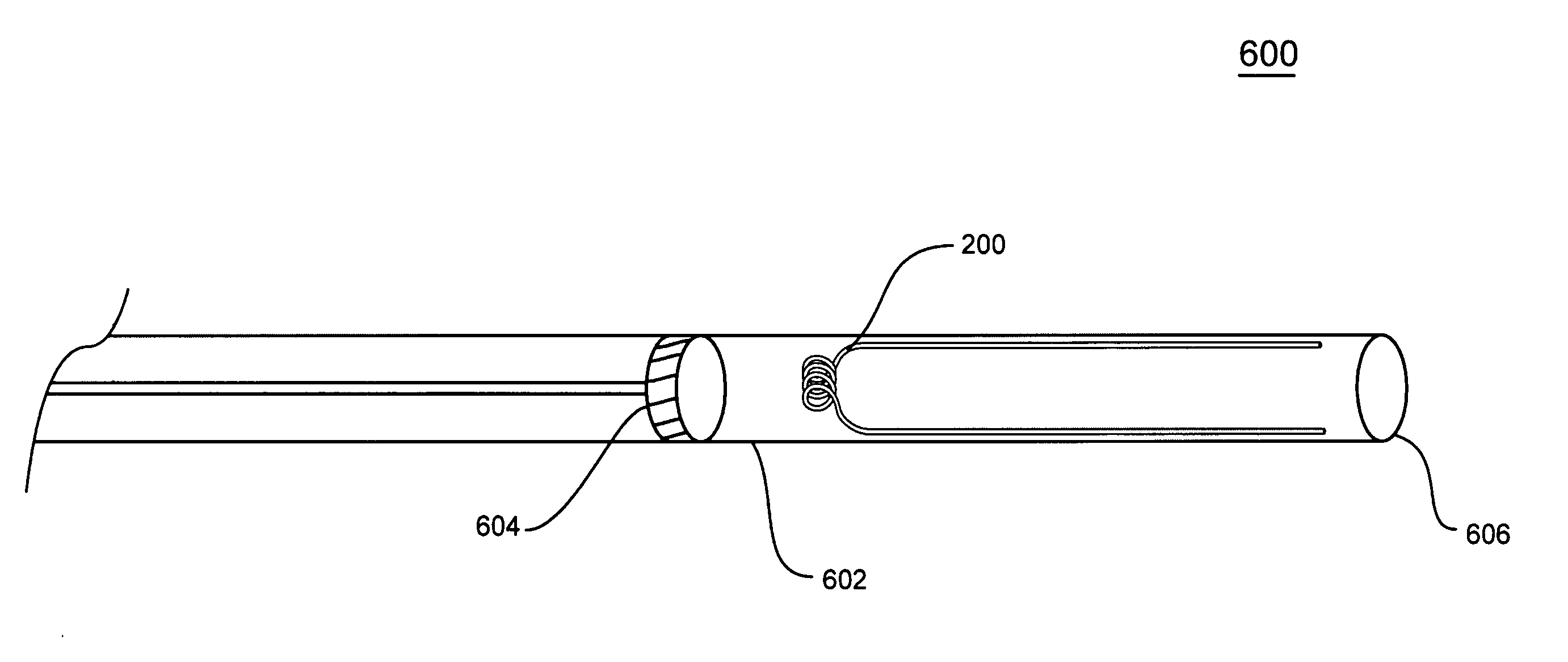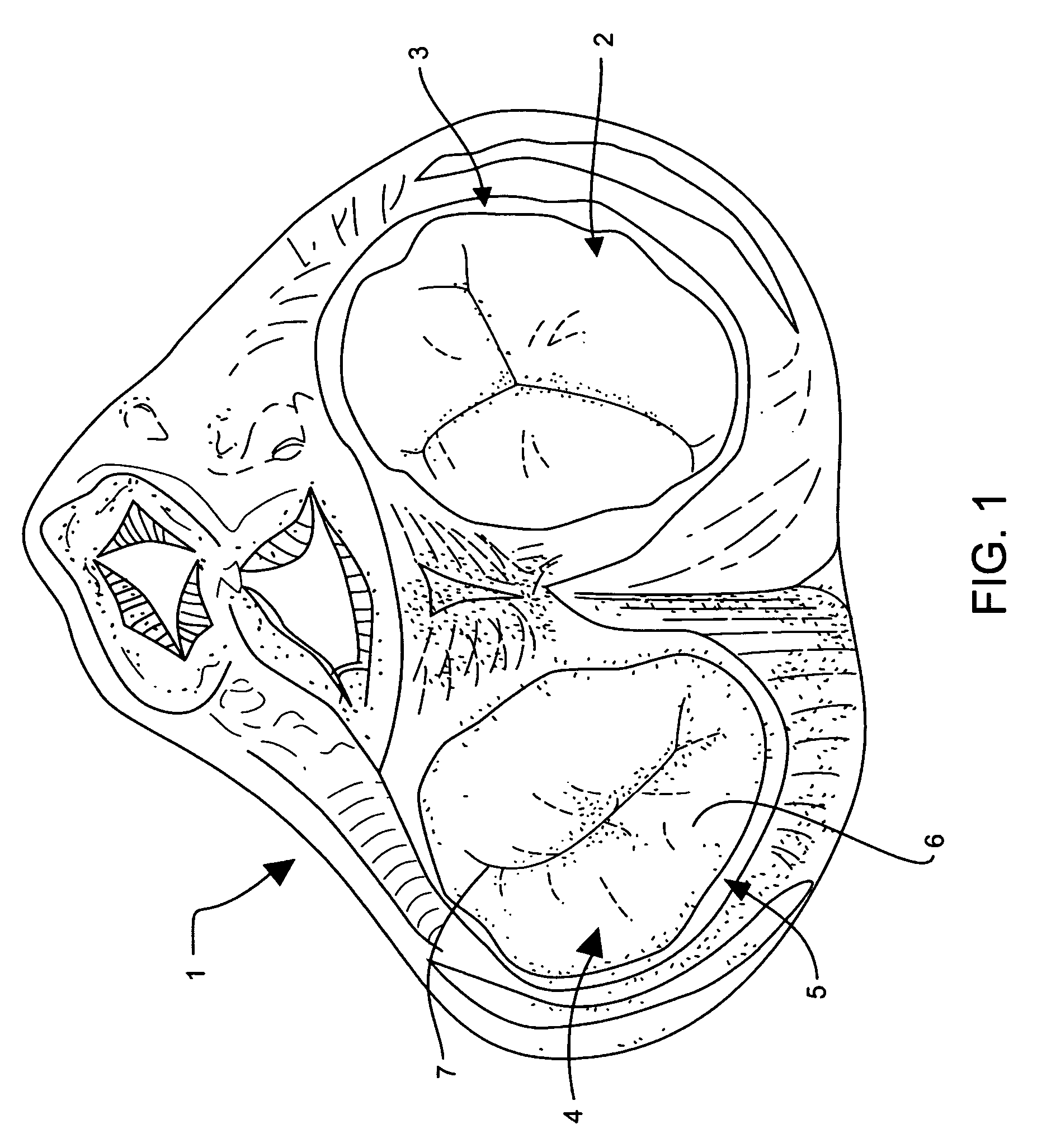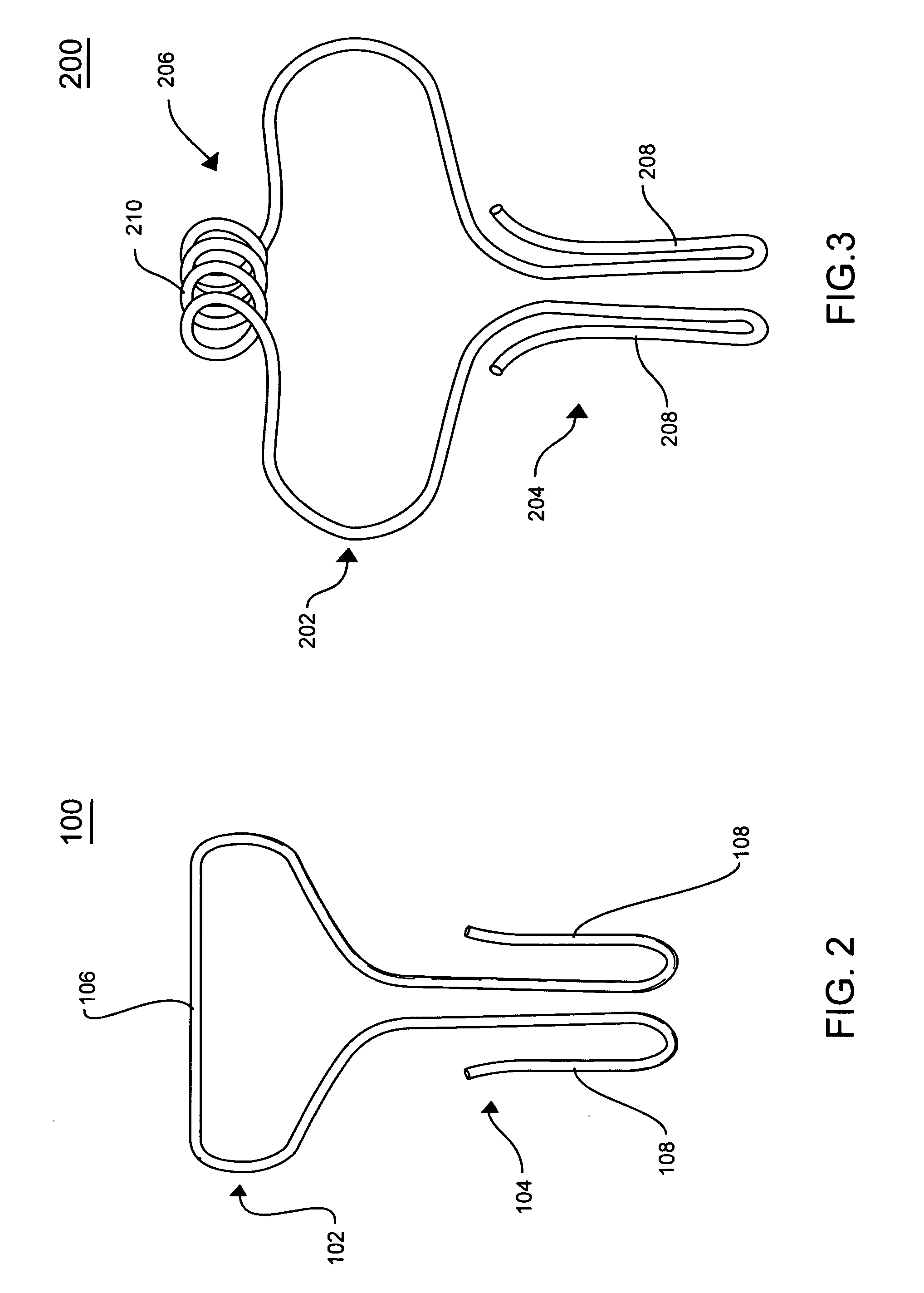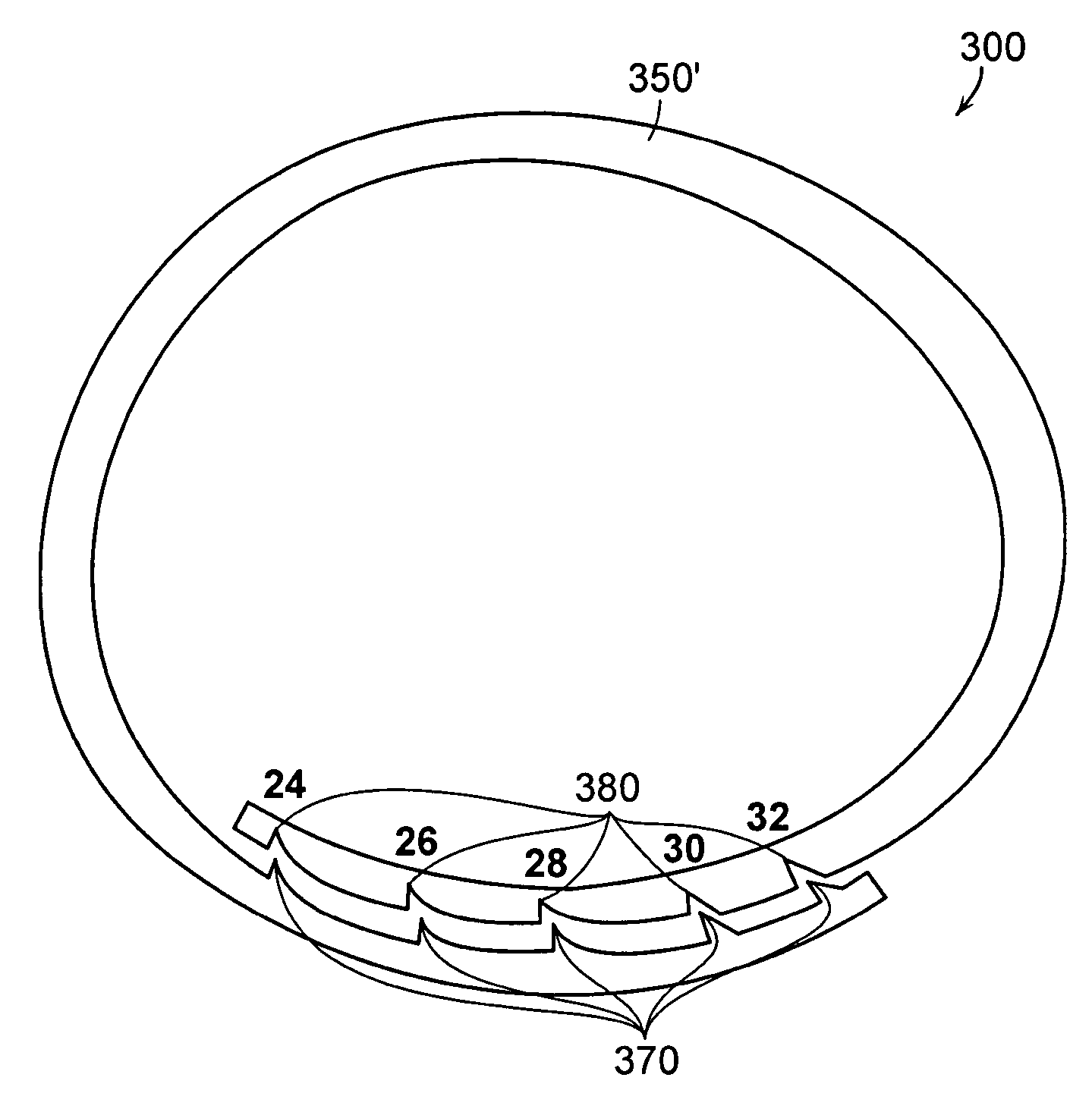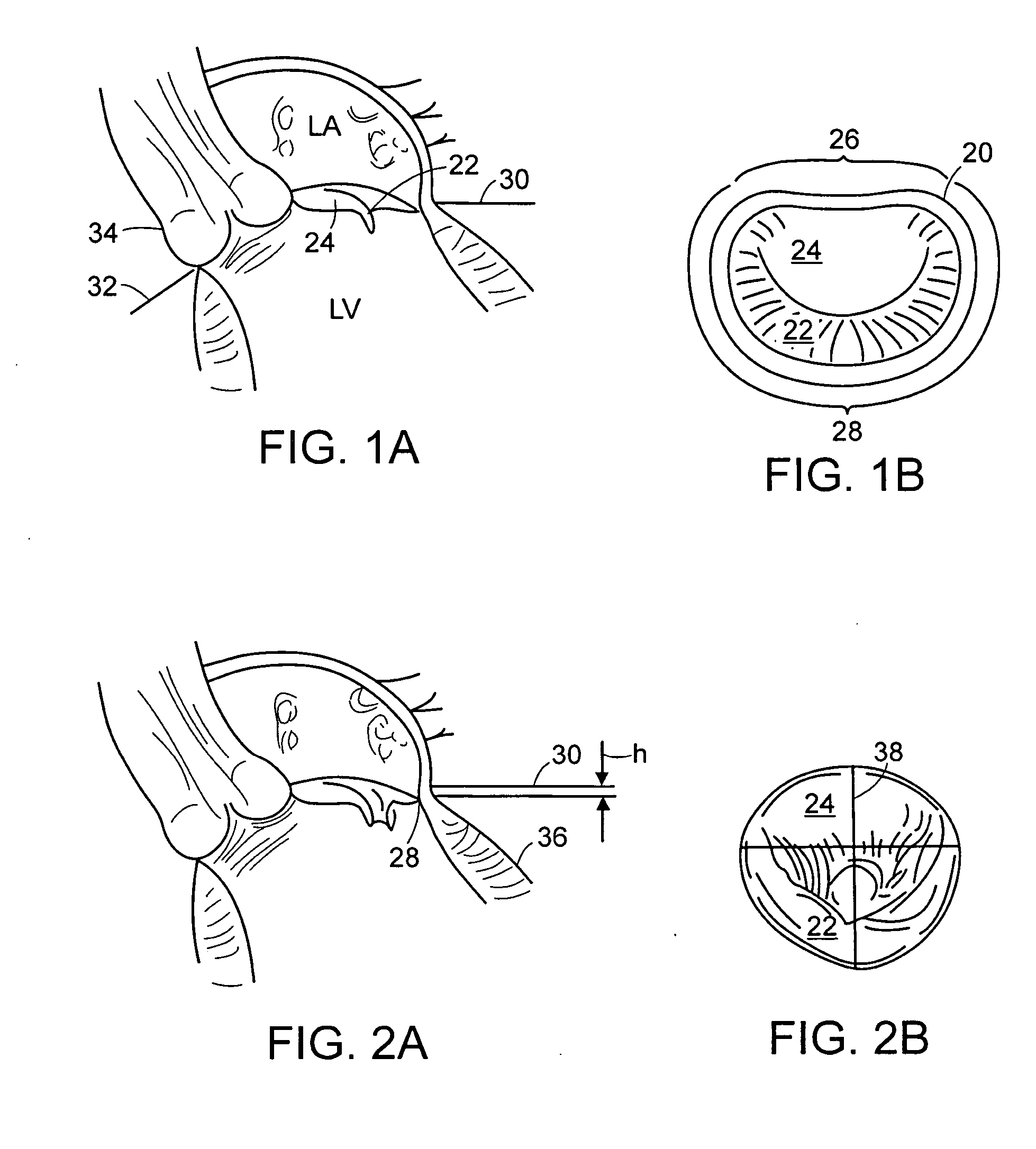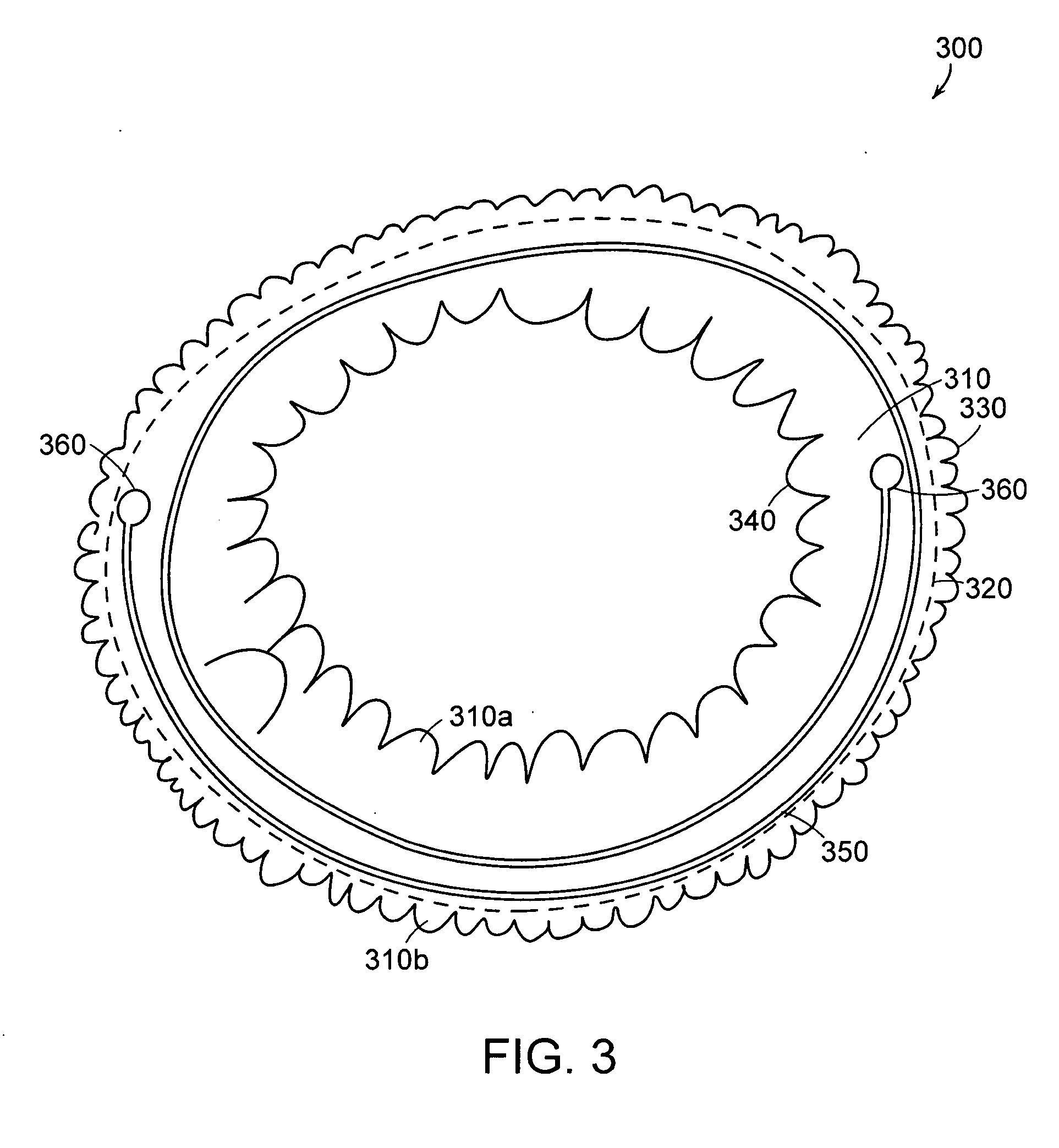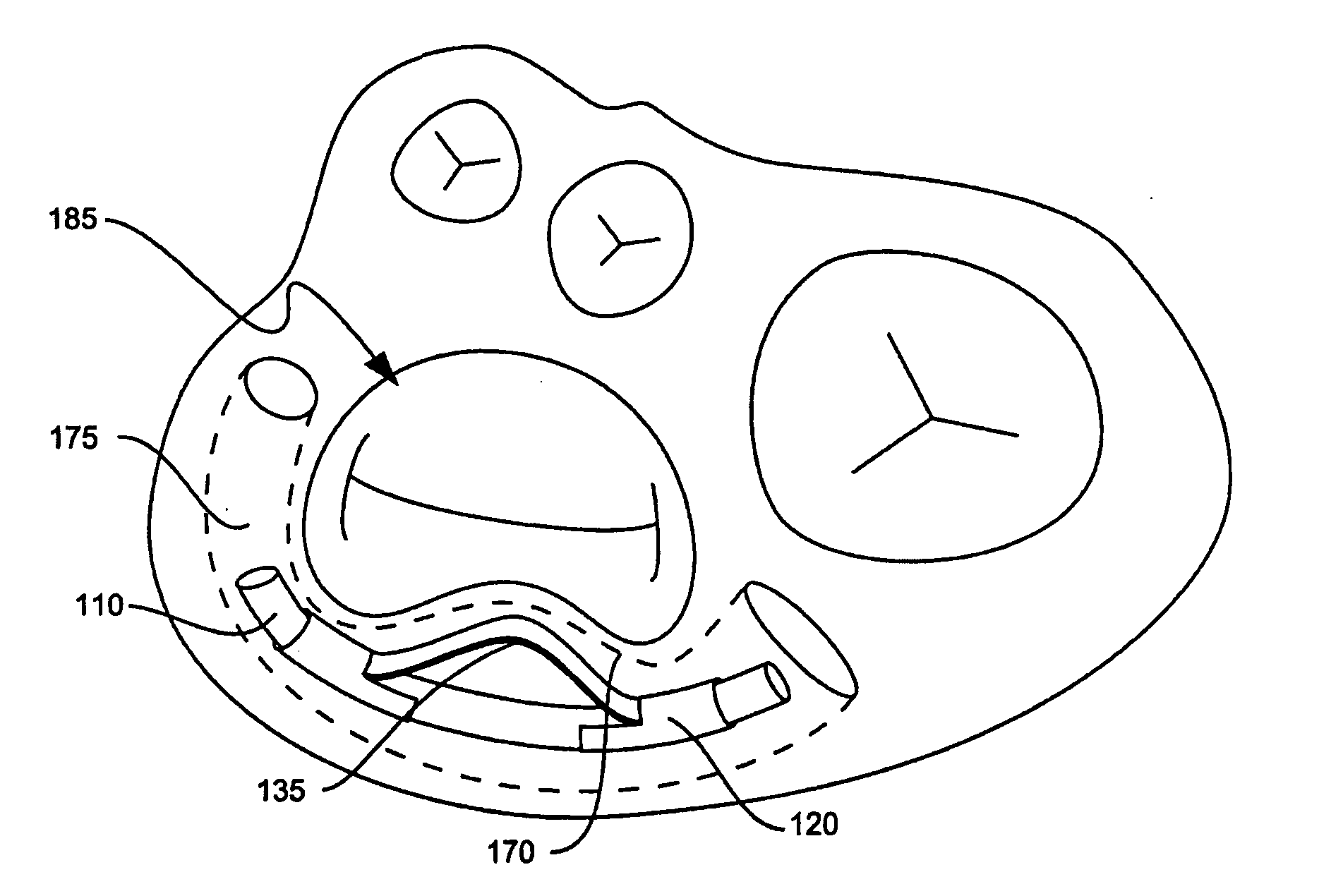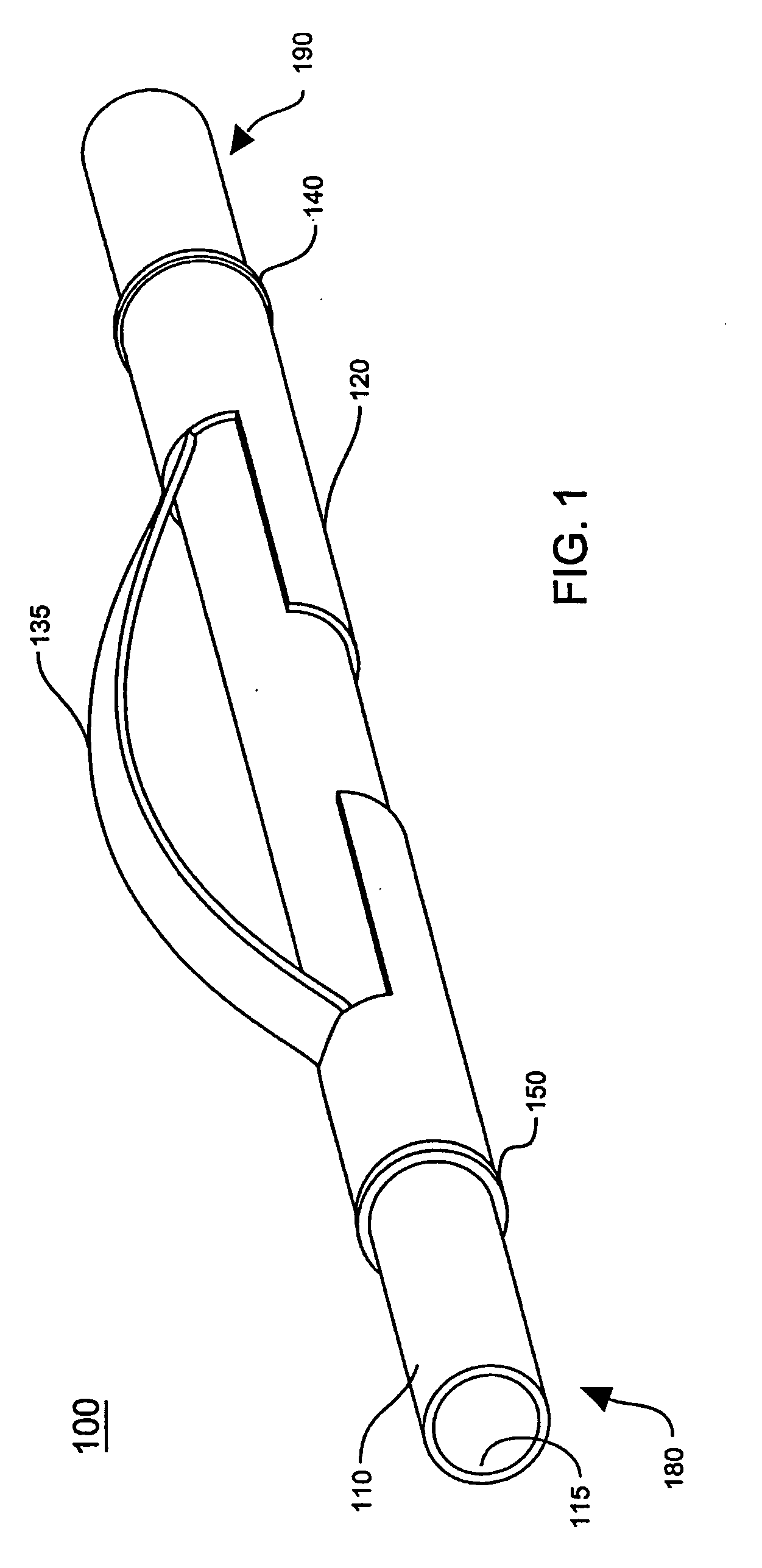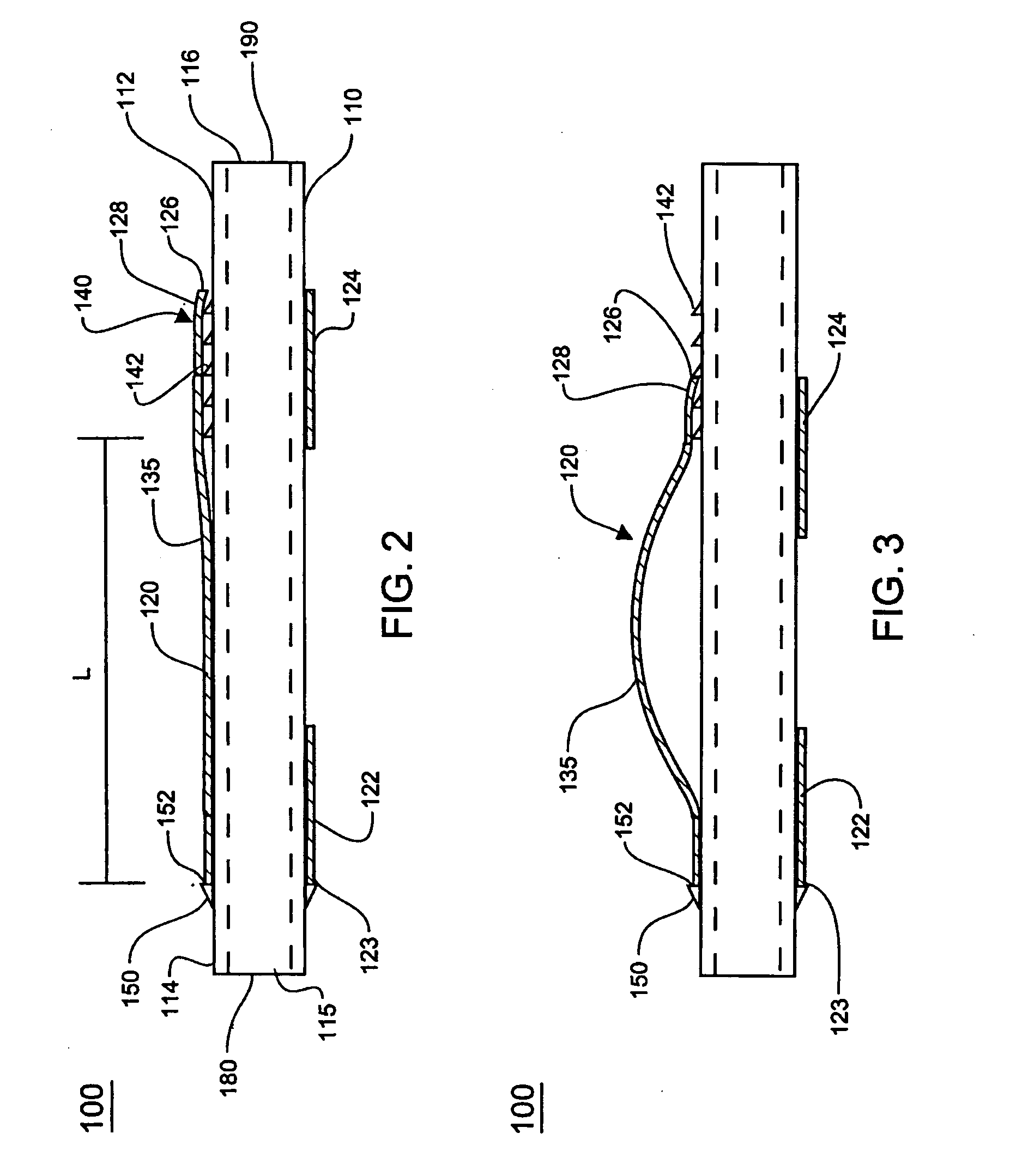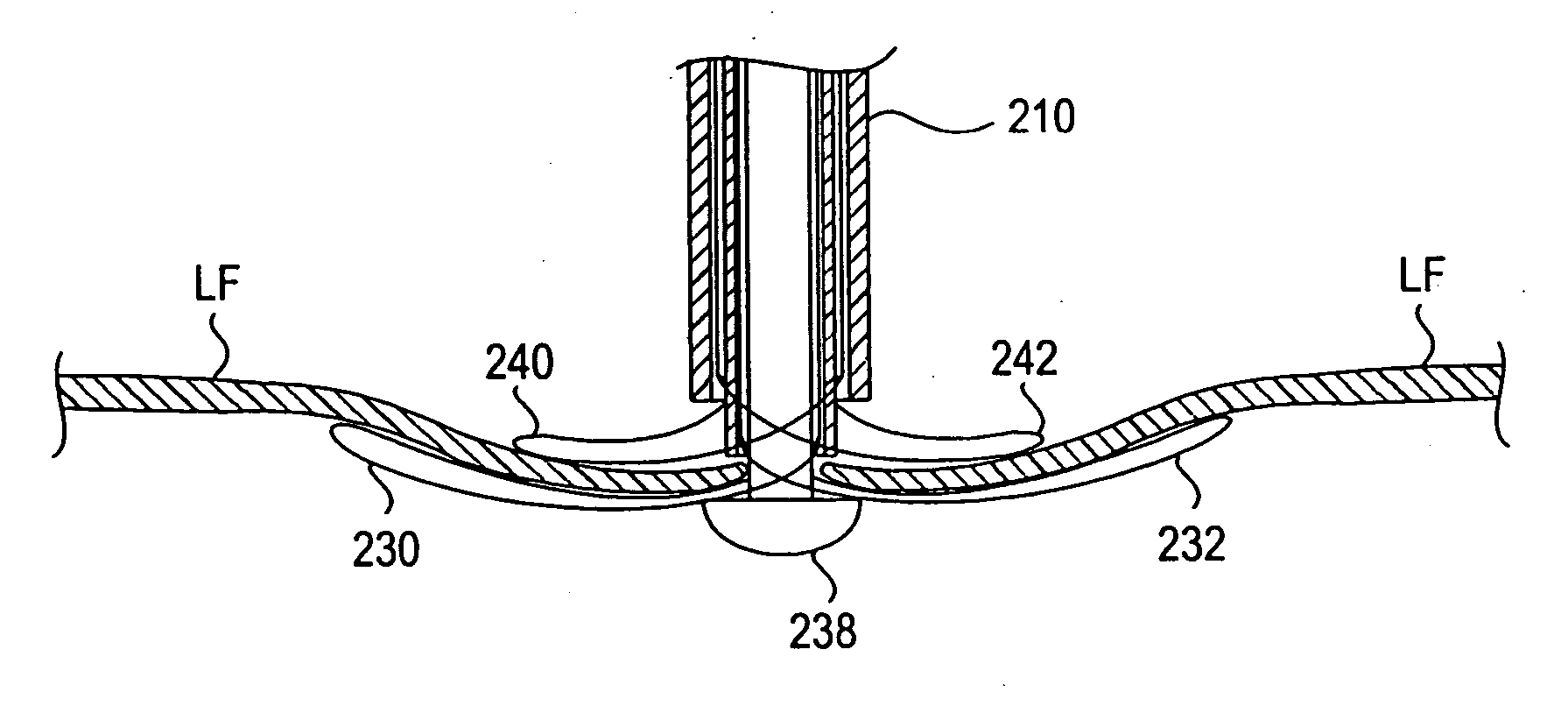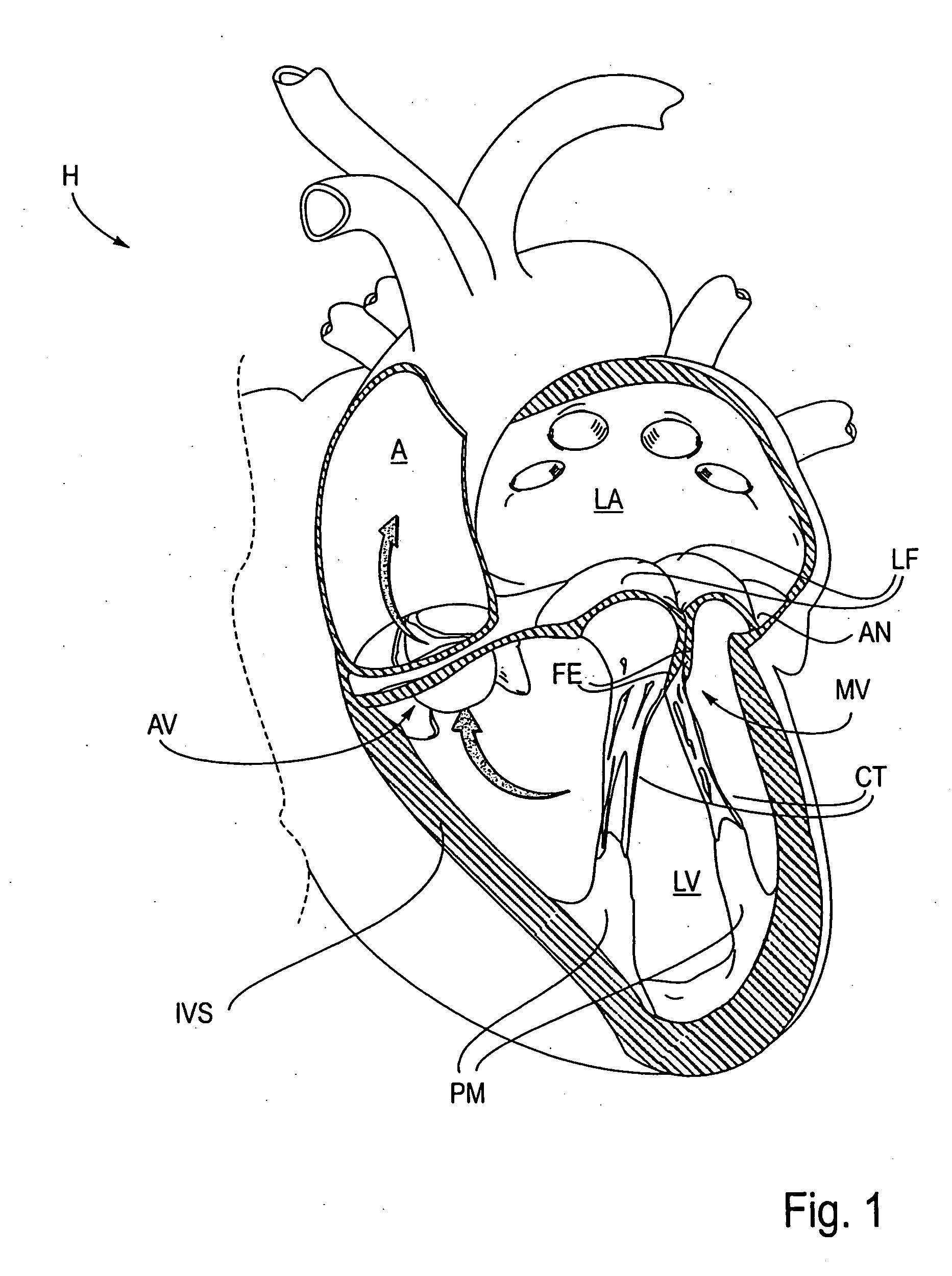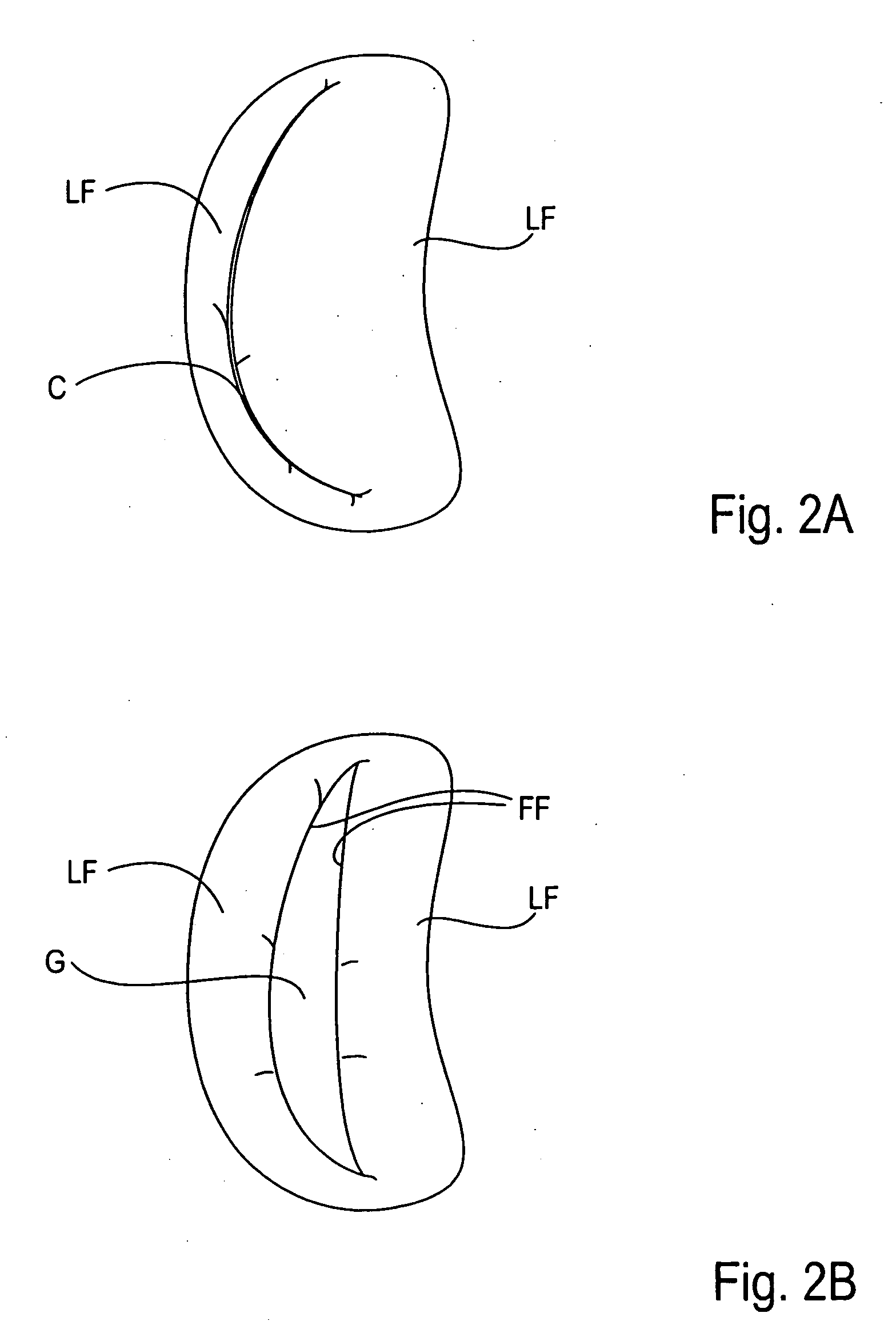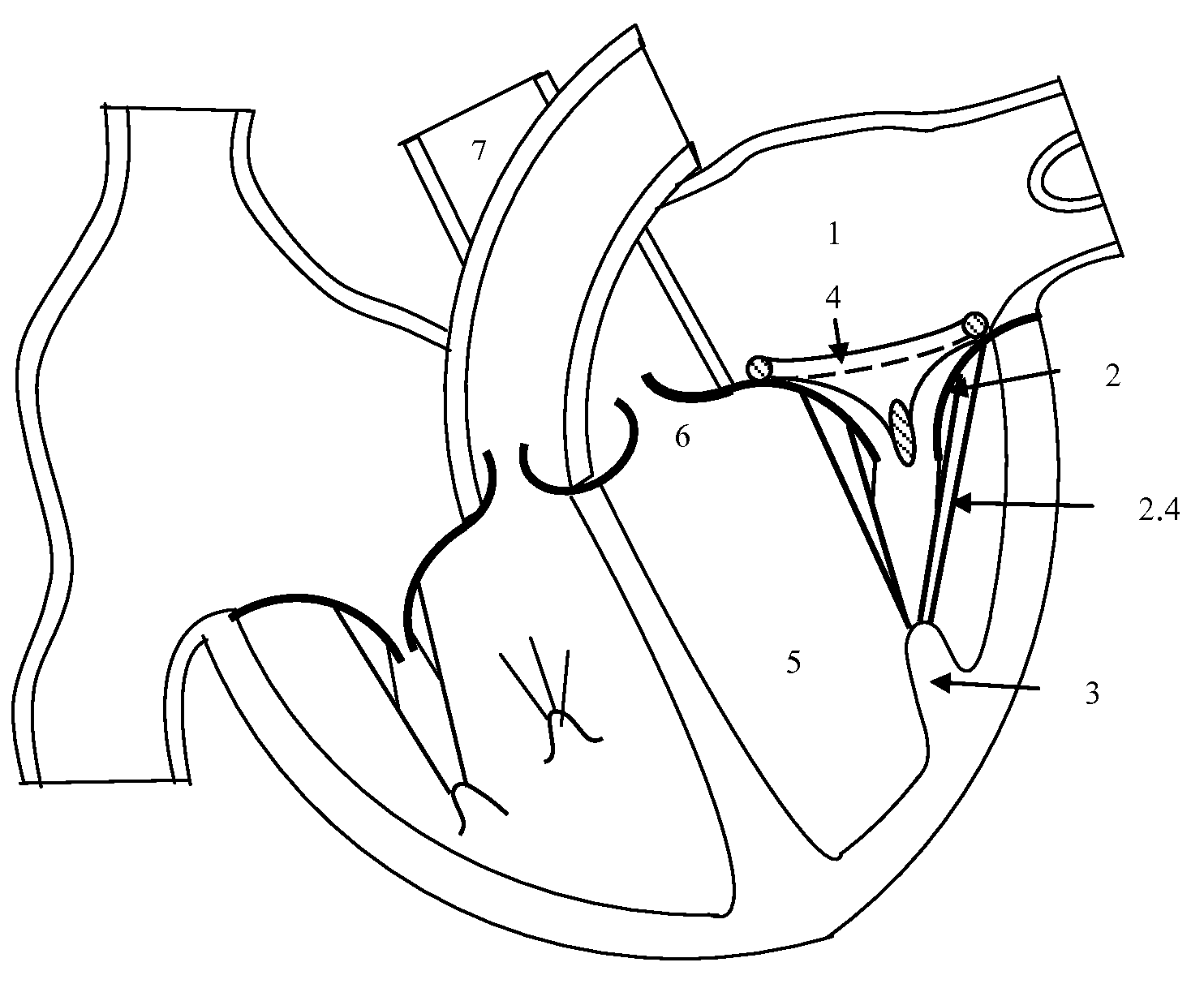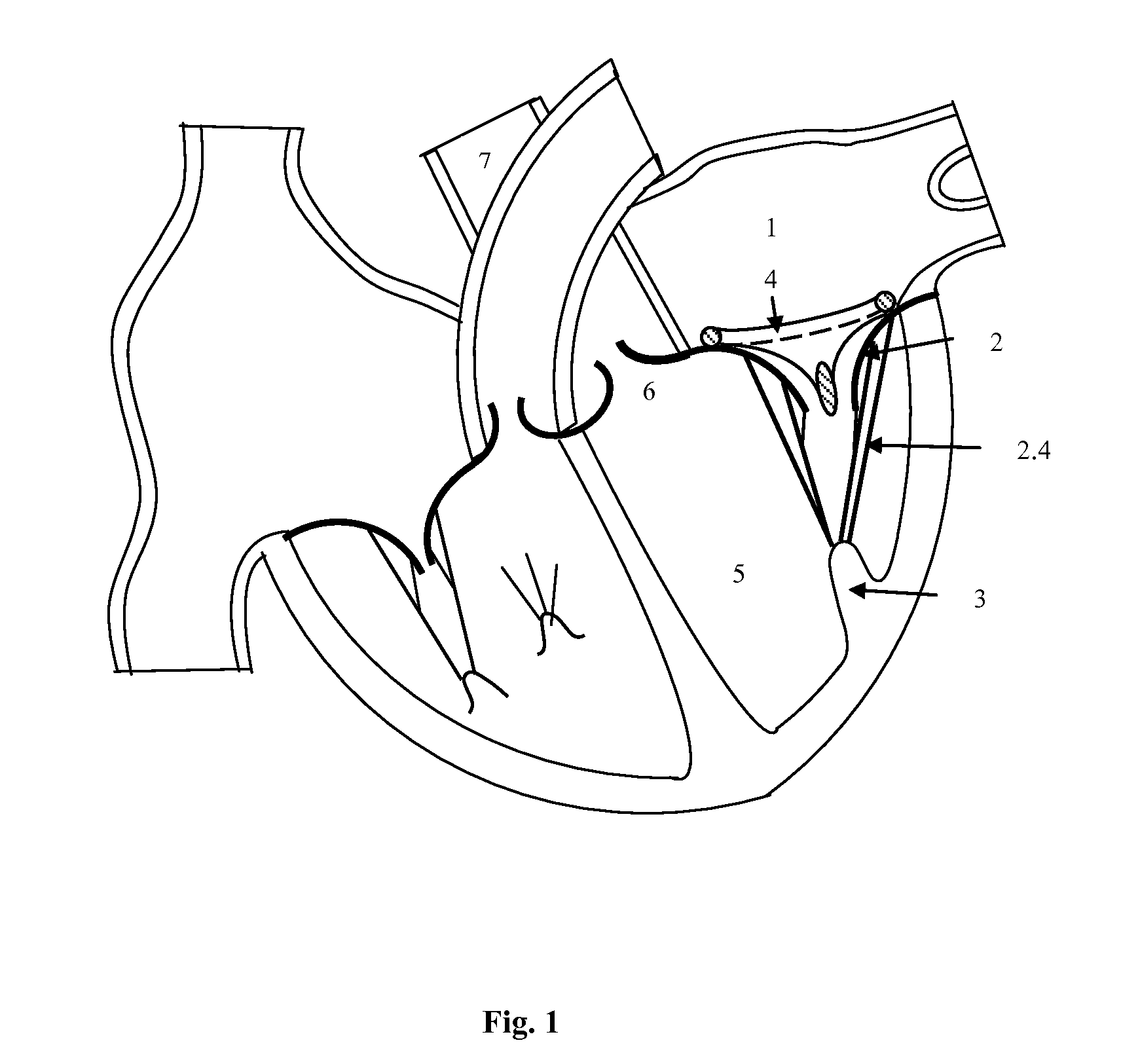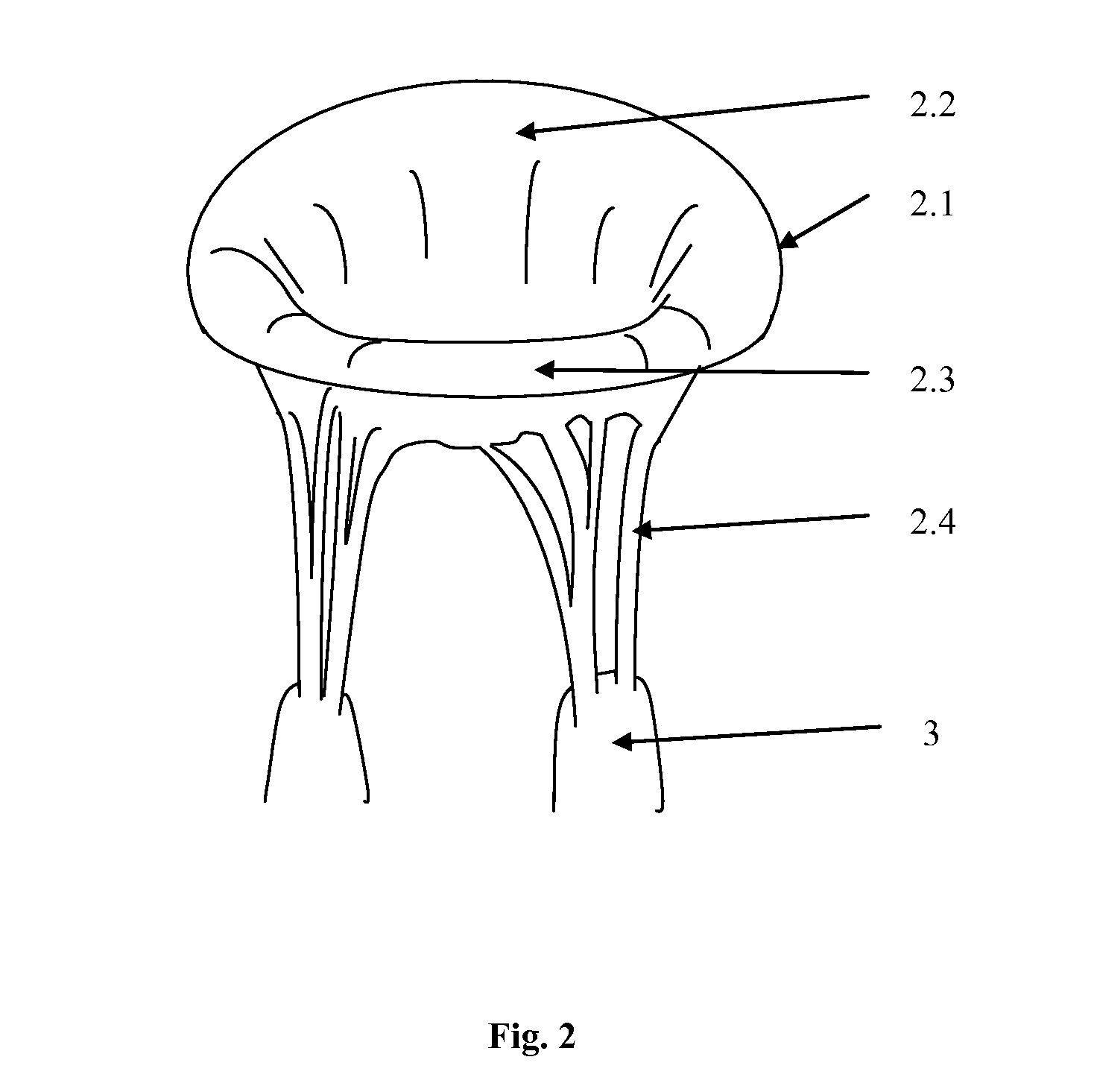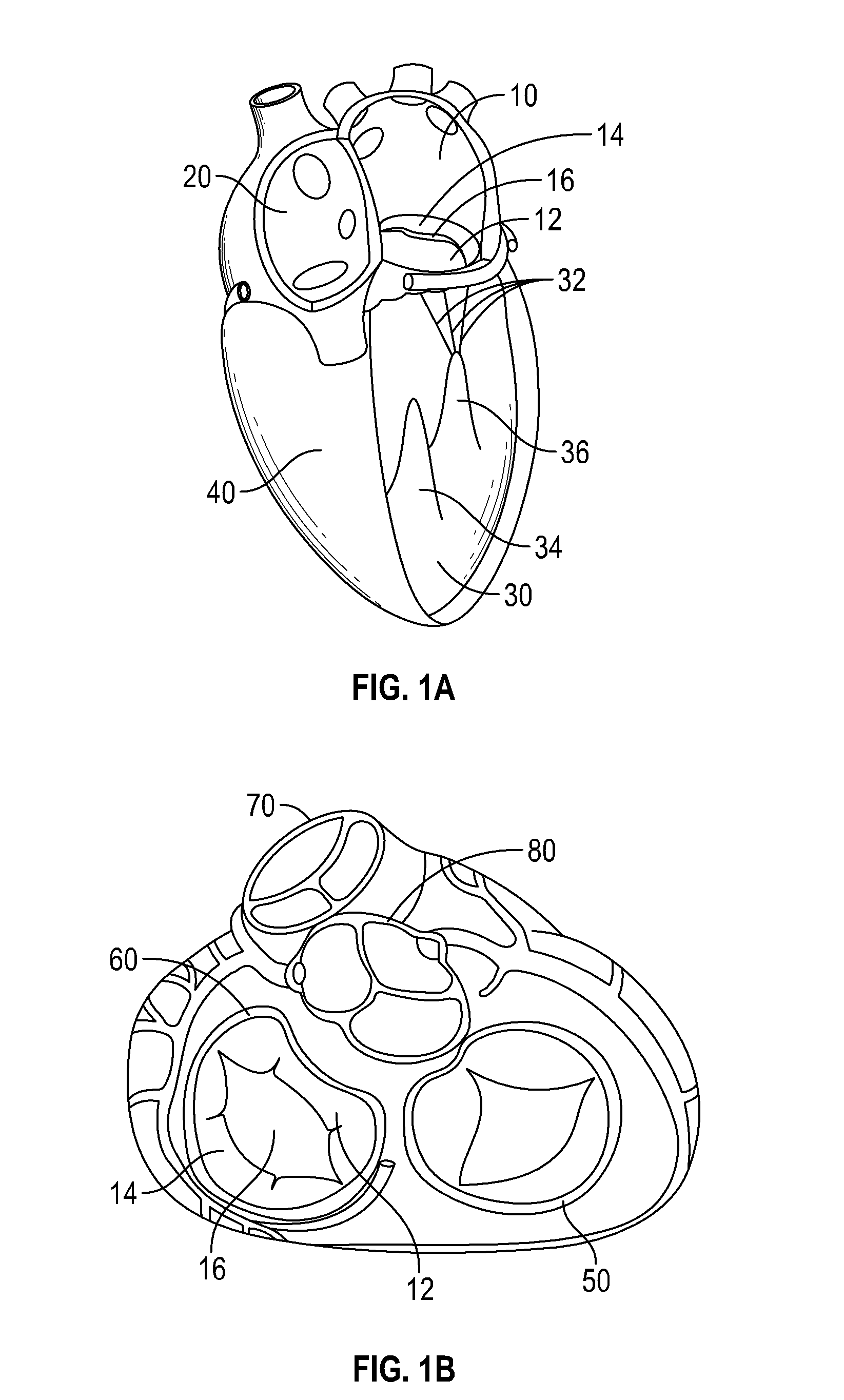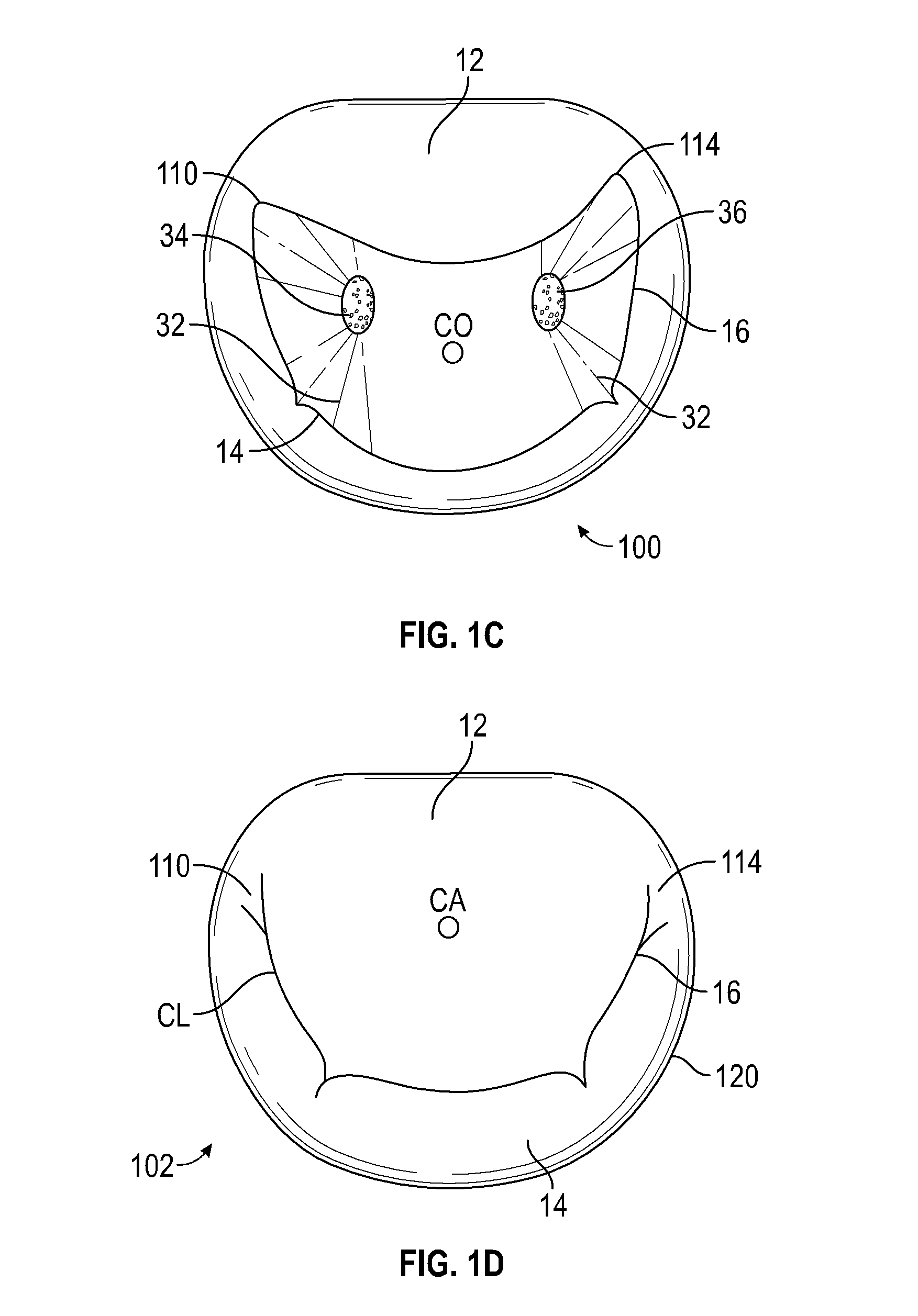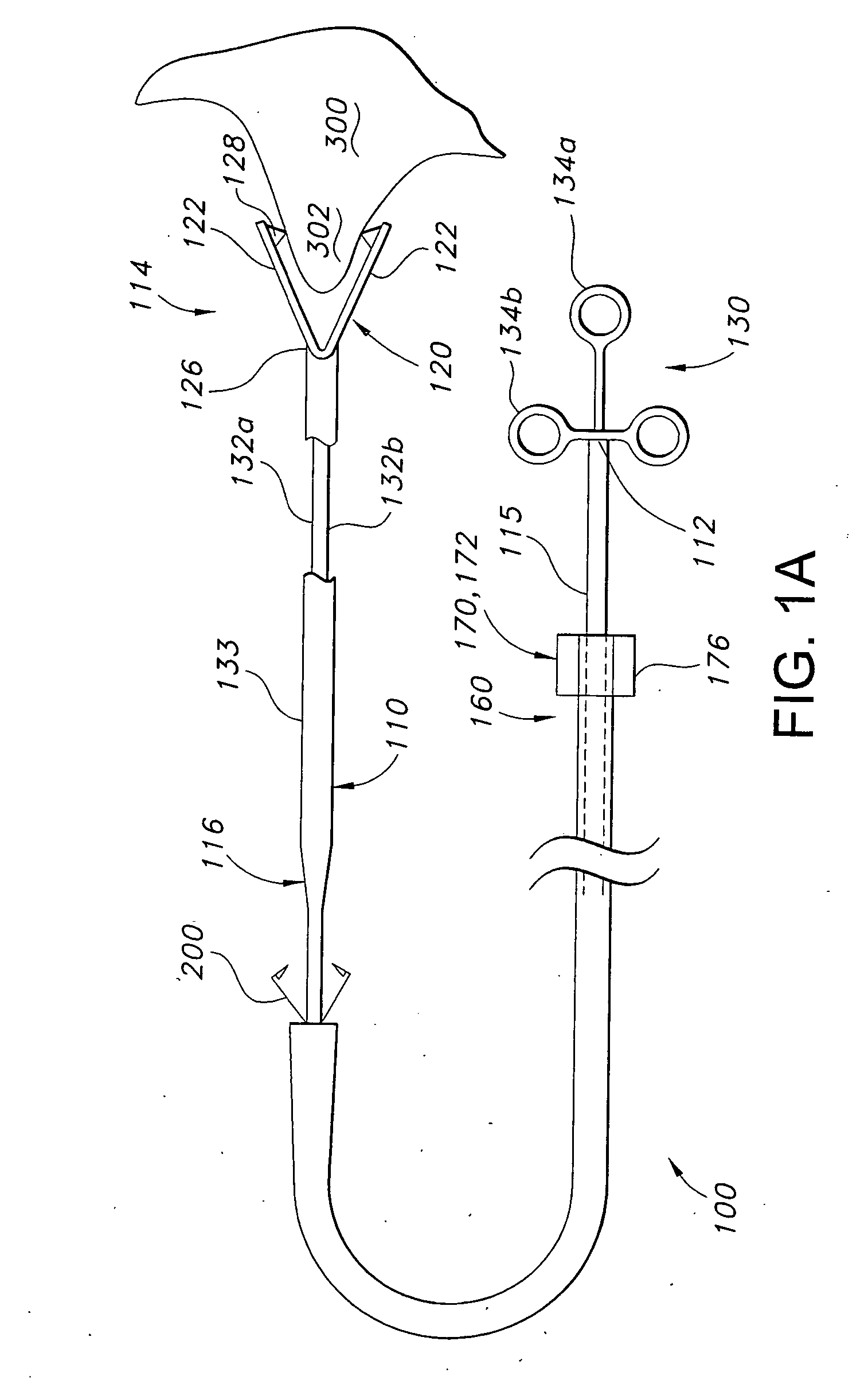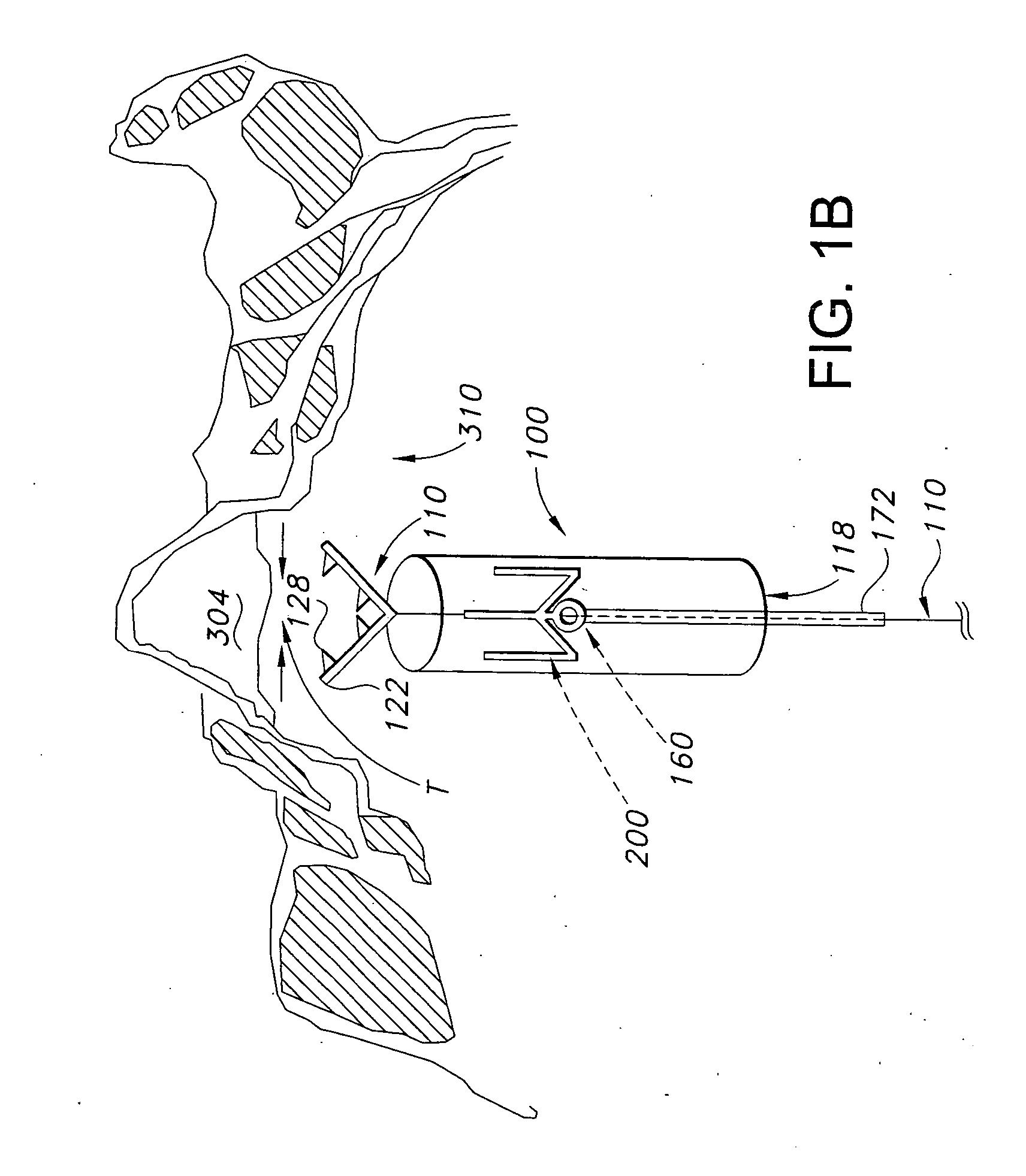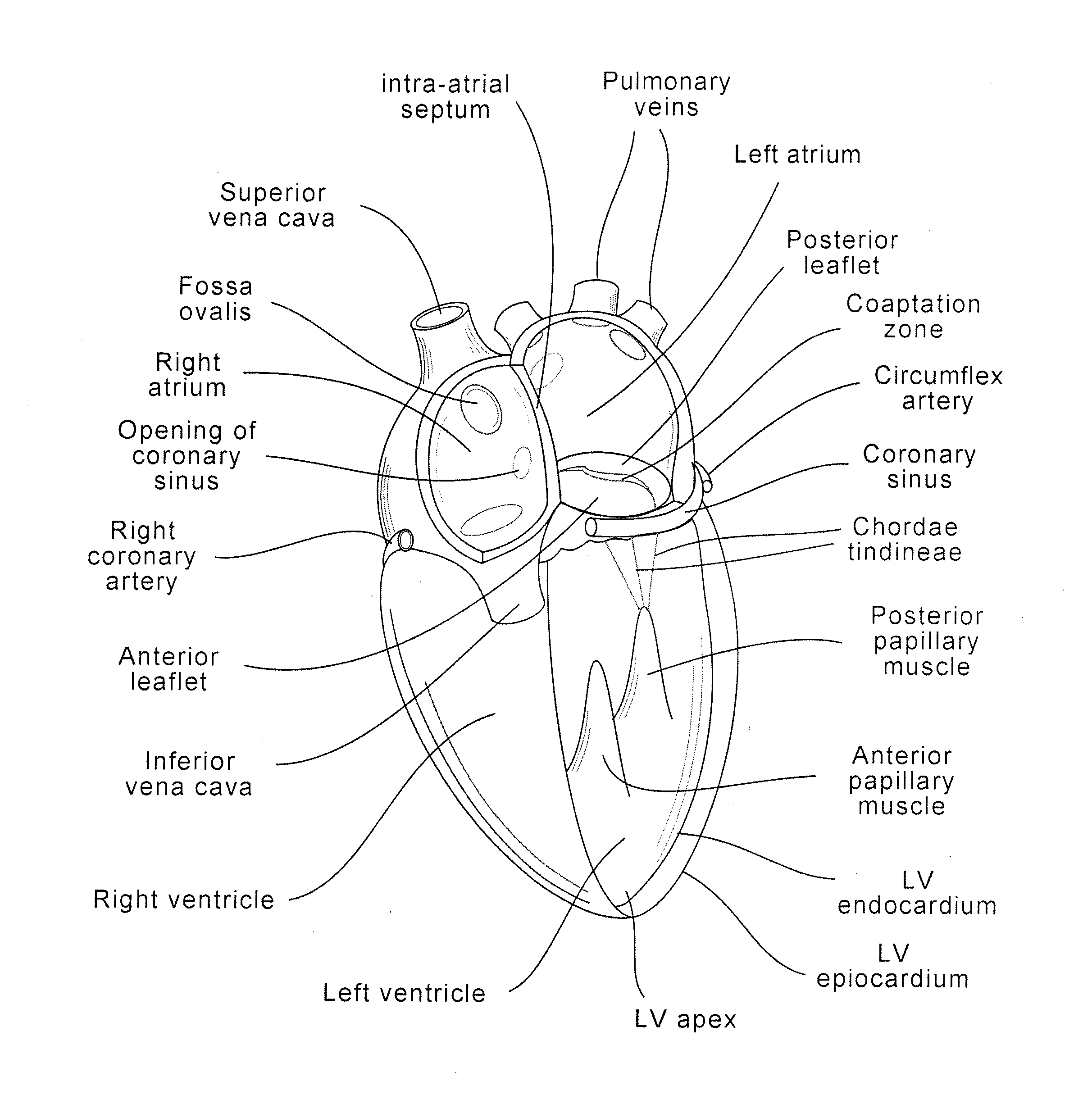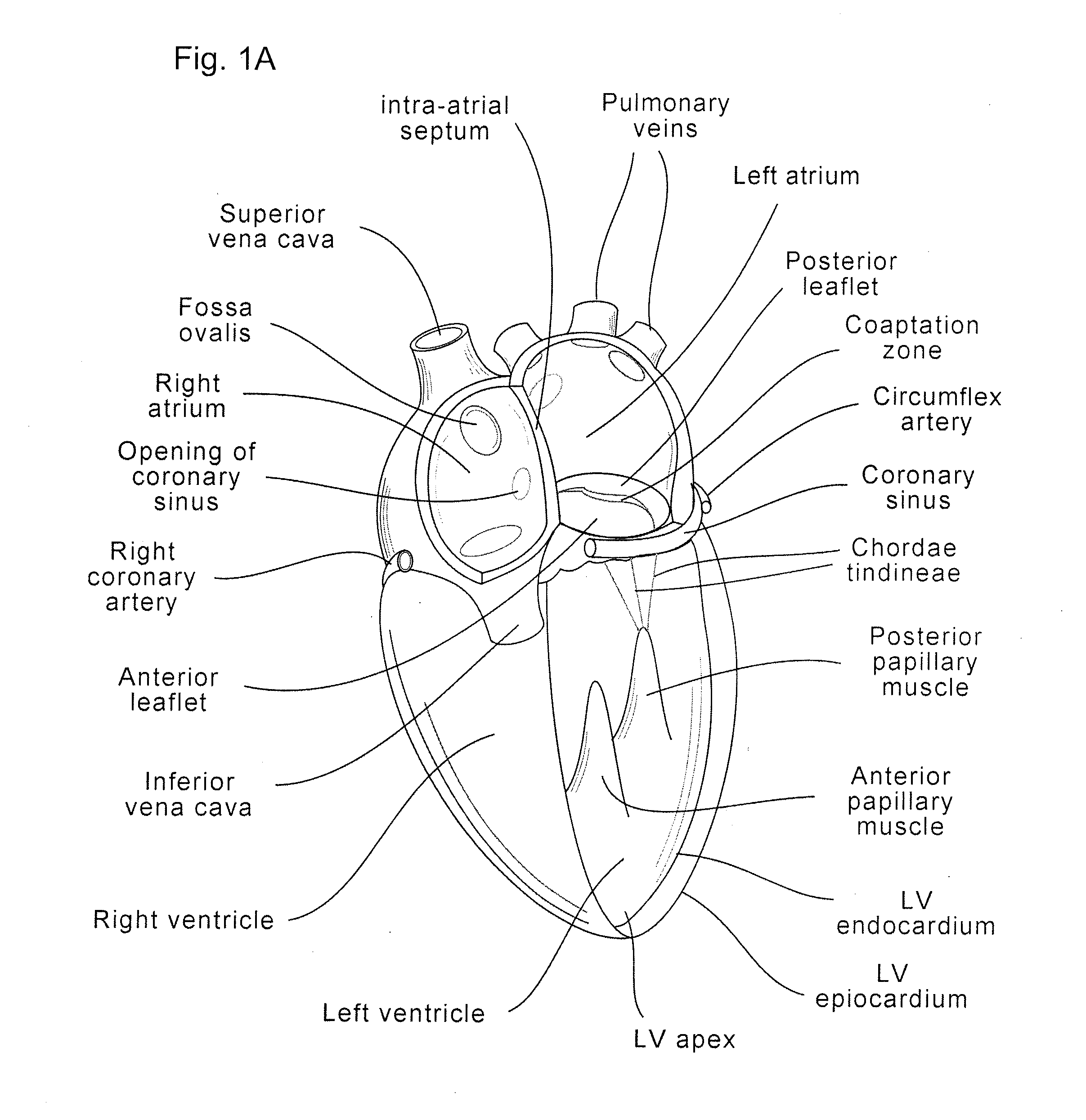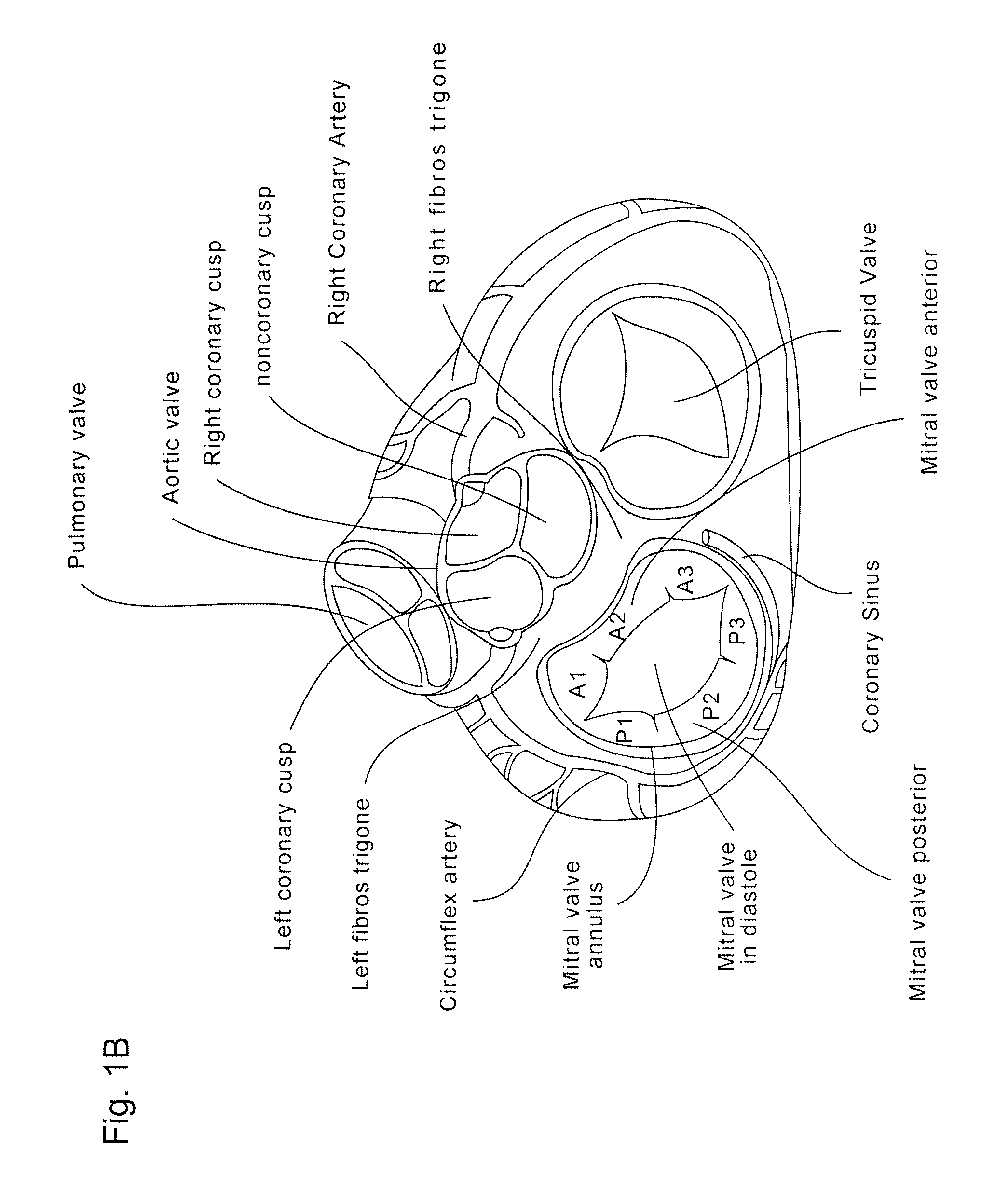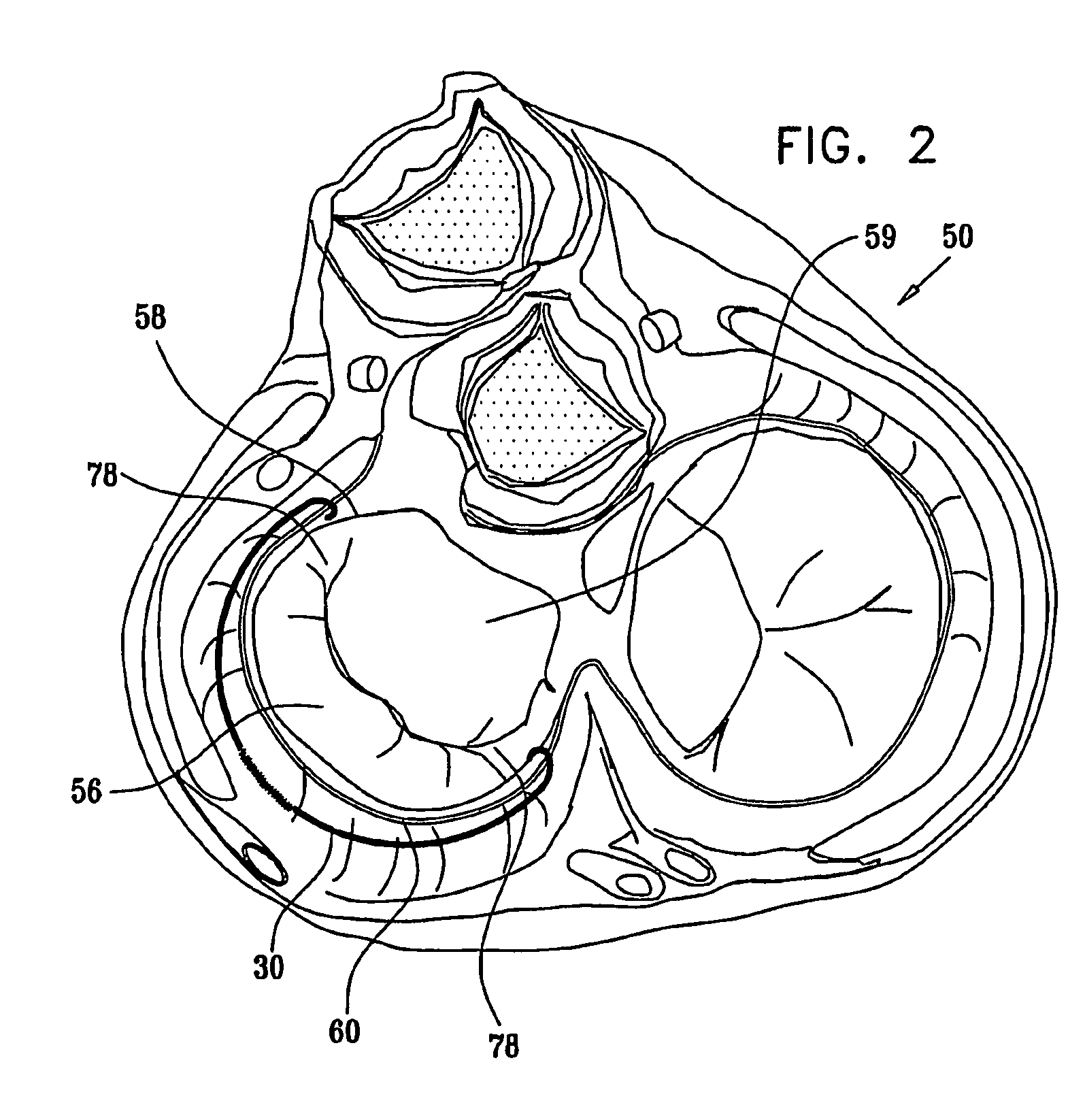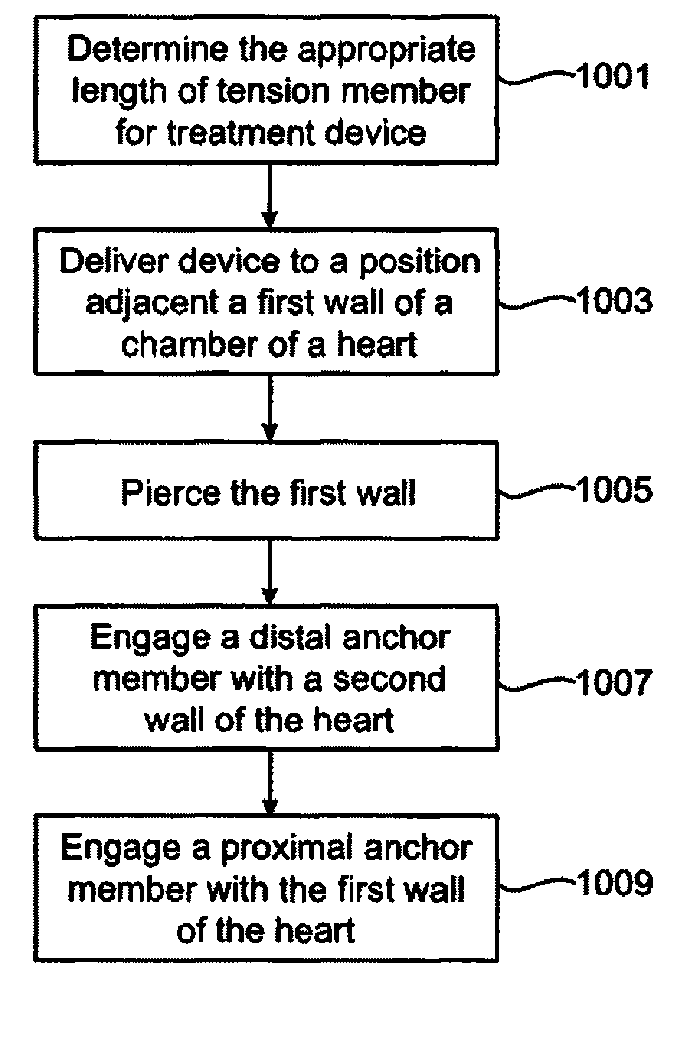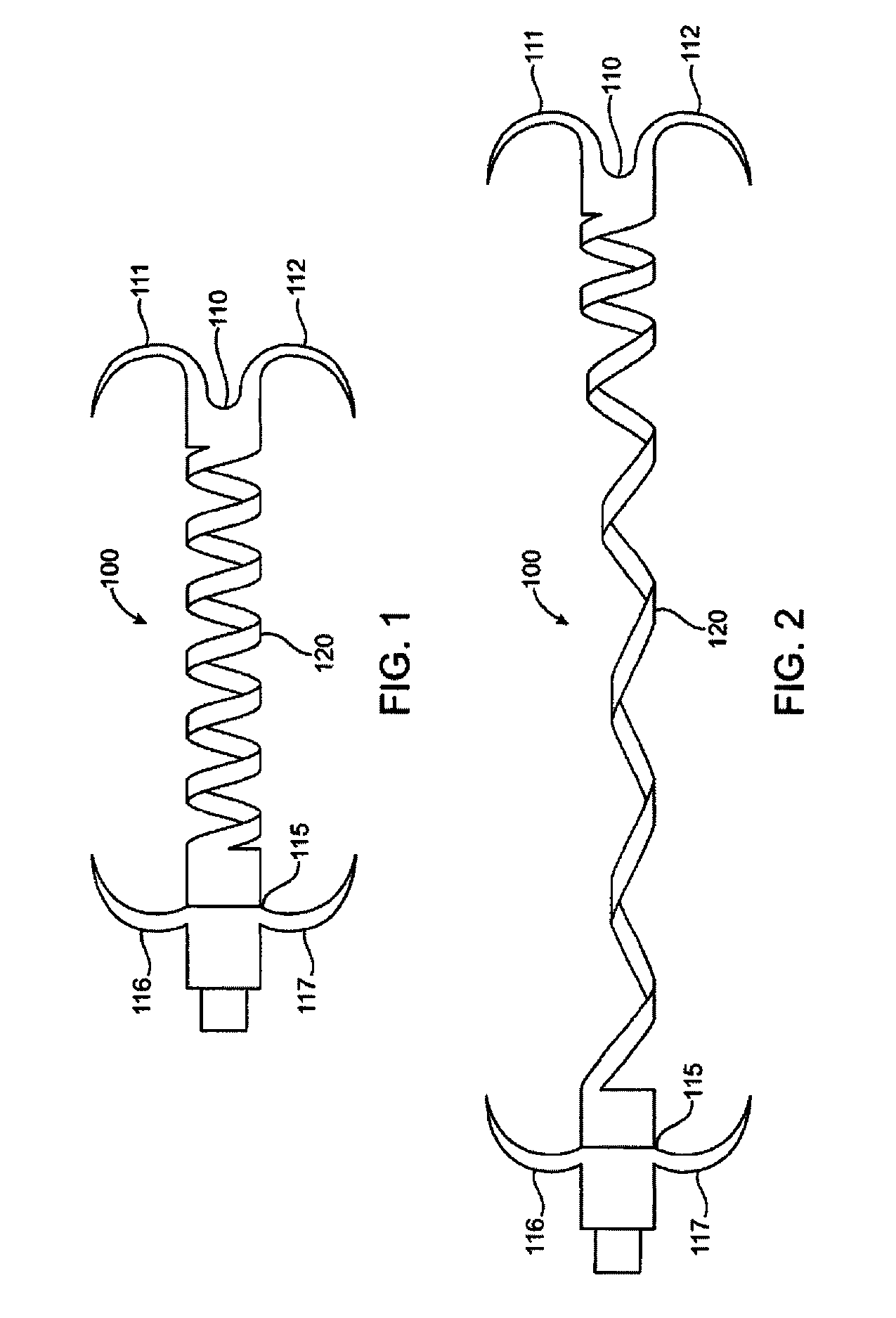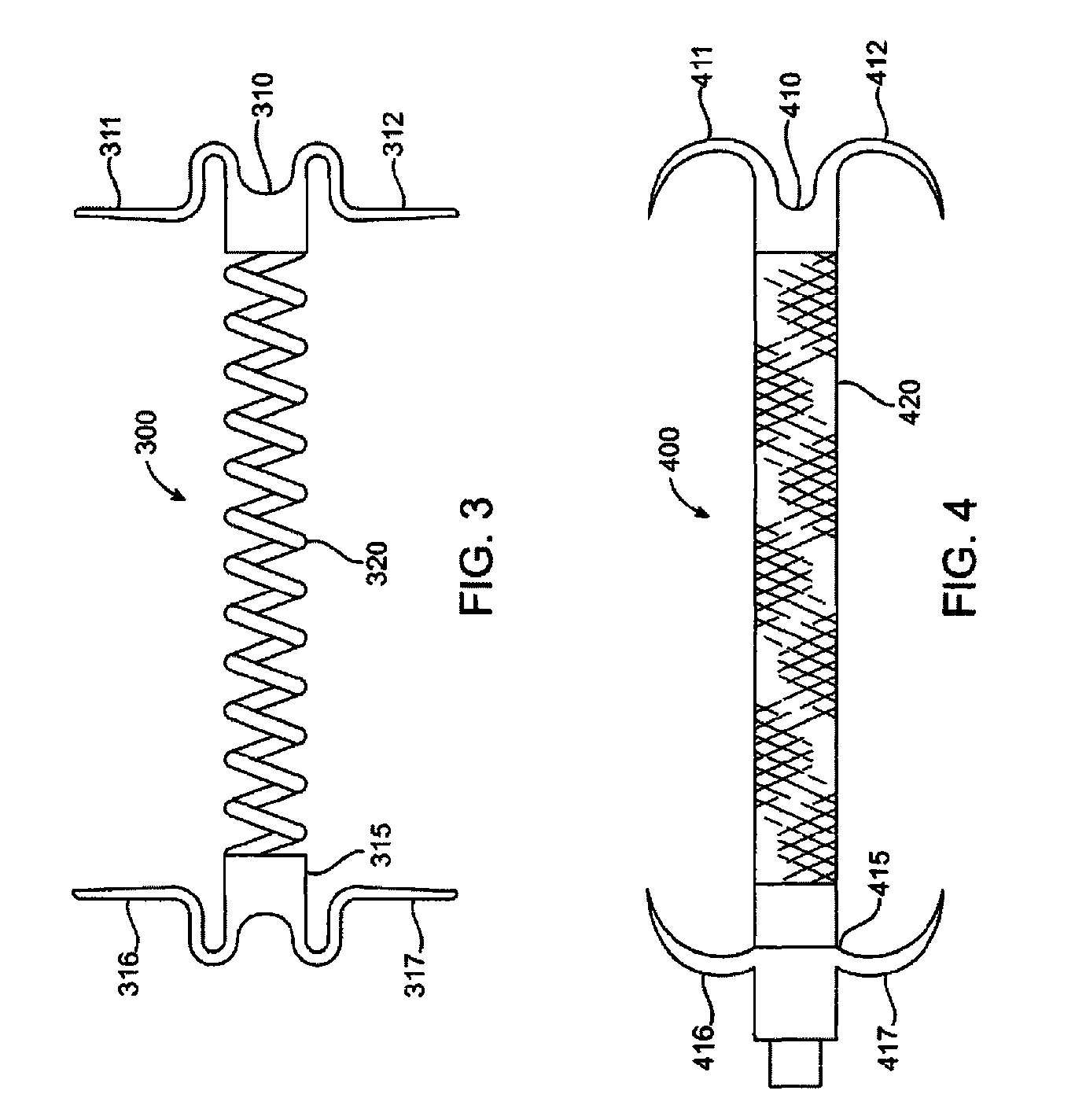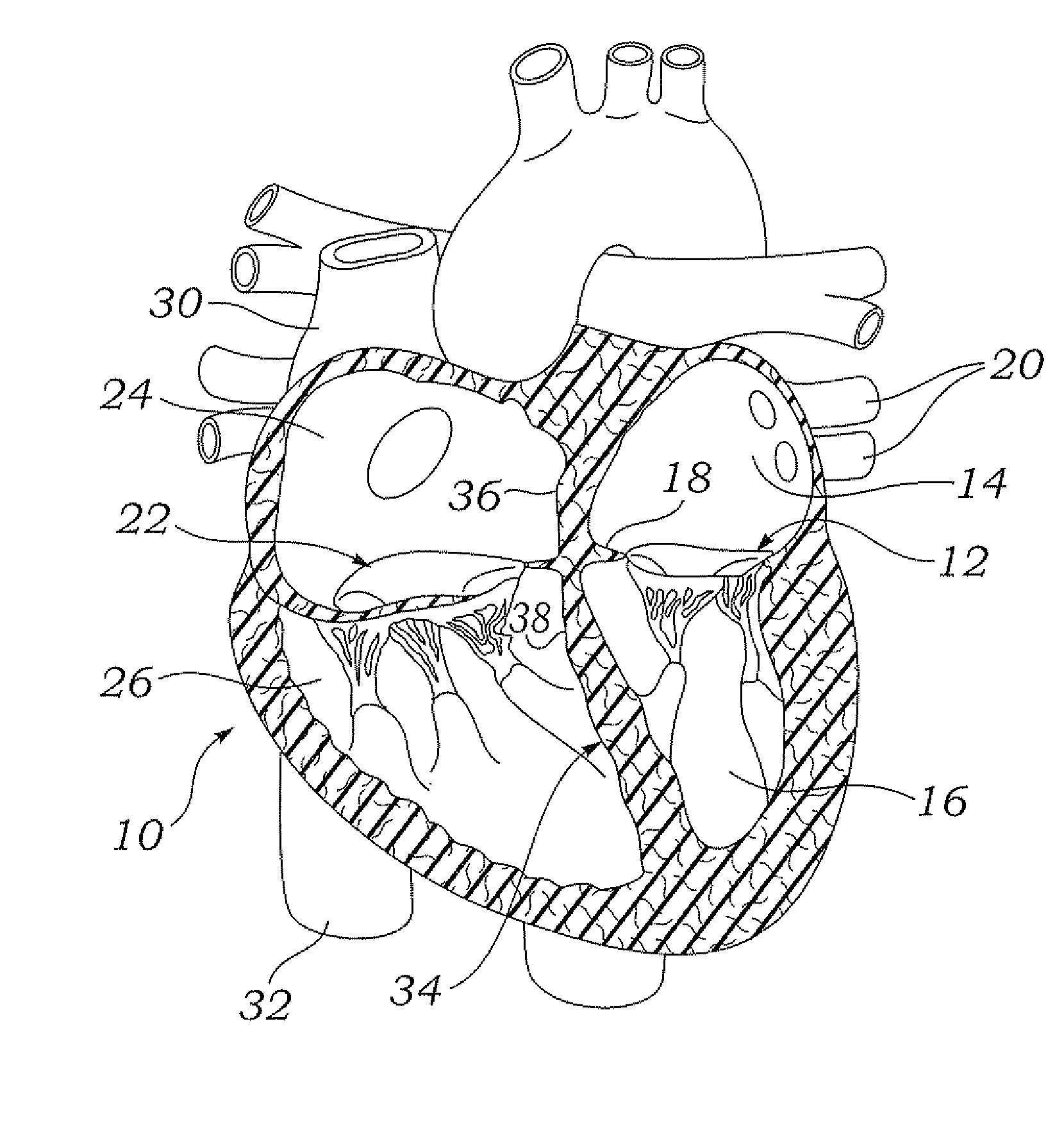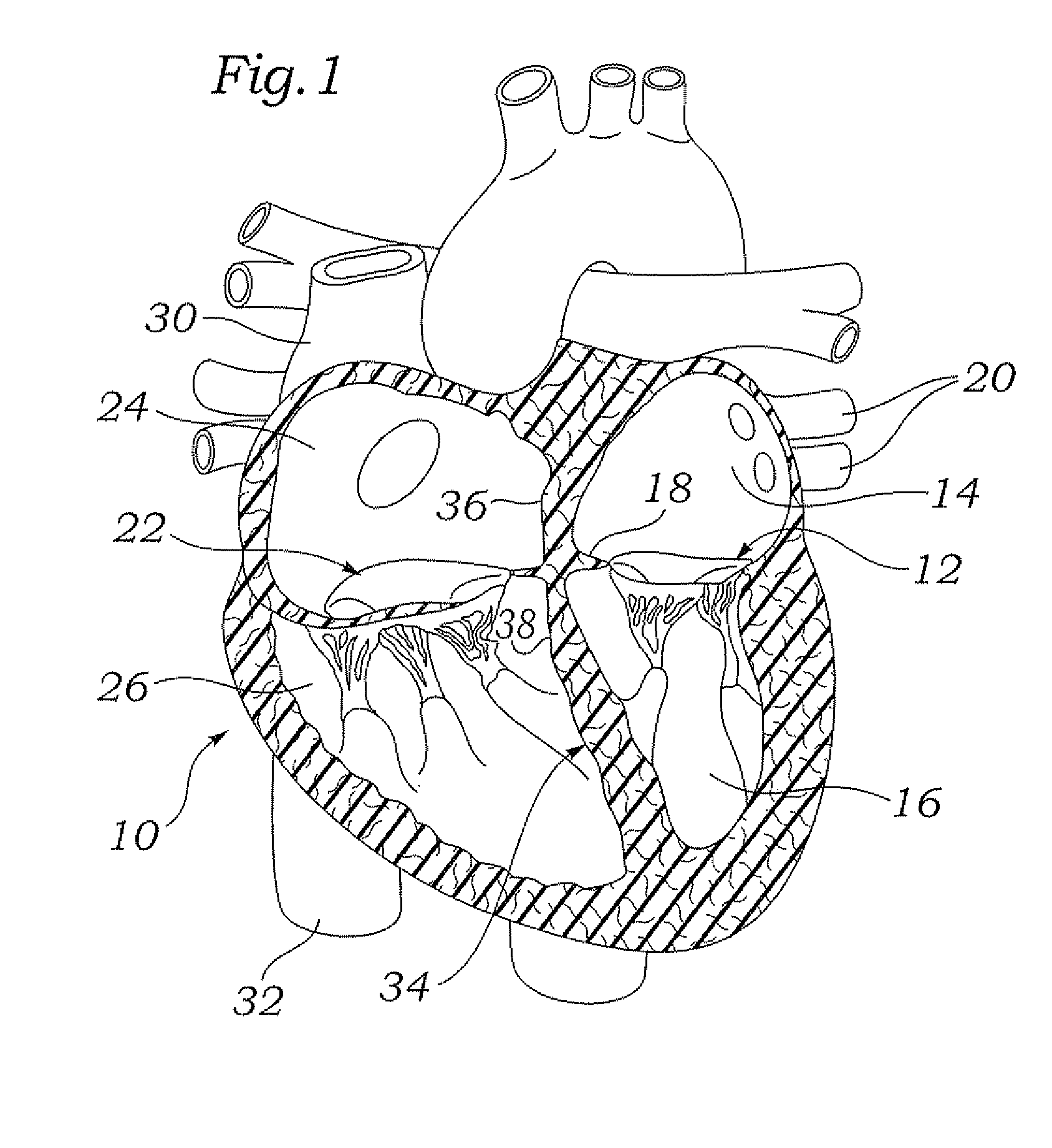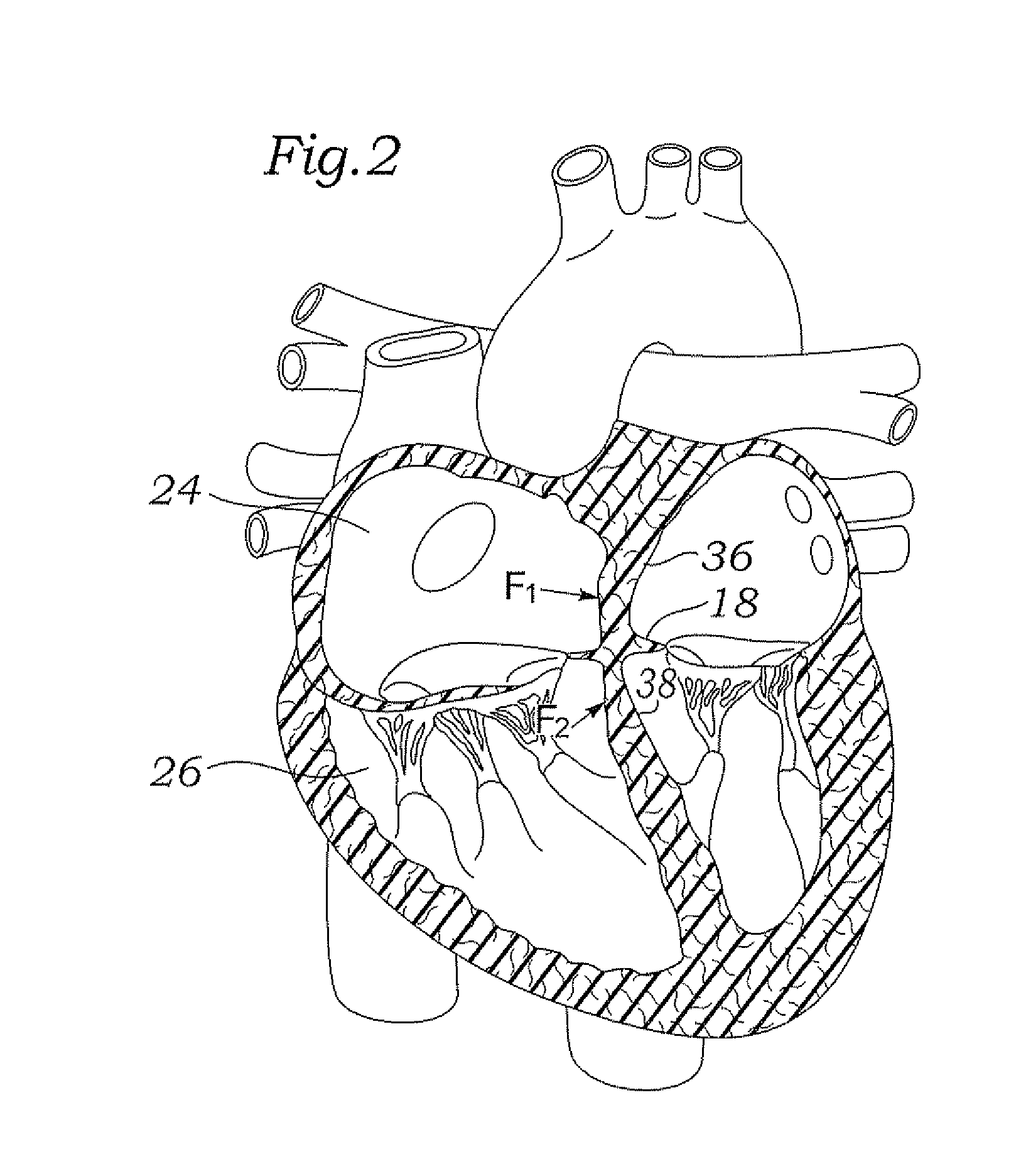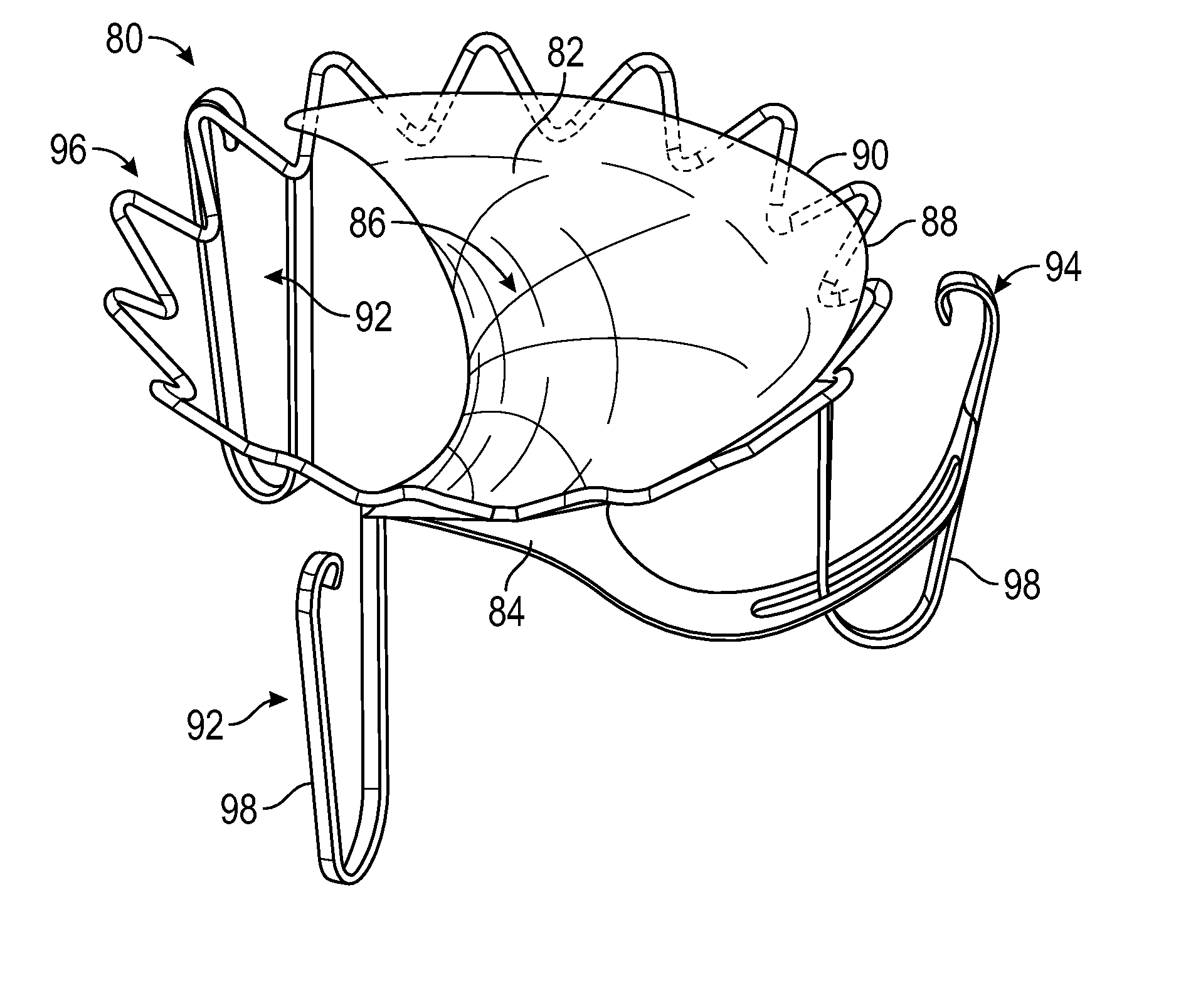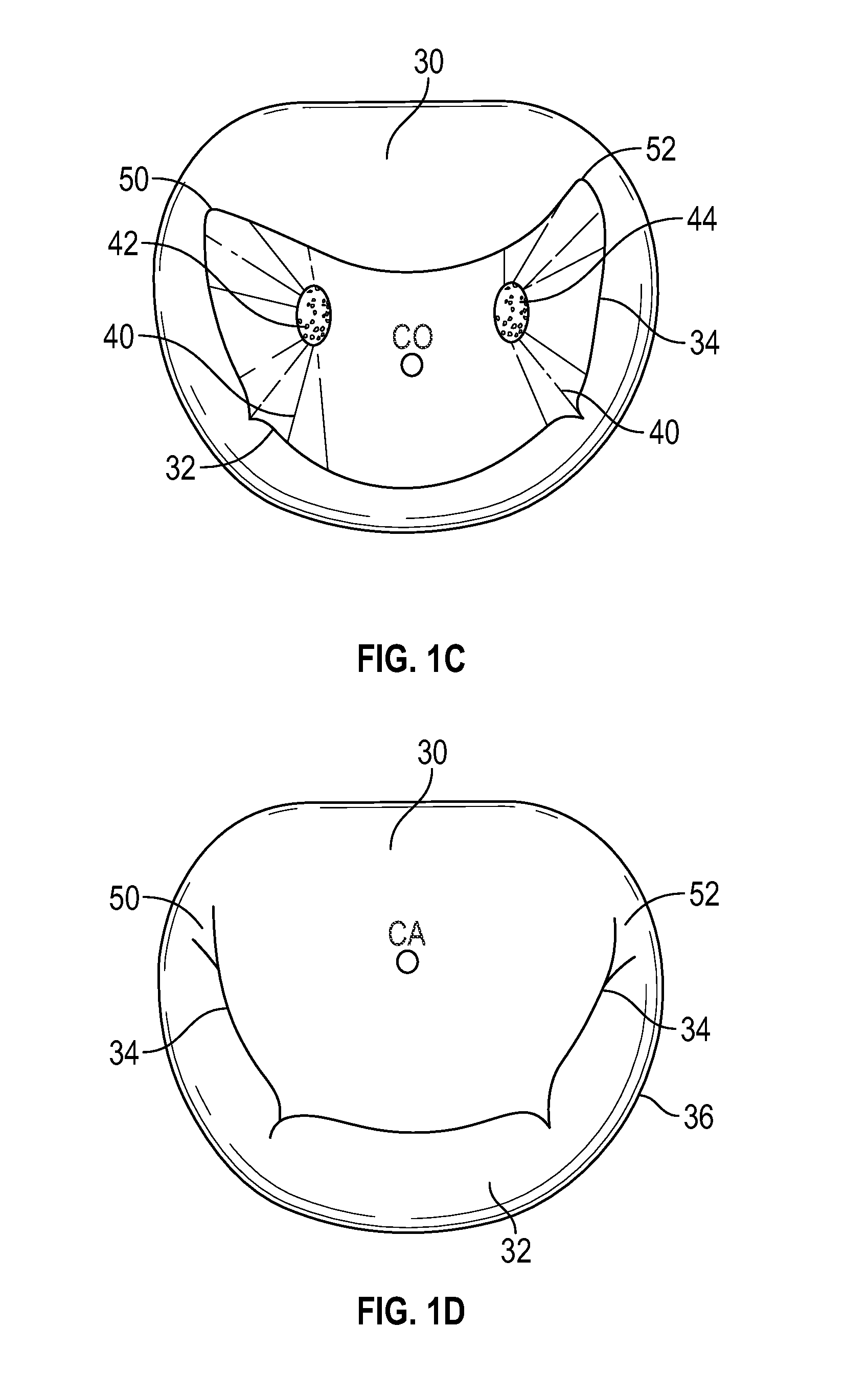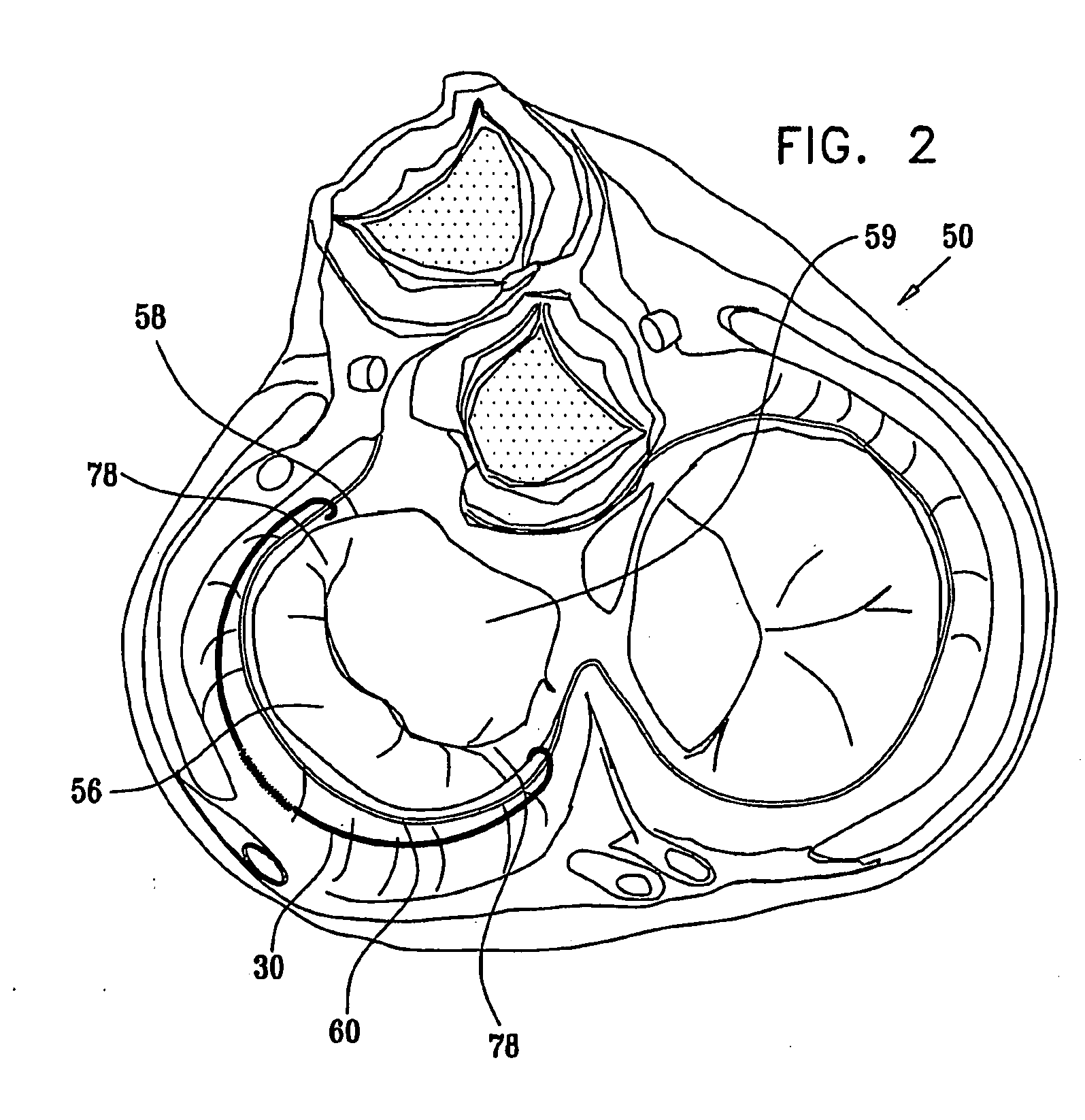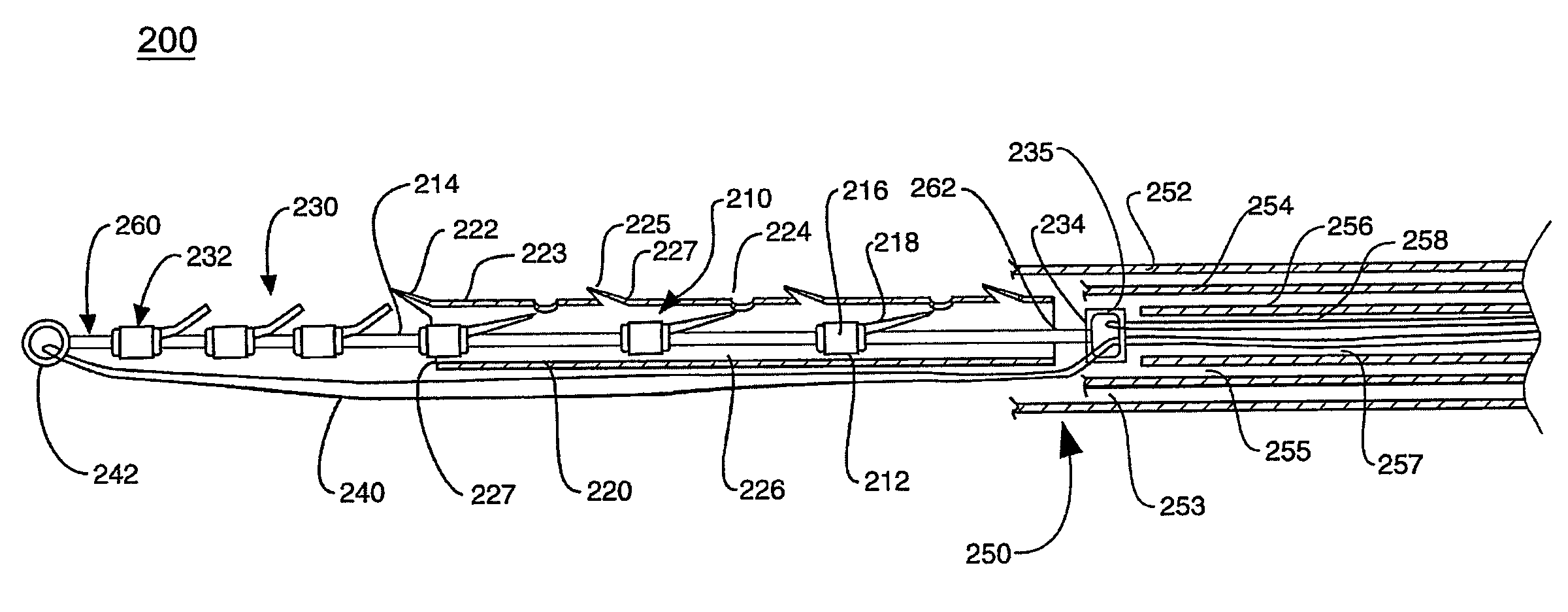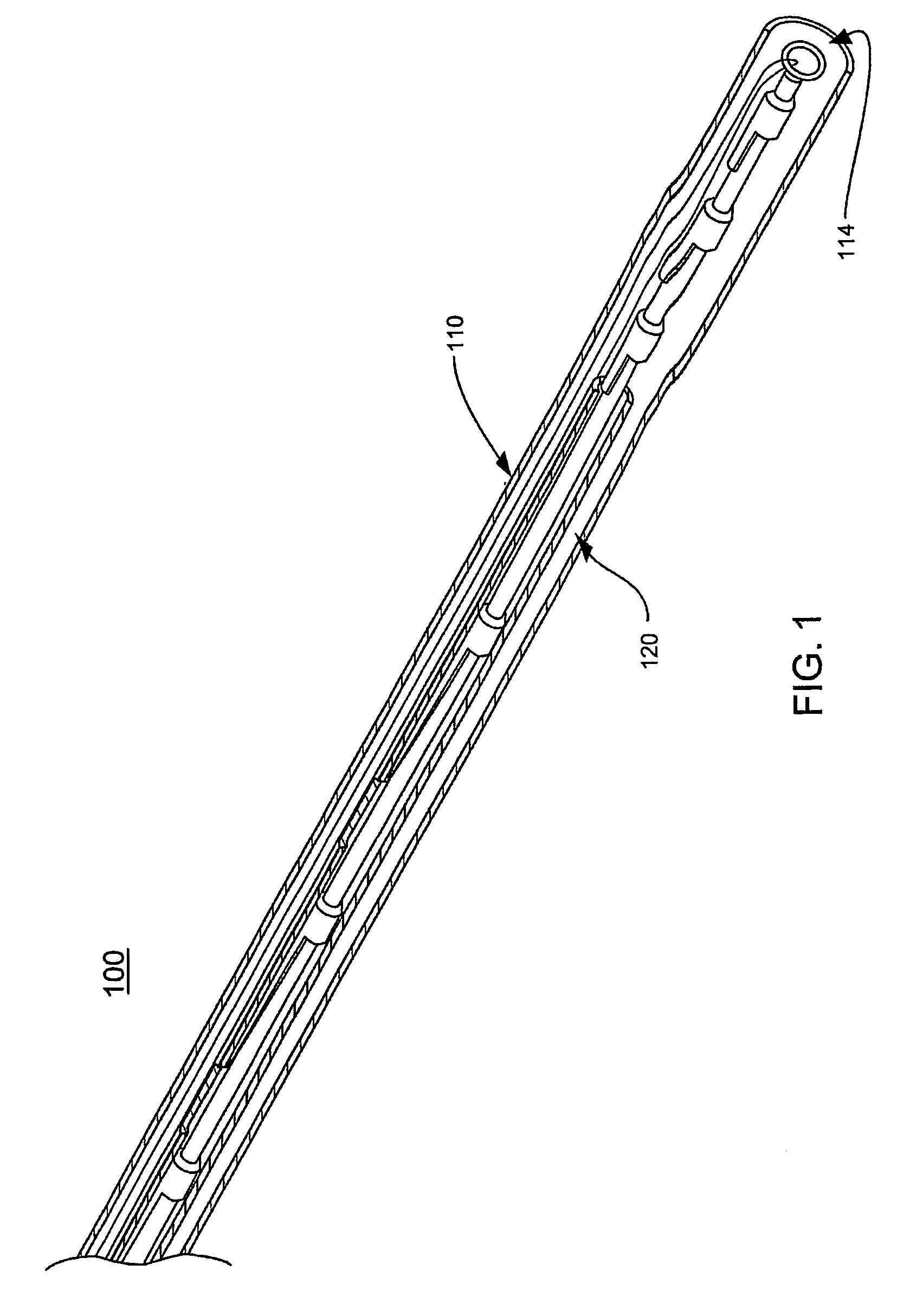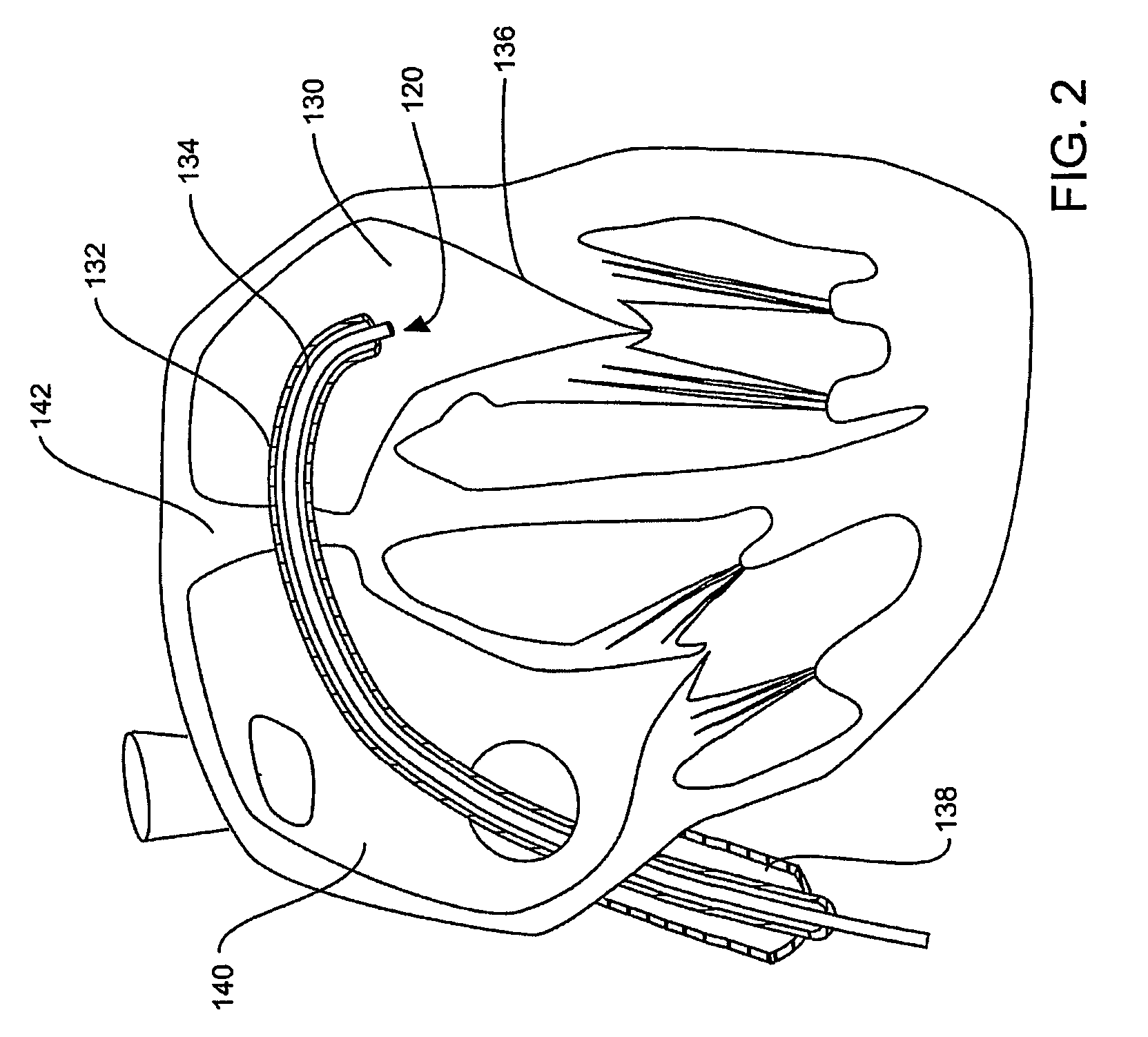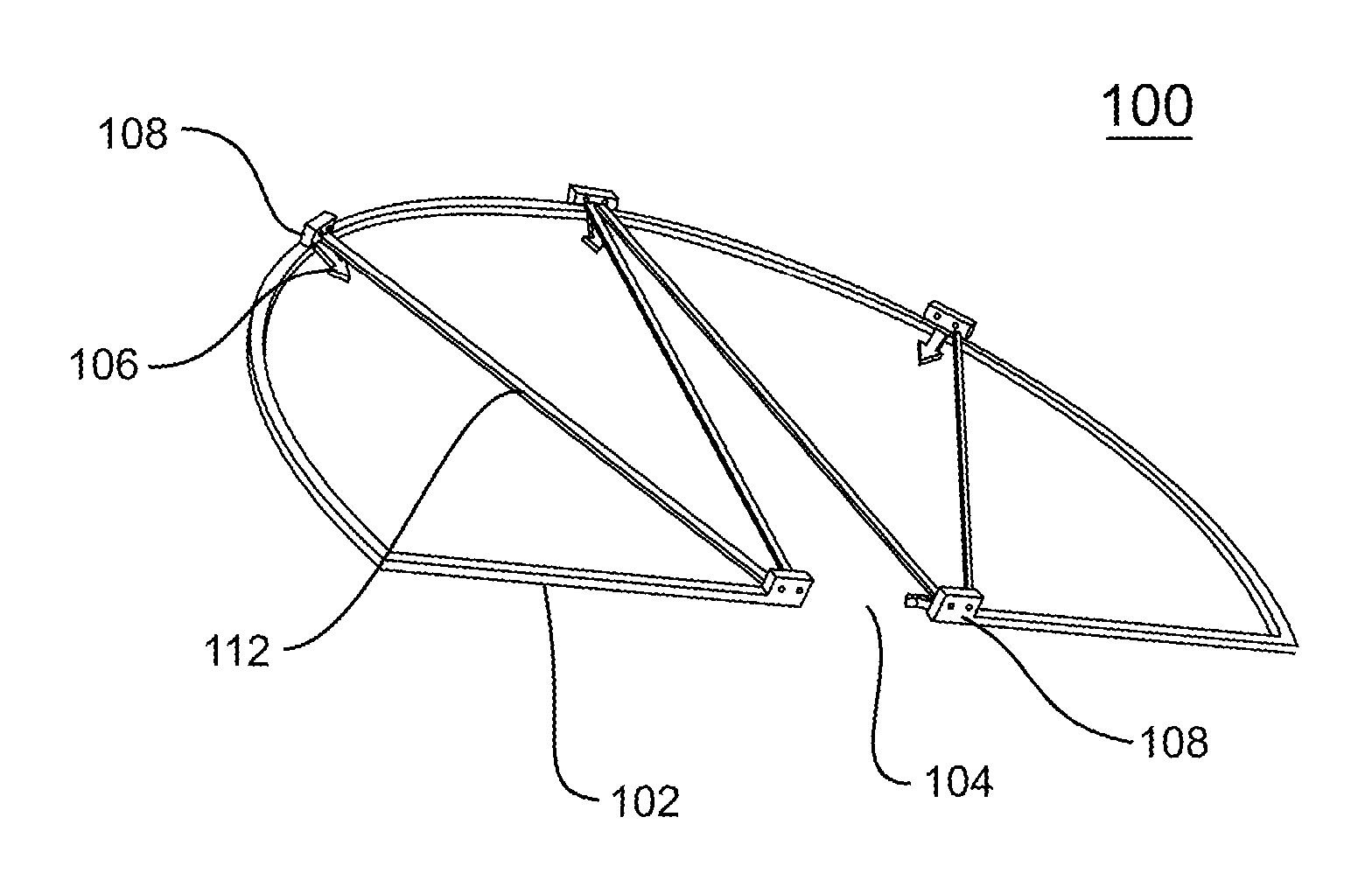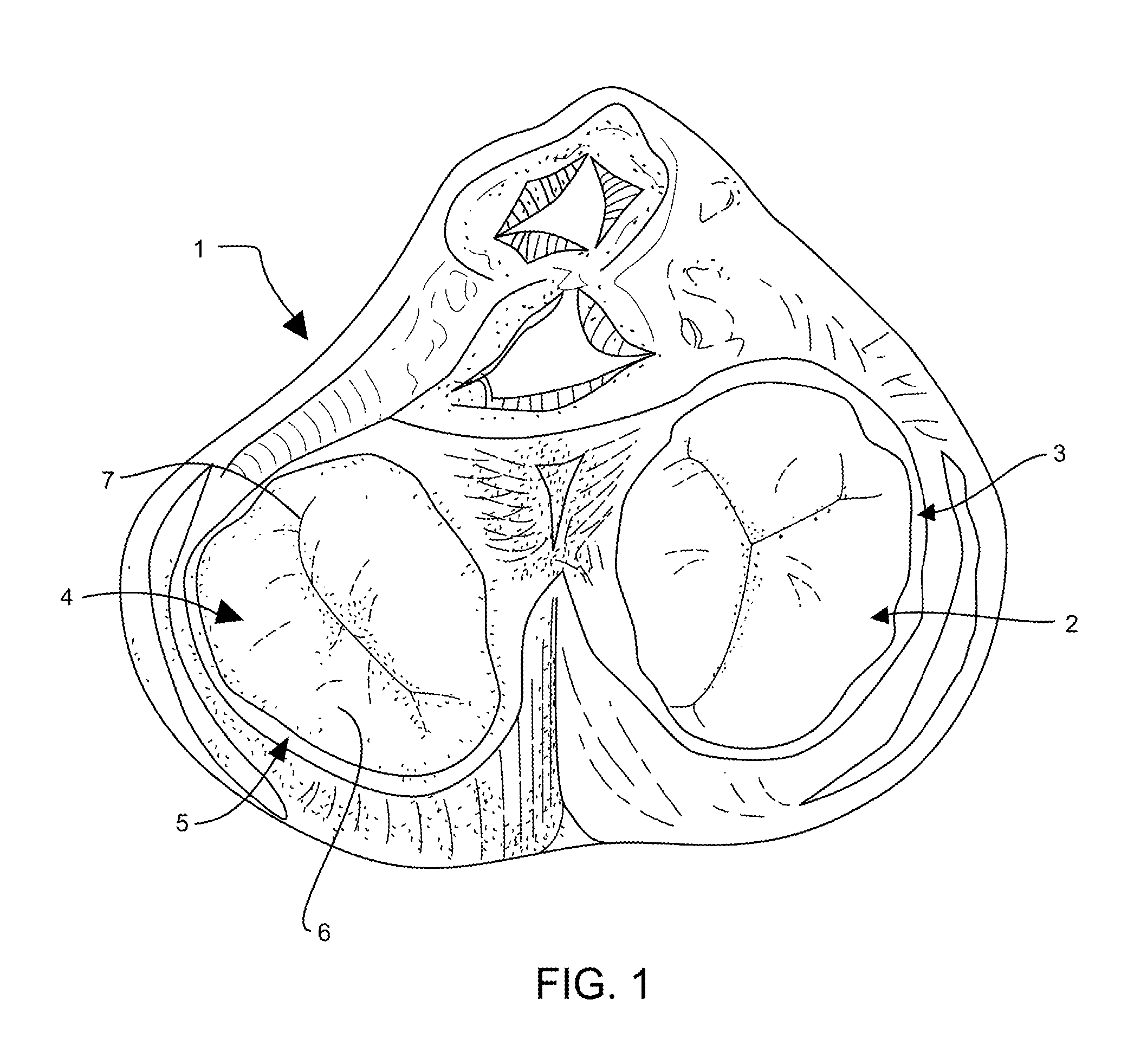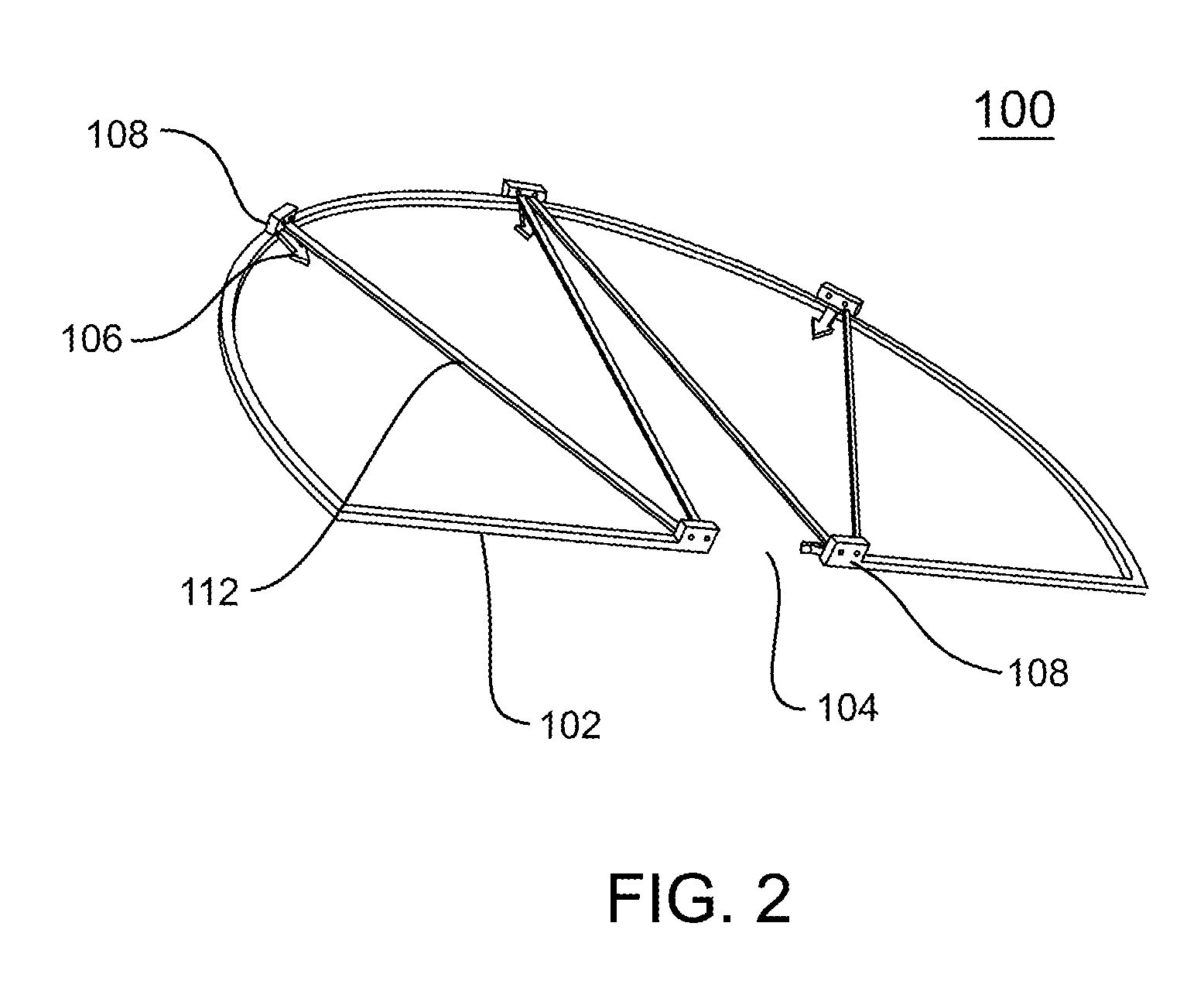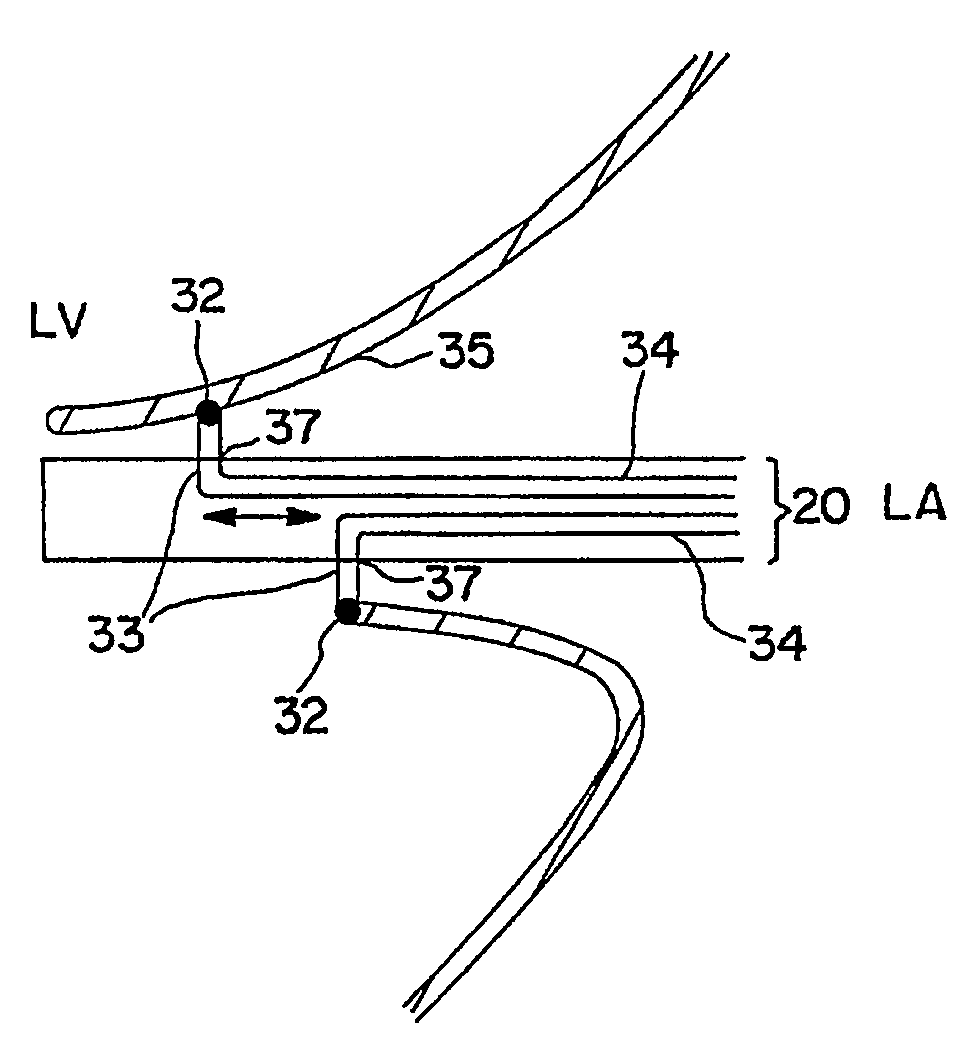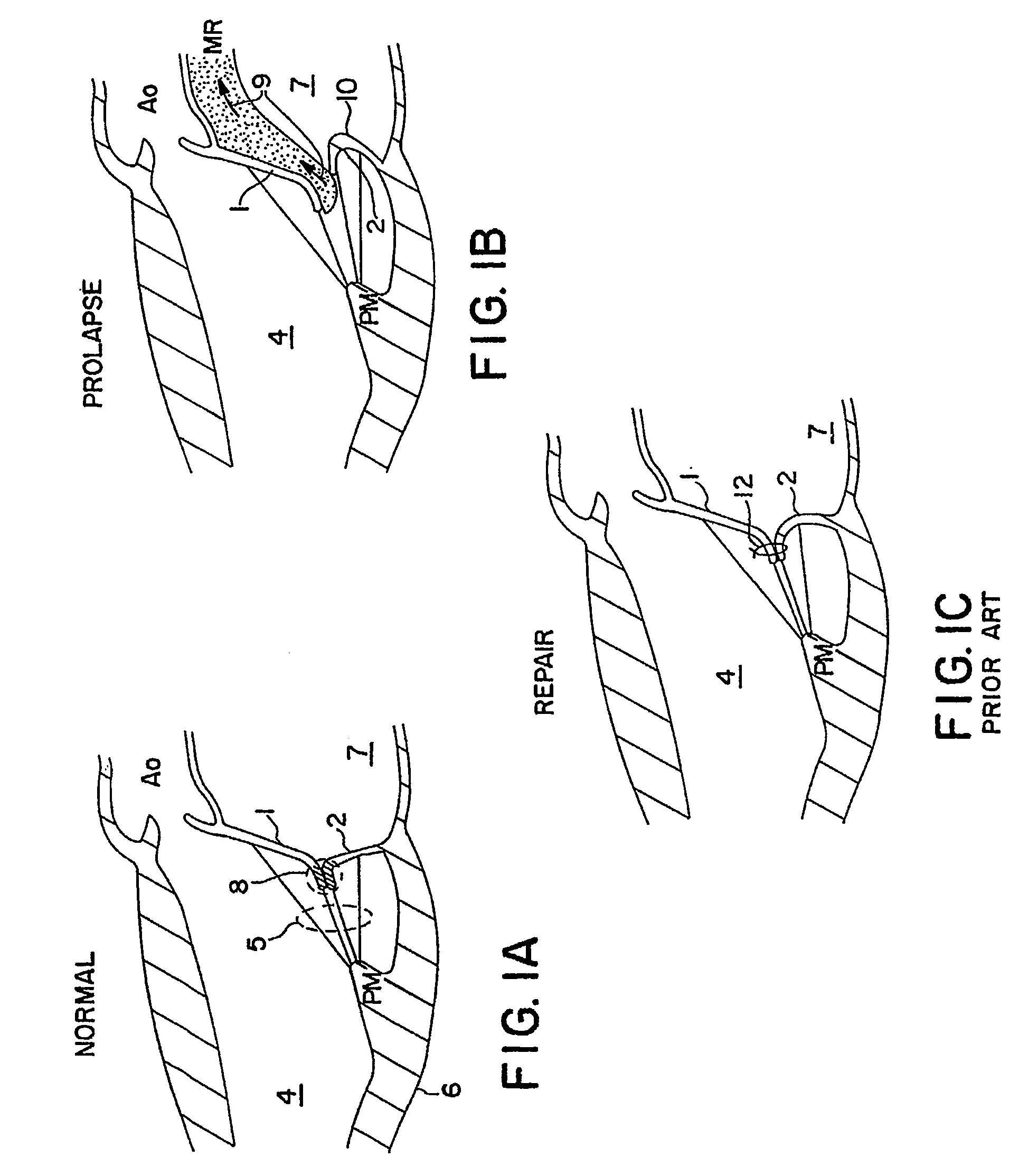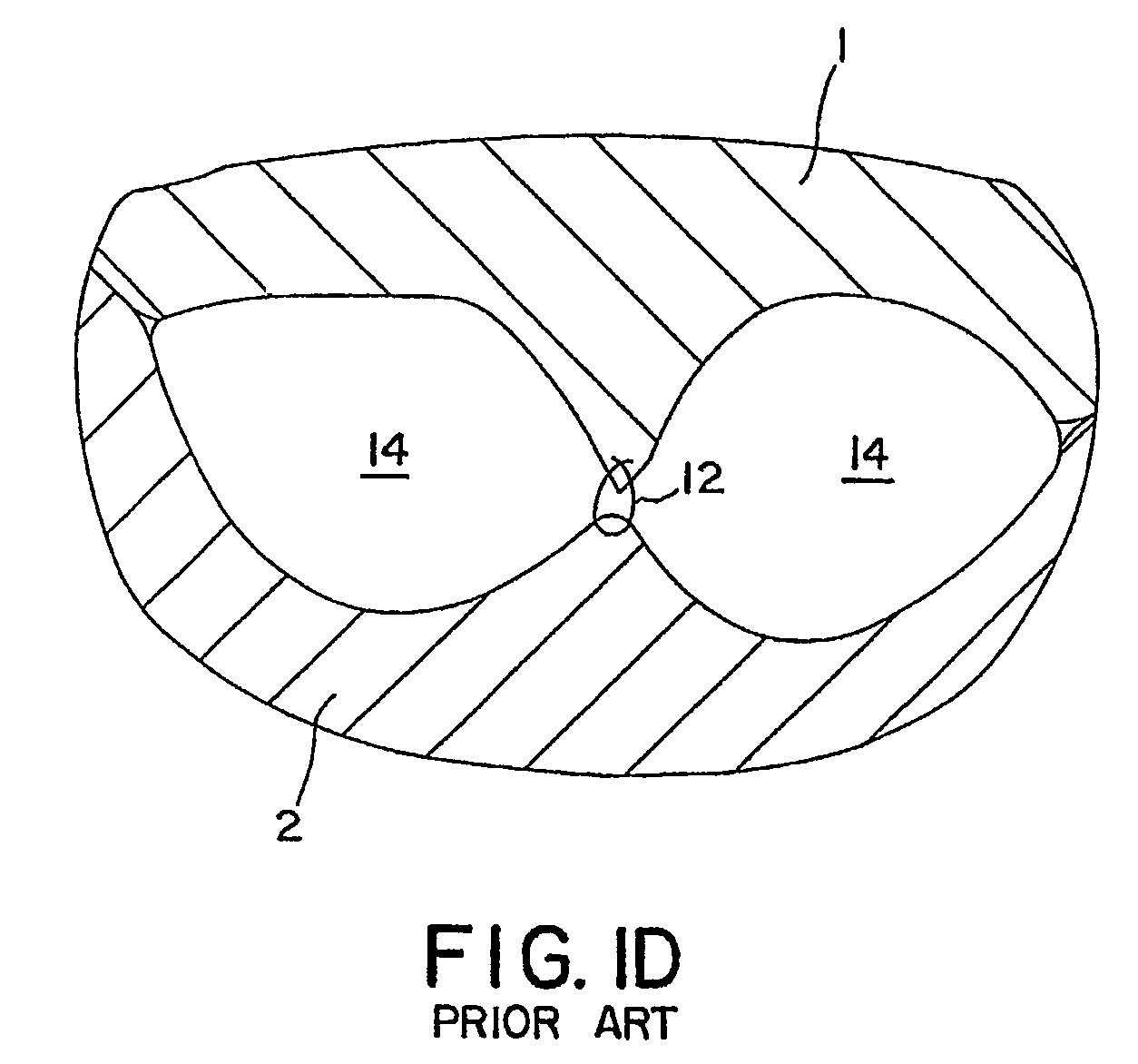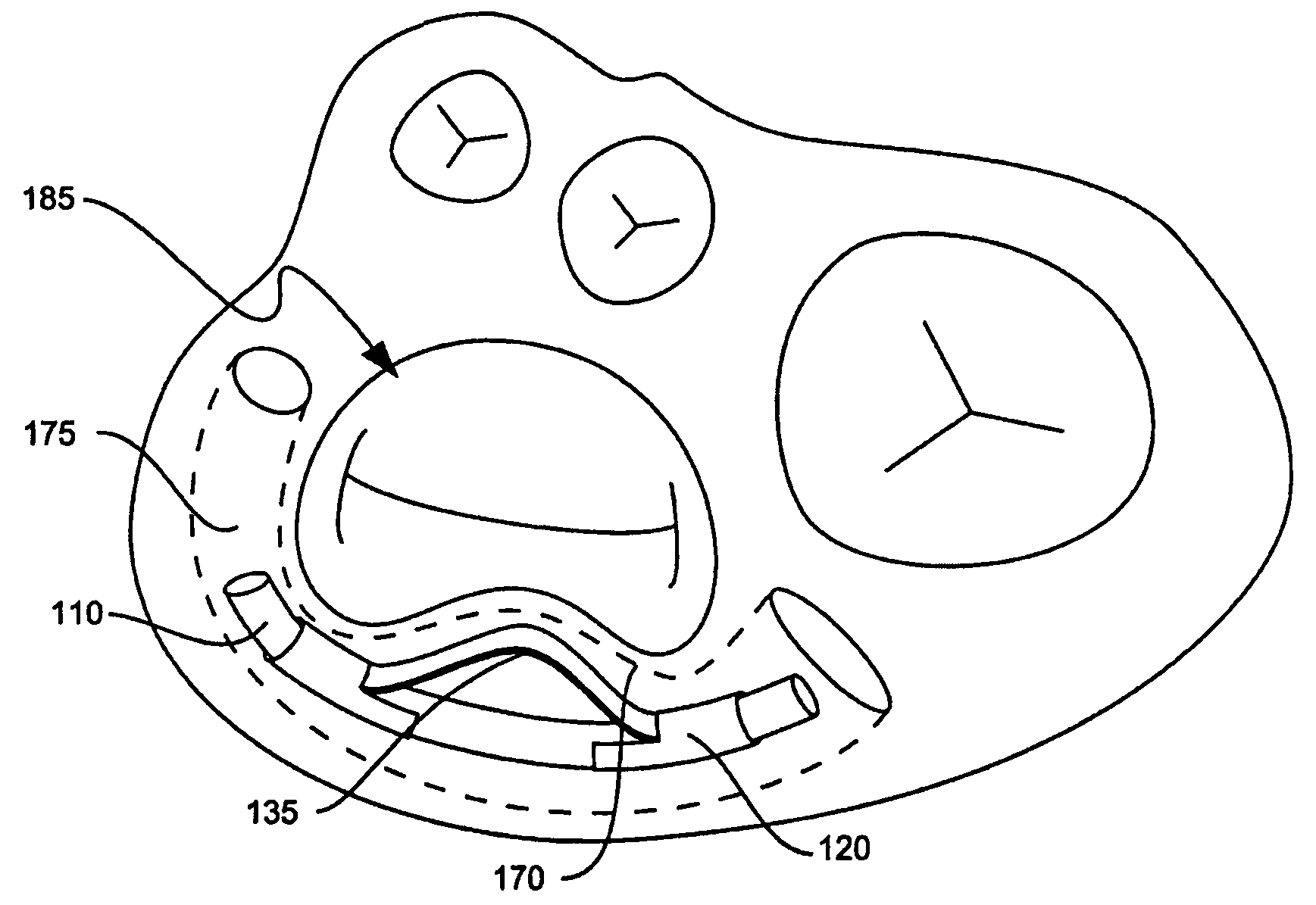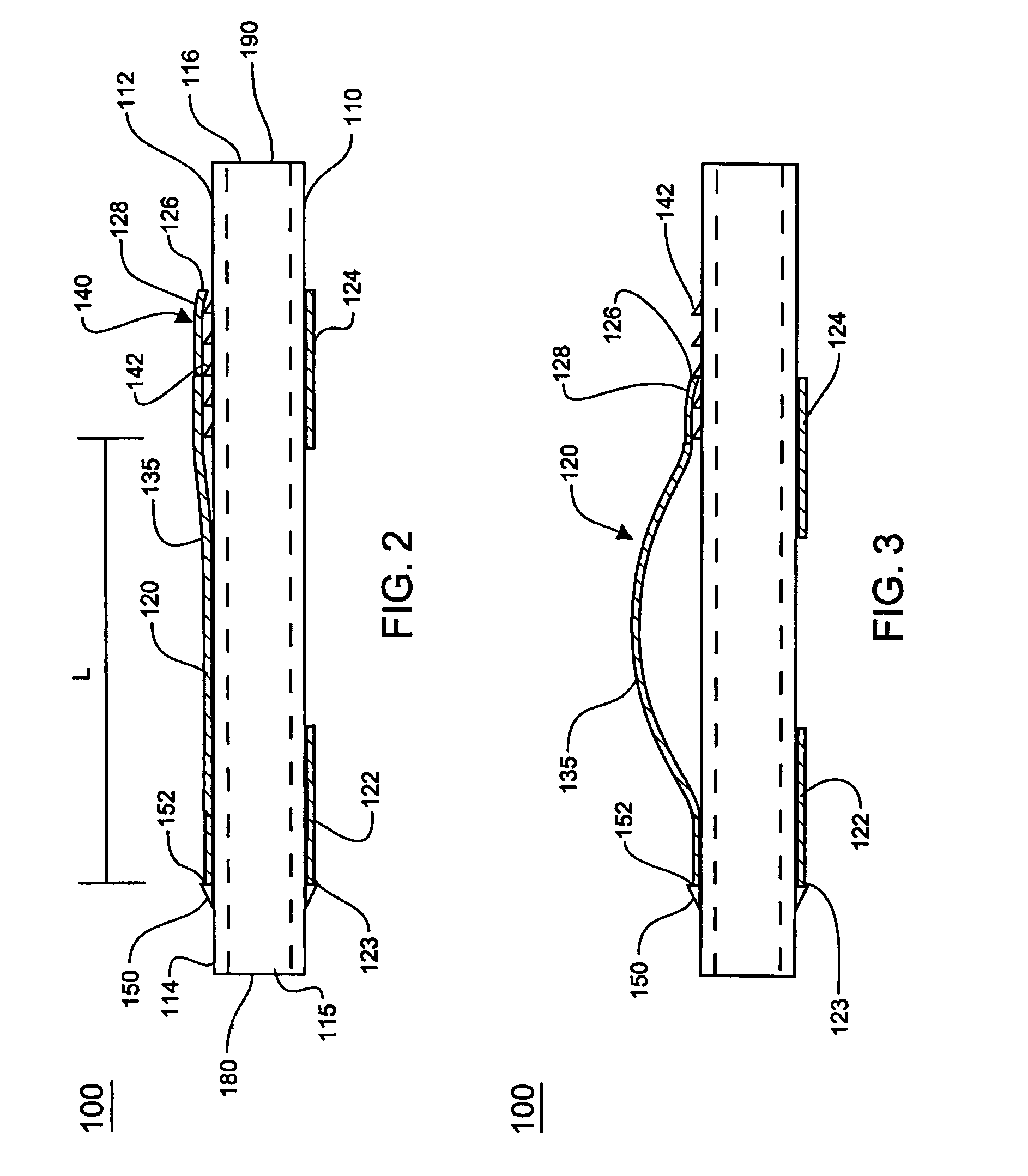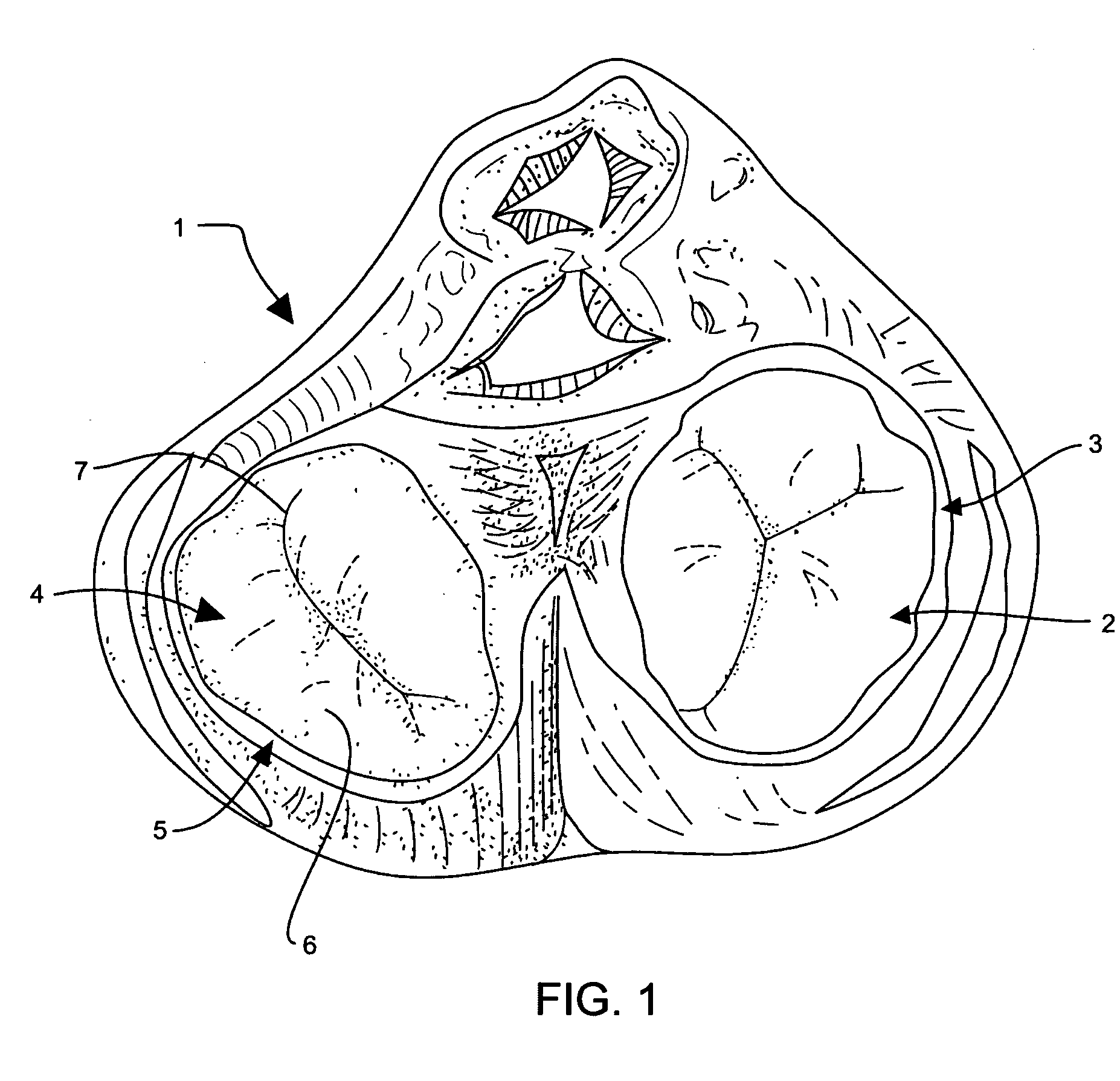Patents
Literature
Hiro is an intelligent assistant for R&D personnel, combined with Patent DNA, to facilitate innovative research.
127 results about "Mitral valve regurgitation" patented technology
Efficacy Topic
Property
Owner
Technical Advancement
Application Domain
Technology Topic
Technology Field Word
Patent Country/Region
Patent Type
Patent Status
Application Year
Inventor
A condition in which the mitral valve does not close completely causing blood to leak back to the left atrium when left ventricle contracts.
Cardiac valve annulus restraining device
InactiveUS20070027533A1Reduce refluxBalloon catheterAnnuloplasty ringsPosterior leafletVentricular contraction
A catheter based system for treating mitral valve regurgitation includes a restraining device having a flexible member, a plurality of movable anchor members attached to the outer surface of the flexible member, and an adjustment filament attached to the ends of the flexible member. One embodiment of the invention includes a method for attaching a flexible restraining device to the annulus of a mitral valve, and adjusting the length of the adjustment filament attached to the flexible member of the restraining device, thereby reshaping the mitral valve annulus so that the anterior and posterior leaflets of the mitral valve close during ventricular contraction.
Owner:MEDTRONIC VASCULAR INC
Tensioning device, system, and method for treating mitral valve regurgitation
A system for treating mitral valve regurgitation comprises a tensioning device slidably received within a delivery catheter. The tensioning device includes a tether linking proximal an anchoring member and a distal anchoring member. At least one of the anchoring members includes an elastic portion that flexes in response to a heartbeat when the tensioning device is positioned across a chamber of a heart. The tether includes at least one locking member initially positioned between the anchoring members. A method for treating mitral valve regurgitation comprises piercing a first wall of a chamber of a heart, engaging a distal anchoring member with a second wall of the heart chamber, engaging a proximal anchoring member with the first wall, and pulling a locking member affixed to a tether linking the anchoring members from an initial position between the two anchoring members to a locked position proximal the proximal anchoring member.
Owner:MEDTRONIC VASCULAR INC
Cardiac valve annulus reduction system
A catheter-based, annulus reduction device and system for cardiac valve repair and method of using the same. The system is usable for treating mitral valve regurgitation and comprises a catheter, a reduction ring carried within the catheter, the reduction ring including a plurality of exit ports formed in a side wall of the reduction ring and filament received in the reduction ring. The filament includes a plurality of radially extendible barbs corresponding to the sidewall openings. The reduction ring carrying the filament is deployed adjacent a mitral valve annulus and the filament is translated relative to the reduction ring to deploy the barbs through the exit ports and into the annulus and to further translate the reduction ring with deployed barbs to reshape the annulus.
Owner:MEDTRONIC VASCULAR INC
Device for treating mitral valve regurgitation
InactiveUS20070066863A1Reduce lateral distanceReduce fatigueSuture equipmentsHeart valvesHeart chamberTonicity
A system for treating mitral valve regurgitation comprises tensioning device that can be deployed using a delivery catheter. The device includes tension member linking a proximal anchor and distal anchor. The device is constructed from a material having suitable elastic properties such that the device applies a constant tension force between the anchors, while stretching or flexing in response to a heartbeat when positioned across a chamber of a heart. The anchors may include a plurality of arms. In some embodiments, the arms may also flex in response to a heart beat. When positioned across the left ventricle of a heart, the device can reduce the lateral distance between the walls of the ventricle and thus allow better coaption of the mitral valve leaflets thereby reducing mitral regurgitation.
Owner:MEDTRONIC VASCULAR INC
Device and Method for Mitral Valve Regurgitation Treatment
ActiveUS20150196390A1Effective protectionAdjustable positionHeart valvesBioprosthetic mitral valve replacementMitral valve leaflet
A mitral valve replacement device is adapted to be deployed at a mitral valve position in a human heart. The device has an atrial flange defining an atrial end of the device, a valve body defining a ventricular end of the device, and an annulus support that connects the atrial flange and the valve body, the annulus support including a ring of tabs extending radially therefrom and adapted to engage the native mitral annulus and / or the native leaflet(s) of the human heart. The atrial flange can be seated in the atrium above the native mitral valve annulus in a human heart, and the ring of tabs can engage the native mitral annulus in a manner where the atrial flange and tabs provide a clipping effect to secure the mitral valve replacement device at the native mitral valve position
Owner:SINOMED CARDIOVITA TECH INC
Device, system, and method for transcatheter treatment of valve regurgitation
ActiveUS20130023985A1Mal-coaptation is mitigatedKeep distanceSuture equipmentsHeart valvesCatheterTranscatheter therapy
The invention relates to a device for use in the transcatheter treatment of mitral valve regurgitation, specifically a coaptation enhancement element for implantation across the valve; a system including the coaptation enhancement element and anchors for implantation; a system including the coaptation enhancement element, catheter and driver; and a method for transcatheter implantation of a coaptation element across a heart valve.
Owner:POLARES MEDICAL INC
Coaptation enhancement implant, system, and method
ActiveUS8845717B2Safe and effective and operation of valveImprove sealingSuture equipmentsHeart valvesBody shapeCatheter
Implants, implant systems, and methods for treatment of mitral valve regurgitation and other valve diseases generally include a coaptation assist body which remains within the blood flow path as the leaflets of the valve move, the valve bodies often being relatively thin, elongate (along the blood flow path), and / or conformable structures which extend laterally from commissure to commissure, allowing the native leaflets to engage and seal against the large, opposed surfaces on either side of the valve body during the heart cycle phase when the ventricle contracts to empty that chamber of blood, and allows blood to pass around the valve body so that blood flows from the atrium to the ventricle during the filling phase of the heart cycle. Separate deployment of independent anchors near each of the commissures may facilitate positioning and support of an exemplary triangular valve body, with a third anchor being deployed in the ventricle. An outer surface of the valve body may accommodate tissue ingrowth or endothelialization, while a fluid-absorbing matrix can swell after introduction into the heart. The valve body shape may be selected after an anchor has been deployed, and catheter-based deployment systems may have a desirable low profile.
Owner:POLARES MEDICAL INC
Cardiac valve annulus restraining device
A catheter based system for treating mitral valve regurgitation includes a reshaping device having a body and a plurality of movable anchoring barbs attached to the body of the device. The reshaping device can be made from a biocompatible material having suitable shape memory properties. The devices of the current invention can be self expandable, balloon expandable, or a combination self expandable and balloon expandable. One embodiment of the invention includes a method for attaching a reshaping device to the annulus of a mitral valve, moving the body of the device from a fully expanded configuration to a resting configuration, and thereby reshaping the mitral valve annulus.
Owner:MEDTRONIC VASCULAR INC
Device, system, and method for transcatheter treatment of valve regurgitation
The invention relates to a device for use in the transcatheter treatment of mitral valve regurgitation, specifically a coaptation enhancement element for implantation across the valve; a system including the coaptation enhancement element and anchors for implantation; a system including the coaptation enhancement element, catheter and driver; and a method for transcatheter implantation of a coaptation element across a heart valve.
Owner:POLARES MEDICAL INC
Coronary sinus approach for repair of mitral valve regurgitation
A device, system and method for treating cardiac valve regurgitation. The device includes a compression member disposed on a tube and a sleeve rotatably disposed about the tube and the compression member. The sleeve includes a side port, and is rotatable to align the compression member with the side port to transform the compression member from a delivery configuration to a compression configuration. One method includes positioning the compression member adjacent a cardiac valve and rotating the sleeve to align the compression member with the side port to release the compression member from the delivery configuration to the compression configuration to apply a compressive force to the cardiac valve.
Owner:MEDTRONIC VASCULAR INC
Prevention of myocardial infarction induced ventricular expansion and remodeling
ActiveUS20050080402A1Prevent further deteriorationInhibit swellingSuture equipmentsPowder deliveryCardiac muscleTherapeutic treatment
A method for direct therapeutic treatment of myocardial tissue in a localized region of a heart having a pathological condition. The method includes identifying a target region of the myocardium and applying material directly and substantially only to at least a portion of the myocardial tissue of the target region. The material applied results in a physically modification the mechanical properties, including stiffness, of said tissue. Various devices and modes of practicing the method are disclosed for stiffening, restraining and constraining myocardial tissue for the treatment of conditions including myocardial infarction or mitral valve regurgitation.
Owner:MYOMEND
Device and method for reshaping mitral valve annulus
InactiveUS20070061010A1Improve bindingReduce distanceStentsAnnuloplasty ringsAnterior leafletPosterior leaflet
Owner:EDWARDS LIFESCIENCES CORP
Retainer device for mitral valve leaflets
Owner:MEDTRONIC VASCULAR INC
Mitral valve ring for treatment of mitral valve regurgitation
An active bodily ring having a housing adapted to be sutured to a bodily component and a loop disposed in the housing, the loop capable of actively expanding and compressing during the bodily components normal function. The housing defines a first chamber and a second chamber, the first chamber containing the loop and the second chamber providing a region capable of being sutured to the bodily component. In one embodiment, the housing can be a crimped-fabric housing. In another embodiment, the housing can be a woven-fabric housing having elastic properties. The housing can be made from polyester.
Owner:ALAMEDDINE ABDALLAH K
Coronary sinus approach for repair of mitral valve regurgitation
A device and method for treating cardiac valve regurgitation. The device includes a tubular member including a lumen there through and a locking mechanism and a compression device carried on the tubular member. The compression device is transformable to a compression configuration in response to axial displacement and is locked in the compression configuration by the locking mechanism. The method includes positioning the compression device adjacent a cardiac valve and applying an axial displacement to the compression device to transform the compression device into a compression configuration and locking the compression device in the compression configuration to apply a compressive force to the cardiac valve.
Owner:MEDTRONIC VASCULAR INC
Methods and devices for capturing and fixing leaflets in valve repair
InactiveUS20040225300A1Sturdy and effective fixationReduce refluxSuture equipmentsSurgical furnitureVALVE PORTValve leaflet
The present invention provides methods and devices for grasping, and optional repositioning and fixation of the valve leaflets to treat cardiac valve regurgitation, particularly mitral valve regurgitation. Such grasping will typically be atraumatic providing a number of benefits. For example, atraumatic grasping may allow repositioning of the devices relative to the leaflets and repositioning of the leaflets themselves without damage to the leaflets. However, in some cases it may be necessary or desired to include grasping which pierces or otherwise permanently affects the leaflets. In some of these cases, the grasping step includes fixation.
Owner:EVALVE
Mitral Valve Coaptation Plate For Mitral Valve Regurgitation
InactiveUS20100262233A1Not effectiveBone implantAnnuloplasty ringsMitral valve leafletMitral valve operation
A method and apparatus directed to the repair of regurgitant mitral valves. Mitral valve regurgitation occurs due to miscoaptation of mitral valve leaflets. The mitral valve repair apparatus of the present invention is comprised of a tongue plate which is supported by a suture ring. The apparatus is inserted into the mitral valve orifice with the suture ring sutured to the mitral valve annulus placing the tongue plate between the two mitral valve leaflets. When the mitral valve opens, blood flows through the orifices of the apparatus. When the mitral valve closes, the two miscoaptated mitral valve leaflets cover the orifices on the apparatus and the tongue plate blocks the hole formed by leaflets and seals the leaky flow.
Owner:TEXAS TECH UNIV SYST
Mitral valve implants for the treatment of valvular regurgitation
The invention relates in some aspects to a device for use in the transcatheter treatment of mitral valve regurgitation, including steerable guidewires, implantable coaptation assistance devices, anchoring systems for attaching a ventricular projection of an implantable coaptation device, a kit, and methods of using an implantable coaptation assistance device among other methods.
Owner:POLARES MEDICAL INC
Devices and methods for treating mitral valve regurgitation
A medical device, method and system of treating the lumenal system of a patient are provided. The medical device includes a tissue plicator adapted and configured to form a plication of tissue proximate a target region of a patient. The medical device further includes a retainer applicator operatively associated with the tissue plicator. The retainer applicator is adapted and configured to apply a retainer to the plication to maintain the plication after the medical device is removed from the patient. In accordance with a further aspect, the tissue plicator may plicate tissue by mechanically clamping the tissue and / or may plicate the tissue at least in part by applying suction thereto. The system can be used to plicate tissue proximate the mitral valve of a patient. The plication can be formed temporarily or permanently.
Owner:ROGERS CAMPBELL +1
Coaptation enhancement implant, system, and method
ActiveUS20120197388A1Mal-coaptation is mitigatedImprove valve functionSuture equipmentsBone implantBody shapeAbdominal cavity
Implants, implant systems, and methods for treatment of mitral valve regurgitation and other valve diseases generally include a coaptation assist body which remains within the blood flow path as the leaflets of the valve move, the valve bodies often being relatively thin, elongate (along the blood flow path), and / or conformable structures which extend laterally from commissure to commissure, allowing the native leaflets to engage and seal against the large, opposed surfaces on either side of the valve body during the heart cycle phase when the ventricle contracts to empty that chamber of blood, and allows blood to pass around the valve body so that blood flows from the atrium to the ventricle during the filling phase of the heart cycle. Separate deployment of independent anchors near each of the commissures may facilitate positioning and support of an exemplary triangular valve body, with a third anchor being deployed in the ventricle. An outer surface of the valve body may accommodate tissue ingrowth or endothelialization, while a fluid-absorbing matrix can swell after introduction into the heart. The valve body shape may be selected after an anchor has been deployed, and catheter-based deployment systems may have a desirable low profile.
Owner:POLARES MEDICAL INC
Mitral valve treatment techniques
ActiveUS8608797B2Enhance fibrosisReduce distanceBone implantAnnuloplasty ringsCouplingMitral valve leaflet
Apparatus (20) is provided for treating mitral valve regurgitation, including a band (30) having distal and proximal ends, the band (30) adapted to be placed: around between 90 and 270 degrees of a mitral valve (58), including around at least a portion of a posterior cusp (56) of the valve (58), in a space defined by (a) a ventricular wall (70), (b) a ventricular surface of the posterior cusp (56) in a vicinity of an annulus (60) of the mitral valve (58), and (c) a plurality of third-order chordae tendineae (74). The apparatus (20) further includes distal and proximal coupling elements (32, 34), coupled to the band (30) at the distal and proximal ends thereof, respectively, and adapted to be coupled to a first chorda tendinea and a second chorda tendinea, respectively, each of the first and second chordae tendineae selected from the group consisting of: one of the plurality of third-order chordae tendineae (74), and a first-order chorda tendinea that inserts on a commissural cusp (78) of the mitral valve (58). Additional embodiments are also described.
Owner:VALTECH CARDIO LTD
Device for Treating Mitral Valve Regurgitation
InactiveUS20070078297A1Reduce lateral distanceEasy to deploySuture equipmentsHeart valvesHeart chamberTension member
Owner:MEDTRONIC VASCULAR INC
Device and Method for ReShaping Mitral Valve Annulus
ActiveUS20090076586A1Reduce regurgitationImprove bindingStentsDiagnosticsPosterior leafletLeft ventricular size
Devices and methods for reshaping a mitral valve annulus are provided. One preferred device is configured for deployment in the right atrium and is shaped to apply a force along the atrial septum. The device causes the atrial septum to deform and push the anterior leaflet of the mitral valve in a posterior direction for reducing mitral valve regurgitation. Another preferred device is deployed in the left ventricular outflow tract at a location adjacent the aortic valve. The device is expandable for urging the anterior leaflet toward the posterior leaflet. Another preferred device comprises a tether configured to be attached to opposing regions of the mitral valve annulus.
Owner:EDWARDS LIFESCIENCES CORP
Systems and methods for transcatheter treatment of valve regurgitation
ActiveUS20150119981A1Simple methodSufficient compressive forceSuture equipmentsBone implantVALVE PORTCatheter device
The invention relates to a device for use in the transcatheter treatment of mitral valve regurgitation, specifically a coaptation assistance devices for implantation across the valve; a system including the coaptation enhancement element and anchors for implantation; a system including the coaptation enhancement element, and one or more of the following: transseptal sheath, anchor delivery catheter, implant delivery catheter, and clip delivery catheter; and methods for transcatheter implantation of a coaptation element across a heart valve.
Owner:POLARES MEDICAL INC
Mitral valve treatment techniques
ActiveUS20090149872A1Enhance fibrosisReduce distanceAnnuloplasty ringsNon-surgical orthopedic devicesCouplingMitral valve leaflet
Apparatus (20) is provided for treating mitral valve regurgitation, including a band (30) having distal and proximal ends, the band (30) adapted to be placed: around between 90 and 270 degrees of a mitral valve (58), including around at least a portion of a posterior cusp (56) of the valve (58), in a space defined by (a) a ventricular wall (70), (b) a ventricular surface of the posterior cusp (56) in a vicinity of an annulus (60) of the mitral valve (58), and (c) a plurality of third-order chordae tendineae (74). The apparatus (20) further includes distal and proximal coupling elements (32, 34), coupled to the band (30) at the distal and proximal ends thereof, respectively, and adapted to be coupled to a first chorda tendinea and a second chorda tendinea, respectively, each of the first and second chordae tendineae selected from the group consisting of: one of the plurality of third-order chordae tendineae (74), and a first-order chorda tendinea that inserts on a commissural cusp (78) of the mitral valve (58). Additional embodiments are also described.
Owner:VALTECH CARDIO LTD
Cardiac valve annulus reduction system
A catheter-based, annulus reduction device and system for cardiac valve repair and method of using the same. The system is usable for treating mitral valve regurgitation and comprises a catheter, a reduction ring carried within the catheter, the reduction ring including a plurality of exit ports formed in a side wall of the reduction ring and filament received in the reduction ring. The filament includes a plurality of radially extendible barbs corresponding to the sidewall openings. The reduction ring carrying the filament is deployed adjacent a mitral valve annulus and the filament is translated relative to the reduction ring to deploy the barbs through the exit ports and into the annulus and to further translate the reduction ring with deployed barbs to reshape the annulus.
Owner:MEDTRONIC VASCULAR INC
Annuloplasty Device Having Shape-Adjusting Tension Filaments
InactiveUS20100152845A1Reduce refluxAnnuloplasty ringsTubular organ implantsPosterior leafletVentricular contraction
A system for treating mitral valve regurgitation includes a tensioning device having a flexible annuloplasty ring, a plurality of anchoring members and a tensioning filament attached to the flexible ring. One embodiment of the invention includes a method for attaching a flexible annuloplasty ring to the annulus of a mitral valve, and adjusting the lengths of segments of the tension filament attached to the flexible ring in order to exert force vectors on the annulus, thereby reshaping the mitral valve annulus so that the anterior and posterior leaflets of the mitral valve close completely during ventricular contraction.
Owner:MEDTRONIC VASCULAR INC
Cardiac devices and methods for percutaneous repair of atrioventricular valves
ActiveUS7559936B2Increase surface areaEffective applicationStaplesSurgical pincettesMitral valve leafletCardiac device
Novel apparatus and minimally invasive methods to treat The present invention provides methods and devices for grasping, stabilizing and fastening of cardiac valve leaflets to treat atrioventricular valve regurgitation, particularly mitral valve regurgitation, in the context of prolapse and / or flail mitral valve. Independent leaflet grasping elements provide the ability to reposition the leaflets for fastening and enough stability to prevent leaflet movement during fastening.
Owner:THE GENERAL HOSPITAL CORP
Coronary sinus approach for repair of mitral valve regurgitation
A device and method for treating cardiac valve regurgitation. The device includes a tubular member including a lumen there through and a locking mechanism and a compression device carried on the tubular member. The compression device is transformable to a compression configuration in response to axial displacement and is locked in the compression configuration by the locking mechanism. The method includes positioning the compression device adjacent a cardiac valve and applying an axial displacement to the compression device to transform the compression device into a compression configuration and locking the compression device in the compression configuration to apply a compressive force to the cardiac valve.
Owner:MEDTRONIC VASCULAR INC
Annuloplasty device having shape-adjusting tension filaments
A system for treating mitral valve regurgitation includes a tensioning device having a flexible annuloplasty ring, a plurality of anchoring members and a tensioning filament attached to the flexible ring. One embodiment of the invention includes a method for attaching a flexible annuloplasty ring to the annulus of a mitral valve, and adjusting the lengths of segments of the tension filament attached to the flexible ring in order to exert force vectors on the annulus, thereby reshaping the mitral valve annulus so that the anterior and posterior leaflets of the mitral valve close completely during ventricular contraction.
Owner:MEDTRONIC VASCULAR INC
Features
- R&D
- Intellectual Property
- Life Sciences
- Materials
- Tech Scout
Why Patsnap Eureka
- Unparalleled Data Quality
- Higher Quality Content
- 60% Fewer Hallucinations
Social media
Patsnap Eureka Blog
Learn More Browse by: Latest US Patents, China's latest patents, Technical Efficacy Thesaurus, Application Domain, Technology Topic, Popular Technical Reports.
© 2025 PatSnap. All rights reserved.Legal|Privacy policy|Modern Slavery Act Transparency Statement|Sitemap|About US| Contact US: help@patsnap.com
